CFA San Francisco
Chapter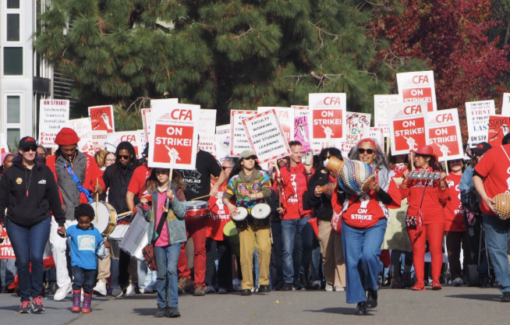
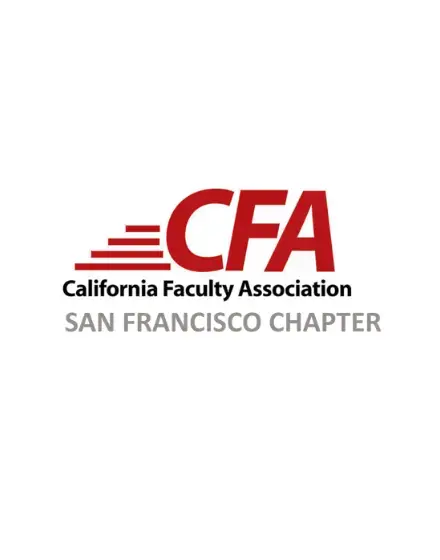
Get in Touch
Chapter Information
Field Representative: Mario Fernandez
Click here for Executive Board
San Francisco State Website
Address
1600 Holloway Ave
HSS 331
San Francisco, CA 94132
(415) 338-6232 Phone
cfa_sf@calfac.org Email
Stay In The Know with CFA SF Social Media
Become A CFA Member
Join thousands of tenure-track faculty, lecturers, counselors, librarians, and coaches to protect academic freedom, faculty rights, safe workplaces, student learning, fair pay, and fight for racial and social justice.
Executive Board
Meet your CFA San Francisco Chapter Executive Board members and get in touch with them for more information.
Brad Erickson
President

Jaimy Magdalena Mann
Lecturer Faculty Vice president
James Martel
Tenured/Tenure-Track faculty Vice President

Robert Allen
at-large lecturer faculty representative
Anthony Pahnke
political action chair
Constance Gordon
College of liberal and creative arts representative
Charli Sakari
College of science and engineering representative
Ann Robertson
Lecturer faculty Retiree Representative

Marie Drennan
tenured/tenure-track faculty retiree representative
Abdur Sikder
secretary
Omar Zahzah
At-Large Tenured/Tenure-Track Faculty Representative
Karla Castillo
counselor representative
Michael Villegas
College of ethnic Studies representative
Angela Fillingim
College of health and social sciences representative
Supriya Misra
College of health and social sciences representative
News and Resolutions
Below you will find the news, resolutions, and statements by CFA San Francisco Chapter Executive Board Members and faculty community.
Posted on May 28, 2024
View the full Chapter Resolution here.
Resolution to Abolish the Two-Tier Faculty Labor System
WHEREAS CFA’s commitment to anti-racist social justice compels us to oppose economic exploitation that intersectionally magnifies the harms of white supremacy, cisheteropatriarchy, and ableism; and
WHEREAS the decrease of state investment in the CSU and of tenure density correlates with the increase in lecturer faculty who are Black, Indigenous, Latinx, Asian, Pacific and Desi American, working class, and women, relegating many BIPOC, working class, and women faculty to a second tier; and
WHEREAS the liberatory potential of the demographic change in higher education has been stymied by the rise of the two-tier faculty labor system as contingent faculty teach more courses but do not typically receive compensation to stay active in their fields, continue learning, or have a voice in shared governance including curricular design; and
WHEREAS the structural racism of the state of California’s disinvestment in the CSU is enacted through three financial practices: 1) speculative resource hoarding by the Chancellor’s office, 2) tuition increases that transfer collective taxation to individual burdens for working class and BIPOC students, and 3) reliance on the normative exploitation and periodic purge of contingent faculty; and
WHEREAS tiered employment is rooted in anti-Blackness and opposition to tiered employment was born in Black struggle—during the US Civil War, Black soldiers refused to serve when offered lower pay than white soldiers forcing Congress to mandate equal pay for all troops; and
WHEREAS the two-tier faculty labor system is rooted in patriarchy as contingent faculty are and have always been disproportionately female while tenured faculty are and have always been disproportionately male; and
WHEREAS the two-tier faculty labor system of the CSU produces structured precarity for the majority of CSU faculty making these faculty the primary and least protected targets of the CSU’s budget cutting austerity campaigns; and
WHEREAS the two-tier faculty labor system of the CSU produces structured inequity, relegating the majority of CSU faculty to inferior compensation and workload relative to that of their ladder faculty co-workers; and
WHEREAS the two-tier faculty labor system of the CSU structurally excludes the majority of CSU faculty from a meaningful voice in the shared governance that shapes their working conditions because they normatively receive no compensation for institution service; and
WHEREAS the two-tier faculty labor system of the CSU deprives the majority of CSU faculty of the right of academic freedom, which is predicated on the protections of tenure; and
WHEREAS the negotiating power of the CFA is undermined by the two-tier system because HEERA provides no recourse to an Unfair Practice charge to prevent job cuts of contingent faculty during negotiations that may intimidate them from taking part in bargaining and concerted activities because contingent faculty have no contractual right to continued employment; and
WHEREAS reliance on contingent faculty has radically reduced tenure density increasing the burden of service labor of ladder faculty; and
WHEREAS it is a recognized fact of labor history that tiered employment creates division among workers that weakens collective power, leading unions—from the CIO in the 1930s to the United Auto Workers and the Teamsters in the 2020s— to fight against tiered employment; and
WHEREAS the CFA has taken a step to address the inequity of the compensation gap that has grown in the past twenty years by successfully negotiating to raise the salary floor of the lowest paid faculty; and
WHEREAS the CFA has taken a first step against structural exclusion by successfully bargaining for Article 20.38 which mandates 500 WTUs to compensate contingent faculty for institutional service; and
WHEREAS the aforementioned modest steps prefigure the collective will and power of the CFA to dismantle the two-tier faculty labor system piece-by-piece and ultimately abolish it so that all faculty are contractually assured security, equity and inclusion, therefore be it
RESOLVED that a central objective of every negotiation cycle between the CFA and the CSU shall be to win measurable improvements for contingent faculty towards parity with the security, compensation, and working conditions of tenure-track/tenured faculty, which may include but shall not be limited to bargaining proposals such as:
- Automatic range elevation after 5 years of Unit 3 employment with a satisfactory job evaluation regardless of time base/entitlement with a minimum 9% increase in parity with the minimum 9% increase for tenure promotion,
- Paths to permanency and advancement for faculty with or without terminal degrees including normative preferential access to or conversion to tenure-line openings for incumbent contingent faculty who choose to pursue them,
- Equitable compensation for service labor, especially to ensure proportional representation in shared governance for contingent faculty who choose to perform such labor,
- Eliminating compensation disparities with tenure-track/tenured faculty of comparable qualifications and experience,
- Eliminating contract provisions that increase the disparities of the two-tier system,
- Equitable compensation and support for research, scholarship and creative activities (RSCA) for contingent faculty who choose to perform such labor,
- Increased WTUs for contingent faculty to equitably serve in CFA leadership and organizing roles, increasing the percentage of dues returned to the chapter if necessary,
- Equitable access to professional development support,
- One person one vote in campus shared goveranance: end proportional voting that treats part-time contingent faculty as less than whole persons,
- The elimination of exclusions or discriminatory barriers for contingent faculty from campus awards, principal investigator status, tuition waivers, emeritx status and other benefits; and be it further
RESOLVED that CFA will center opposition to the two-tier system in all materials and communications parallel to the ways we center anti-racism both as a stand alone objective and as an expression of our anti-racist social justice values; and be it finally,
RESOLVED that CFA seeks the ultimate abolition of the two-tier faculty labor system so that all faculty are contractually assured security, equity and inclusion.
Endorsed by
CFA San Francisco State University Chapter, May 24, 2024
Posted on May 15, 2024
As CFA-SFSU calls for an immediate ceasefire in Gaza, and upholds the free speech rights of all persons on campus, including protesters, CFA-SFSU wishes to make clear that it opposes antisemitism in all of its forms. We find this particularly important and timely both because of present events, and because of the general rise of antisemitism in the United States in recent years, which has included the deadliest antisemitic attack in US history, and the increasing prominence of the antisemitic Great Replacement theory.
CFA-SFSU does not consider criticism of Israel or support for Palestine, including calls for a ceasefire or for divestment from Israel, to be inherently antisemitic. At universities across the United States, the blurring of the line between antisemitism and criticism of Israel is being used to justify actions taken against protesters. We stand against this practice.
In our view, antisemitism includes calling for violence against Jews, claiming that American Jews are more loyal to Israel than America, implying all Jews are responsible for the actions of Israel, claiming that a cabal of Jews control the United States government or media, and many other manifestations. Antisemitism includes singling out someone for abuse, distrust, or exclusion based on their being Jewish or the perception that they are Jewish.
CFA-SFSU opposes these and all other manifestations of antisemitism. They have no place in campus discourse or in our community culture. CFA-SFSU calls for recognition of our Jewish community members’ lived experience and for fostering a safe and welcoming environment for all. Only through constructive engagement crossing all lines of division, toward a sustainable peace in Palestine and Israel and a better future free of hatred in all forms, including both Islamophobia and antisemitism, can our campus come together and move forward.
The California Faculty Association is a committed collective addressing anti-racism and social justice, not merely in word but solidly in action.
Posted January 12, 2024
The CFA-SFSU union chapter, as well as the PAM Caucus and the CFA union are committed to fighting all forms of oppression and discrimination. As the PAM Caucus mission statement asserts, advocacy for the rights of the Palestinian people is to be carried out “primarily by confronting racism within the CSU and throughout California in all its manifestations, including but not limited to white supremacy and Xenophobia, Islamophobia, Orientalism, antisemitism, anti-Blackness, anti-Asian racism, anti-Arab racism, anti-Latinx racism, misogyny, transphobia, and homophobia, and hostility to Palestine and to other indigenous peoples. Struggle against racism in all its manifestations must also involve confronting hetero-patriarchy, gendered violence, and ableism.” It is with spirit that the CFA-SFSU executive board endorsed on November 17th, 2023, the PAM Resolution to support Palestinians and their allies in the California State University below.
Posted September 8, 2023
The CFA-SFSU e-board is writing to express its support for the honoring of Dr. Rabab Abdulhadi’s original terms of appointment. After a panel of faculty members chosen at random voted unanimously to support Dr. Abdulhadi in her breach of contract statutory hearing panel a few semesters ago, the president of SFSU vetoed that decision. She was also recently denied a petition to teach entirely online by the disability office both due to ongoing disabilities and the fact that the university’s failure to protect her from the many death threats and on campus incursions by people working for David Horowitz (who once plastered the campus with pictures of Dr. Abdulhadi and derogatory claims about her). These events have led to her feeling absolutely unsafe on campus both for herself and for her students. The solutions that the disability office came up with, such as not listing her name as faculty on public documents, are entirely inadequate and miss the point. We support Dr. Abdulhadi having her original contract honored and call on the Administration to do everything in its power to make that happen.
Posted May 12, 2023
Chapter Resolution on Academic Freedom, Breach of Contract and Faculty Self Governance
The executive board of the SFSU chapter of CFA expresses its support for Professors Rabab Abdulhadi and Tomomi Kinukawa as they pursue arbitration to resolve several different statutory hearings. As some of you may recall, in 2021-2022 there were three such hearings, each resulting in a unanimous verdict in these professor’s favor. One hearing was held on whether Professor Abdulhadi suffered a breach of contract when the conditions upon which she was hired were violated by the university leading to her intellectual isolation, damage to her career and reputation and the diminishing of the AMED Studies program that has been targeted for years by pro-Israel lobby groups. Another two were held on whether the academic freedom rights of Professors Abdulhadi and Kinukawa respectively were violated when an open classroom they co-organized was censored by Zoom. This was due to pressures by pro-Israel groups that demanded such censorship on the pretext that one of the participants belonged to a group labeled as terrorist by the US government. The guest speaker, Leila Khaled, had participated in Zoom events before and after Abdulhadi and Kinukawa class was censored without any problems. In the face of Zoom’s announcement, the university warned the two professors that they might go to jail if they didn’t acquiesce and give up on the seminar. The university refused to provide them with legal representation, suggesting instead that they find their own lawyers.
In all three cases, a randomly selected panels of faculty members ruled unanimously in favor of Abdulhadi and Kinukawa, demanding a reversal of every action the university took against them. This is no small feat. It is unprecedented to win 3 such decisive victories and especially on issues related to Israel, Islamophobia, and Arab, Muslim and Palestinian communities. The panelists recognized that the rights of Professors Abdulhadi and Kinukawa had indeed been violated. The statutory hearing process, which is part of the CFA-CSU Collective Bargaining Agreement, works somewhat like a trial (although it is not itself a legal matter). It was created precisely to allow faculty to assert their rights in an open, public manner and to be judged by a panel of their peers. Unfortunately, the president of the university vetoed all three of these decisions, asserting administrative authority and favoring administrative over an exercise of faculty self-governance.
At this time, Professors Kinukawa and Abdulhadi have appealed all 3 presidential vetoes and are pursuing these cases up through arbitration. Our SFSU CFA Chapter executive board would like to offer them our full support for this process. We believe that the stakes for both of these arbitrations (the two arbitrations on academic freedom have been combined into one) are very high and go far beyond the personal and individual interests of these two professors. They are part and parcel of our collective rights.
For the case on breach of contract, the university has chosen to interpret the case as implying that initial hiring agreements do not constitute contracts and that therefore the administration (management) can choose to uphold or ignore such agreements as they see fit. If this interpretation is maintained, many of our faculty, who were recruited to and accepted SFSU’s job offers with certain explicit, written expectations, will lose a key protection for having their original agreement honored. For this reason alone, it is very important that we win this case!
In terms of academic freedom, the case equally reaches beyond the specific issues and valid grievances concerns of Professors Abdulhadi and Kinukawa. Academic freedom is easy to support when there are no stakes involved. To support academic freedom in crunch times, such as these professors experienced, is what really matters. It is essential to send a message to these two professors and anyone who is targeted for their scholarship, teaching or advocacy to know that that the university fully has their backs and will act in a manner that maximizes the faculty’s ability to express their views without fear of retaliation or jail.
For all these reasons, we, the Executive Board of SFSU Chapter of CFA, fully support Professors Abdulhadi and Kinukawa in their endeavors and commit to provide them with as much material support as they need and we can provide. We urge our faculty colleagues at SFSU, CSU as well as our students, staff, alumni, our colleagues at all CSU campuses and the broader SFSU/CSU community as a whole, to support these expressions of faculty self-governance, academic freedom and integrity. We wish to help ensure that going forward our university campus and all CSU campuses are wholly committed to the principles of faculty self-governance, honoring of contracts and academic freedom as well as upholding the principles of social and racial justice and the idea that an injury to one is an injury to all.
Posted May 12, 2023
The San Francisco State University chapter of the California Faculty Association stands in solidarity with the Oakland Education Association teachers who are currently on strike to demand increased resources for students’ learning, mental health, safety at school, housing and transportation needs, and other common-good policies and resources for a socially just and equitable education system.
Strike updates are available on the OEA website, as well as on Facebook, Instagram, and TikTok. The bargaining proposals between OEA and the Oakland Unified School District can be read in full here.
Posted May 12, 2023
The San Francisco State University chapter of the California Faculty Association stands in solidarity with the WGA writers who are currently on strike for fair and equitable pay, work conditions, and job security, as well as anti-harassment and anti-discrimination measures and industry regulation of AI-generated material.
Learn what WGA writers are saying about the strike in this short video. Also check out the WGA Strike website for a social media toolkit, the official WGAEast and WGAWest Twitter/Facebook/Instagram accounts, and the list of public figures and organizations who have come out in support of the strike. You can get news bulletins and more writers’ accounts of the industry and the strike at the WGA Strike Hub Updates page.You can also send messages supporting WGA directly to the CEOs of Netflix, Amazon, Disney, and HBO Max. And if you happen to be in Los Angeles or New York City, you can join the picket lines!
Posted April 10, 2023
Note: We are recirculating this statement after updating it with more accurate information about counseling support on campus.
The SFSU chapter of the California Faculty Association affirms and stands in full solidarity with our trans colleagues (faculty, staff) and students. We affirm the ongoing work of the Queer & Trans Resource Center (QTRC), the faculty in Sexuality Studies planning a teach-in on trans rights and liberation, and the student protesters who showed up in force on April 6 to affirm trans life on campus. Trans liberation is interconnected to and necessary for all forms of liberation, and an injury to one is an injury to all.
We reject the premise, goals, and tactics of the student organizers on campus who, through their collaboration with Turning Point USA, hosted an event with the intent to vilify transgender women. The portrayal of transgender women as imposters and imagined aggressors repurposes harmful tropes used to dehumanize and inflame violence against the transgender community. The growing rise of anti-trans legislation, violence against the trans community, and transphobic presence on campus should alarm the administration. Instead, the administration’s messaging adopts misinformed definitions of freedom of speech protections and First Amendment Rights. The failure to contextualize the TPUSA-sponsored event, and corresponding flyer, as evidence of hate speech and fearmongering tactics endangers the lives of trans faculty, staff, and students. Trans students have the right to thrive in public space. As Robert Jones Jr. said, “We can disagree and still love each other, unless your disagreement is rooted in my oppression and denial of my humanity and right to exist.”
The administration’s April 3 email to students, faculty and staff, entitled “Events on campus. Freedom of Expression. Time, Place, and Manner”, actively chills any trans-liberatory response to this event, by discouraging collective action and instead placing the burden on individuals to self-repair the harm caused. Why is the administration willing to commit to violent speech but not the health and safety of students, faculty, and staff?
In failing to specifically name the anti-trans event, the purpose of the email is ambiguous. While we understand the strategy of de-platforming hate speech by ignoring it, we follow transformative justice principles of centering the person/people experiencing harm, and starting from the more urgent task of responding to their needs. In this moment, trans students, faculty and staff need to know their health and safety is the administration’s priority.
Just a month ago, we contested that the university misapplies ‘academic freedom’ to disproportionately support those causing or promoting harm. The April 3 email asserts that this event obligates the administration to “provide… a forum for all ideas, perspectives, and viewpoints to be stated, questioned, tested, and clarified.” But “questioning, testing, or clarifying” someone’s existence is not free expression; it is violence. A threat to one’s personhood is always a threat of violence. Further, it follows dangerous precedents of eugenicist and fascist ideologies. Universities were complicit in the blossoming of eugenics and fascism during the 20th century, in both California and specifically in the CSU system. We must actively and vehemently object to any creeping return of these ideas, in order to ensure this does not happen again. In their book Beyond the Gender Binary, gender non-conforming author, poet, and public speaker Alok Vaid-Menon reminds us that “the best way to eliminate a group is to demonize them, such that their disappearance is seen as an act of justice, not discrimination.”
The April 3 email includes instructions that vary from mindfulness (“Ground yourself with calming activities (e.g., focused breathing)”), to empty moralizing (“Take the high road”) to downright re-traumatizing (“Don’t take anything personally”). Although the list of body cues that one is triggered is a helpful resource, it ironically highlights that such events have the power to elicit the body’s survival fear response. When crisis hits our campus, students are always encouraged to go to CAPS. The administration’s encouragement to consult CAPS is preposterous, when the department is actively underfunded and under-resourced. For years we have fallen short of the recommended counselor-to-student ratio, and for the past year the SAFE Place our only survivor advocate position for students who have experienced sexual or domestic violence, which trans people are more likely to experience) has been unstaffed. This is an embarrassing misuse of funds, which are historically allotted to administrative bloat and increasing the campus police force, neither of which actively support student health or well-being.
Finally, we assert that the university administration has the same right to freedom of expression that it so desires to protect for these anti-trans activists. The administration could have just as easily written to affirm freedom of expression and also exercise its own in service of trans students, staff and faculty. Instead, the email puts this burden of violence (again, a threat to one’s personhood is always a threat of violence) on students as individuals. In doing so they absolve themselves of responsibility to protect, support and affirm all students’ health and safety, and in this moment, the health and safety of those explicitly targeted – trans students, staff and faculty.
In fact, here is a short list of ways that the administration could affirmatively support trans members of our campus community — in this moment and in an ongoing way:
- Provide emergency extra funds and resources (staff, space, food) to the QTRC, who created a beautiful counter-event on the same day at the same time to affirm queer and trans students. The university could bolster, support, and promote this work rather than remaining ‘neutral’.
- Actively prevent anti-trans harassment on campus, such as the event promotion tactics that TPUSA students engaged in for their April 6 event, by specifically flyering the hallways adjacent to Sexuality Studies faculty offices.
- Fund CAPS. Meet the recommended 1:1000-1500 counselor-to-student ratio. We have made this demand before and will continue to do so. We have a mental health crisis on campus, and a labor crisis in CAPS — counselor faculty are overworked and underpaid, and the administration misconstrues the staffing reality. While students can access 20-minute crisis appointments, getting follow-up and ongoing appointments may take weeks due to understaffing.
- Defund campus police. University police (UPD), funded by student tuition, escorted the TPUSA speaker on April 6. This is yet another example showing that, along with their racist, anti-Black, and anti-worker roots, police have a long history of hyperpolicing queer people and disproportionately enacting violence against trans people. A budget is a reflection of ethics. Budget crisis or not, we can redirect funding from the University Police Department to mental health. Did the 2020 uprising teach us nothing? Communities need care, not cops.
Posted April 28, 2023
RESOLUTION TO ELIMINATE QUANTITATIVE RANKING OF FACULTY
RATIONALE
Quantitative student ratings within the instrument commonly known as Student Evaluations of Teaching Effectiveness (SETEs) are used at San Francisco State University as a primary tool in evaluating instructional faculty for both ordinary and extraordinary employment decisions. However, these ratings fail to provide actionable data to improve teaching outcomes and student learning outcomes, are demonstrably biased, are statistically meaningless, and fail in numerous other dimensions. Scholars have amply documented the harm caused by SETs to women (Austin, 2021; Gelber et al, 2022; Hoorens et al., 2021) and BIPOC (Chavéz, 2020; Lazos, 2012; Wang & Gonzalez, 2020) faculty. Further, despite prior claims of a high correlation between positive student evaluations and student learning, recent studies found low or even zero correlation, meaning that students do not learn better from instructors who receive positive scores (Stroebe, 2020; Uttl, White & Gonzalez, 2017). While some scholars of faculty evaluation propose methods for extracting limited usable insight from SETs while minimizing bias (Kreitzer & Sweet-Cushman, 2021; Linse, 2017), the application of these methods requires considerable additional resources, training and labor, reducing the likelihood that they will be implemented. Functionally, quantitative ratings in SETEs constitute an “arbitrary classification,” which violates the Equal Protection Clause (XIVth Amendment) of the U.S. Constitution. Further, the inappropriate use of quantitative ratings erodes faculty confidence in teaching effectiveness assessment systems and attendant faculty retention, promotion, and tenure processes. In light of these and other problems, there is no way to recuperate quantitative ratings for any legitimate purpose, and therefore, quantitative ratings must be eliminated from teaching effectiveness assessment practices.
WHEREAS, the numerical ratings component of the instrument known at San Francisco State University as Student Evaluations of Teaching Effectiveness (SETES) are used as a primary instrument by departments, programs, and colleges at San Francisco State University in the classification of instructional faculty work performance as satisfactory or unsatisfactory, which in turn determines in significant part both ordinary and extraordinary employment decisions (eg. which instructional faculty are retained or not retained, or are granted or denied range increases or promotions; which instructional tenure-track faculty are granted or denied tenure; and which instructional lecturer faculty are granted or denied contracts for subsequent semesters or years). Therefore, quantitative ratings in SETEs have a profound impact on employment actions related to instructional faculty; and
WHEREAS, numerous examinations of student evaluations designed similarly to San Francisco State University’s SETES have shown that SETE do not accurately or reliably measure short-term or long-term teaching effectiveness (i.e. what they purport to measure), and in a 2017 “Meta-analysis of faculty’s teaching effectiveness,” Uttl, White, and Gonzalez argue, “The best evidence − the meta-analyses of SET/learning correlations when prior learning/ability are taken into account − indicates that the SET/learning correlation is zero,” and conclude that there is no correlation between SETs to student achievement of learning outcomes (2017); and
WHEREAS, numerous examinations of student evaluations designed similarly to San Francisco State University’s SETES have shown that SETE do not accurately or reliably measure short-term or long-term teaching effectiveness (i.e. what they purport to measure), and in a 2017 “Meta-analysis of faculty’s teaching effectiveness,” Uttl, White, and Gonzalez argue, “The best evidence − the meta-analyses of SET/learning correlations when prior learning/ability are taken into account − indicates that the SET/learning correlation is zero,” and conclude that there is no correlation between SETs to student achievement of learning outcomes (2017); and
WHEREAS, UC Berkeley Professor of Statistics Philip Stark and Richard Freishtat, Vice President of Curriculum at UC Berkeley Executive Education, expose the rating system of student evaluations as predicated on multiple errors of basic statistical science and debunk their apparent objectivity:
Personnel reviews routinely compare instructors’ average scores to departmental averages. Such comparisons make no sense, as a matter of Statistics. They presume that the difference between 3 and 4 means the same thing as the difference between 6 and 7. They presume that the difference between 3 and 4 means the same thing to different students. They presume that 5 means the same thing to different students and to students in different courses. They presume that a 3 “balances” a 7 to make two 5s. For teaching evaluations, there is no reason any of those things should be true [6]. SET scores are ordinal categorical variables: The ratings fall in categories that have a natural order, from worst (1) to best (7). But the numbers are labels, not values. We could replace the numbers with descriptions and no information would be lost: The ratings might as well be “not at all effective,”…, “extremely effective.” It does not make sense to average labels. Relying on averages equates two ratings of 5 with ratings of 3 and 7, since both sets average to 5” (Stark and Freishtat, 2014; p . 2).
These findings lead to the conclusion that quantitative ratings in student evaluations cannot be recuperated for legitimate purposes; and
WHEREAS, the consensus of scholarship on SETs conclude that their numerical ratings conceal and amplify bias with respect to race, gender and other characteristics (Austin, 2021; Chavéz, 2020; Gelber et al, 2022; Hoorens et al., 2021; Lazos, 2012; Wang & Gonzalez, 2020), and that, while redesign and advanced training in statistical science and anti-bias may reduce such bias, it cannot be fully eliminated (Kreitzer & Sweet-Cushman, 2021; Linse, 2017); and
WHEREAS, the majority of those who use SETE ratings as part of employment decision processes receive little or no anti-bias training on how to appropriately interpret and apply SET quantitative ratings and comments for employment purposes;
WHEREAS, student ratings distributions are typically negatively skewed, giving more weight to students with biased outlier views: “In skewed distributions, means are sensitive to (influenced by) outlier ratings; in student ratings, these outliers are almost always low scores…While students with outlier views are not unimportant, they should not be given more weight than the views of most students” (Linse, 2017, p. 101-102) and further that “When results are summarized and only mean or median ratings are included in a dossier, negative scores … are inadvertently awarded extra weight in a review” (Linse, p. 103), thus amplifying the harm of biases (whether implicit or explicit); and
WHEREAS, the majority of those who use SETE ratings as part of employment decision processes receive little or no statistical analysis training on how to appropriately interpret and apply SET quantitative ratings and comments for employment purposes; and such training, to be effective, would be onerous [eg. the training suggested by “A Guide for Making Valid Interpretations of Student Evaluation of Teaching (SET) Results”:
Relevant stakeholders [i.e. anyone involved in producing or analyzing data from SET ratings] should receive training on both basic survey research principles and psychometric concepts such as validity and reliability. Survey research training should focus on key concepts, such as sample size, MOE, and confidence levels, and how each of these factors interacts in the context of SETs. Training on basic psychometric properties such as validity and reliability should focus on the notion that validity not only addresses the accuracy of a set of scores but also the appropriate interpretation and use of scores. (Royal, 2017)]
WHEREAS, such lack of training has been shown to exacerbate the tendency to “over-interpret small differences as indicative of a problem, a decrease in quality, or an indication that one faculty member is materially better than another” (Linse 2017, p. 100); and
WHEREAS, at SFSU, nearly every department, program, or school’s retention, tenure, and promotion policy specifies that faculty SETE ratings must be “better than the department mean” or meet a number typically below 2 (on a scale from 1-5, in which 1 represents excellence); and according to Linse, “Unit means are not an appropriate cutoff or standard of comparison because there will always be some faculty members who are, by definition, “below the mean.” This is particularly problematic in units with many excellent teachers” (2017; p. 102); and
WHEREAS, because poor ratings can be produced by multiple variables including factors beyond the control of the instructor (Hoben, Bedenhorst, & Picket, 2020; Linse 2017, p.100; Uttl & Smibert, 2017; Wolbring & Treischl, 2016), there is no evidence that these scores provide actionable data to instructional faculty to improve teaching outcomes; and
WHEREAS, summative ratings of teaching effectiveness, given at or near the close of the semester of teaching being evaluated provide no opportunity for formative professional development of faculty teaching effectiveness; and
WHEREAS, “Inappropriate use of student ratings breeds mistrust, fosters inequities and inconsistencies, and ultimately demoralizes the faculty” (Linse, 2017; p. 103); and
WHEREAS, San Francisco State University is a public university, an agency of the state of California, and as such subject to the guarantees of the equal protection clause of § 1 of the Fourteenth Amendment to the Constitution of the United States; and
WHEREAS, the Supreme Court of the United States has held that, in accordance with the equal protection clause, the rules, principles, or standards employed by a state and its agencies may not create classifications among individuals which are “essentially arbitrary” (Lindsley v. Natural Carbonic Gas Co., 220 U.S. 61, at 79 (1911), quoted in Morey v. Doud, 354 U.S. 457, 464 (1957); a classification “must be reasonable, not arbitrary, and must rest upon some ground of difference having a fair and substantial relation to the object” of the rule, principle, or standard, “so that all persons similarly circumstanced shall be treated alike” (F.S. Royster Guano Co. v. Virginia, 235 U.S. 412, at 415 (1920)); and see also Skinner v. Oklahoma ex rel. Williamson, 316 U.S. 535 (1942), Reed v. Reed, 404 U.S. 71 (1971), and Eisenstadt v. Baird, 405 U.S 438 (1972); and
WHEREAS, the Student Evaluations of Teaching Effectiveness (SETE) currently employed to classify the quality of work of instructional faculty at San Francisco State University are essentially arbitrary, not a reasonable classification of the quality of teaching effectiveness, fail to treat similarly circumstanced persons alike, and are an illegitimate, unfair, and illegal employment of the university’s power to evaluate the quality of work by instructional faculty and to classify instructional faculty employees accordingly; so therefore be it
RESOLVED, that San Francisco State University shall expeditiously eliminate quantitative rating systems from student perspective gathering instruments and that such ratings be retroactively and henceforth excluded from the personnel files of all instructional faculty.
Posted April 14, 2023
Dear Colleagues,
You may have been mystified and a little alarmed by a recent email you received from SFSU President, Lynn Mahoney. In the email, she describes – – in vague and extremely legalistic terms – – an “incident that occurred in an Islamic Studies class” and that has now triggered “systemwide antidiscrimination policies and processes.”
In fact, the “incident” involved our valued colleague, Maziar Behrooz, an Associate Professor in the Department of History. Professor Behrooz, an accomplished and esteemed scholar and teacher, included an historical image of the prophet Muhammed in a class lecture on the history of Islam. This is a drawing that Professor Behrooz has used in many lectures, and an image that can be easily purchased in the markets that surround holy shrines in Tehran, Professor Behrooz’s birthplace. A student complained – – first to Professor Behrooz and then to the department chair – – about the use of this image in the classroom. Subsequently, the university’s Office of Equity Programs & Compliance launched an investigation into Professor Behrooz’s class.
Let us be clear: Professor Behrooz was fulfilling his duties as a professor with care and professional acumen. Higher education often challenges assumptions and fosters dissonance. Squelching academic freedom is the easy way to avoid these moments; defending academic freedom offers a way to transform these moments into occasions for self-reflection and learning. Opening an investigation into our colleague’s teaching jeopardizes Professor Behrooz’s academic freedom and works to chill academic freedom for all of SFSU’s instructors and students.
Professor Behrooz’s plight underscores several alarming trends at SFSU and public universities more generally. Most critically, university administrators increasingly see academic freedom and freedom of expression not as the foundations of higher learning but instead as potential sources of legal exposure, negative publicity, and various kinds of liability. In other words, university administrators increasingly see academic freedom as a “problem,” rather than the engine that powers inquiry, debate, innovation, and enlightenment in the modern university.
We would advise SFSU President Lynn Mahoney and other administrators: this is no time to drown academic freedom in a bureaucratic stew of “systemwide policies and processes.” Across the country, including our own campus, politicians and outside groups have targeted higher education and academic freedom as threats to their conservative, even reactionary, policies and agendas. Throttling academic freedom at universities is part and parcel of controlling free expression, criticism, and difference all across the public sphere.
We believe that the administration’s treatment of Professor Behrooz also confirms an alarming pattern at San Francisco State University: it would be a mistake to view our university administration as trustworthy allies in the promotion and defense of academic freedom. As the founders of the American Association of University Professors realized more than a century ago, faculty – – those who do the actual teaching, research, and other academic labor that sustain a university – – are best able to articulate and secure “the free search for truth and its free exposition” (“1940 Statement of Principles on Academic Freedom and Tenure”). In times like these, faculty must look to each other for solidarity and strength.
We urge you, our colleagues, to join with each other and the CFA, to help rescue Professor Behrooz from his unconscionable situation. Write to President Lynn Mahoney (president@sfsu.edu) and Provost Amy Sueyoshi (sueyoshi@sfsu.edu) to express your support for Professor Behrooz. Discuss academic freedom – – its nature and necessity – – with your students. Contact your colleagues to spread the word about academic freedom and its jeopardy at SFSU. (The SFSU-CFA Chapter has authored a publication you may find helpful: How to Speak Your Mind & Do It Safely: Principles of Free Speech & Know Your Academic Freedom Rights Handbook.)
Through the ongoing pandemic, despite shrinking salaries, and in the face of compulsive demands to do more with less, SFSU faculty have continued to excel – – producing ground-breaking scholarship and creative work, invigorating students with ideas and new knowledge and pedagogies, building and tending community, fusing social justice with higher learning. We – – and Professor Behrooz – – deserve better than confused and confusing administrative leadership.
In solidarity,
SFSU-CFA Executive Board
Posted March 6, 2023
The Executive Board of the California Faculty Association seeks to weigh in on the recent SFSU decision to embrace an earlier study of the “climate” on our campus for Jewish students. That report stated that for many Jewish people on our campus, any criticism of Zionism was perceived as a form of anti-Semitism with the implication that it was not appropriate to critique either Zionism or the state of Israel and its policies insofar as such statements contribute to a climate of hostility to Jewish people more generally. The CFA-SFSU executive board takes exception to this report for several reasons.
First, we believe that this report implicitly seeks to limit academic freedom for our faculty. We do not believe that critiquing Zionism is inherently anti-Semitic and indeed many Jewish people on our campus, as is true of the US Jewish population more generally, are themselves non or anti-Zionist. Critiques of Israel and its policy towards Palestinians is a legitimate and important part of academic discourse. To attempt to chill any speech of that nature by equating it to anti-Semitism amounts to using a claim of anti-Semitism to legitimize the occupation of Palestine, the unchecked settler’s movement on in Palestinian lands allocated to Palestinians and other infringements of Palestinian rights.
Second, we believe that to make this claim also implicitly fosters Islamophobia and anti-Palestinian racism in the guise of fighting anti-Semitism. The requirement to suppress statements against Zionism does not fall equally on our campus. Those faculty who are themselves Palestinian, Arab, or Muslim are much more often the targets of these kinds of demands and the charge of anti-Semitism is often used to silence these faculty more generally. We support the right of the Arab and Muslim Ethnicities and Diasporas (AMED) Studies, to exist freely and independently at SFSU and to hire faculty as its right as per the Faculty Hearing Panel’s unanimous decision of February 18, 2021. Higher education groups should collaborate as fully as possible with each other to advance the interests of the entire academic community in addressing academic freedom issues.
Finally, we are concerned with the implication that somehow if a Jewish faculty member is not a Zionist they are labeled as not being a really a Jewish person (or at least “self hating”). That is another implication of this study insofar as if every instance of anti-Zionism is always an instance of anti-Semitism, then Jewish people who do not themselves support Zionism are either self-hating or deluded or not really Jewish at all.
For all of these reasons we call for an alternative, transparent and inclusive assessment of campus climate, one where both anti-Semitism, anti-Palestinian racism and Islamophobia are denounced in equal measure and also one in which ideological geopolitical questions like Zionism are separated from fundamental questions of identity and belonging.
Speech that questions Zionism is another matter and this, we believe, is a legitimate area of academic expression, even if it remains controversial in some quarters. As a union and representatives of SFSU faculty, we believe in peace, freedom, and coexistence and the indivisibility of justice. We believe in an SFSU climate that welcomes academic freedom, as unanimously affirmed by two faculty hearing panels on October 14, 2021 and April 26, 2022 and the principles of free expression and communication on which we collectively depend. We support AMED, calling for its full function as an academic discipline and department, and its equal treatment as such before the SFSU community. Our fundamental commitment to academic freedom drives this statement as well as our larger support for open expression on this campus.
In solidarity,
The CFA-SFSU executive board
Posted on November 18, 2022
Dear President Mahoney,
It is generally agreed that the COVID-19 pandemic and its side effects have affected higher education enrollments nationwide. While we share your concern about these enrollment shifts, we are skeptical of the efforts to address them that you gesture to in your “November 2022 Budge Update” communication.
Your approach bears a striking resemblance to the Provost’s January 28, 2021, “Directive Memo on Academic Affairs Budget Realignment.” Increased faculty workload, major cuts in instructional costs, reducing funding for and control over departments, elimination of long standing research programs — the proposals from both communications appear the same even as the crisis has been renamed. We fought—successfully—against the Provost’s Directive Memo. We will continue to fight against this vision of the university.
We strenuously disagree with your characterization of the “core” of our university as administrative (i.e., “scheduling of classes and enrollment management”) rather than educational. The first puts management at the center of things; the latter puts students, faculty and staff at the center of things. We also reject your admonition that faculty are somehow doing something wrong and need to “think” or “behave” differently. While this view may justify administrative oversight, it excludes faculty from critical decision-making. The core activities of our university are teaching and learning. Faculty, staff, and students are the experts in these areas; this knowledge and experience should play the major role in planning and allocating resources. Hard times don’t diminish the importance of shared governance; in fact, times of “crisis” demand more and better shared governance.
You write that: “ . . . I think we can do this and continue to support our faculty’s research and creative activities with a 3:3 teaching load.” We see this qualified commitment to the 3:3 teaching load for tenure track faculty as a thinly veiled threat. We would remind you that the 3:3 load was established through a process of shared governance, a process and collaborative decision – – faculty and administration – – that we will defend. We also reject the usual administrative technique to meet budget shortfalls – – the treatment of lecturer faculty as a reserve army of disposable labor. Budgets cannot be balanced on the backs of our colleagues.
While metaphors like “silos,” turf,” etc. add an ominous tone to your communication, this kind of language is unfortunate and unhelpful. The best path to understand our current situation, to communicate it, and to begin addressing it lies in more and better transparency, not greater obscurity.
The financial challenges facing our campus largely originate beyond this university’s control, but the way to address those changes is through collective conversation and collaboration. The CFA has joined with CSU administration to fight for the resources we need to fulfill the university’s mission.
In the meantime, if the university is truly drifting toward the kind of crisis you intimate, we can only start to meet this challenge when all parties are willing to think about the difference between the necessary and the dispensable. For us, the latter should for instance include administrative bloat and duplication, exorbitant campus police budgets, and any costs not directly related to teaching, learning, and research.
So long as we agree on one goal – – to maintain and even improve the academic experience for our students – – financial uncertainties do not have to reduce and impoverish a university.
Yours,
CFA-SFSU Chapter Executive Board
Posted on November 16, 2022
The CFA-SFSU Chapter stands in full solidarity with the ongoing strike of the academic student employees (teaching assistants, postdocs, graduate and undergraduate researchers and readers) in the University of California system. Since Monday Nov 14th, 48,000 UC academic workers are on strike for wage increases above inflation. It is probably the largest strike in higher education so far. They are asking for a raise that would bring them out of rent burden, for childcare subsidies, for job security, for full funding for international students, for smaller class sizes, as well as better protections from workplace harassment, and climate friendly policies like University investment in free public transportation.
We have approved a $500 donation to the strike and hardship fund, and we are organizing presence from union members at the daily pickets. We understand that their open-ended strike for fair bargaining to get a COLA (Cost of Living Adjustment Increase), where the union is asking for 10% increase for this year, and a minimum of 7% each year for the next coming years, is key. So far the UC is only offering 7% this year and 3% for the consecutive years.
We too are dealing with the hardships of high inflation and low pay of our labor, as well as an increasing workload and larger class sizes. This is why we fully support UC workers, we think their struggle is our struggle and their win will also be ours as it will strengthen the bargaining power of other unions including ours.
CFA-SFSU Executive Board
Posted on September 23, 2022
Resolution in Support of Proposed JEDI TEA Model
WHEREAS the Executive Board of the California Faculty Association-SFSU recognizes and appreciates the work of the Academic Senate Teaching Effectiveness Assessment Task Force to develop the Proposed Justice, Equity, Diversity & Inclusion Teaching Effectiveness Assessment (JEDI TEA) Model; and
WHEREAS the Proposed JEDI TEA Model is compliant with the Collective Bargaining Agreement and consistent with the principles of the CFA and the mission and strategic priorities of San Francisco State University; and
WHEREAS the proposed transformation of TEA processes to align them to the findings of TEA research and the social justice mission of the university will better serve faculty, and students; therefore be it
RESOLVED that the CFA-SFSU supports the Proposed JEDI TEA Model and looks forward to a pilot study to evaluate its efficacy.
—Endorsed by the Executive Board of the California Faculty Association-SFSU on September 23, 2022
Posted July 11, 2022
Friends and colleagues,
You may have read the recent missive from Interim CSU Chancellor Jolene Koester regarding CSU’s efforts to re-examine its Title IX procedures and practices – – the very same procedures and practices that led to the recent fiascos surrounding former CSU Chancellor Castro and former Sonoma State President Sakaki.
To get a sense of where the CSU’s “audit” of its Title IX programs may lead, it should be noted that the university is spending state and student monies to hire the law firm of Cozen O’Connor to conduct its review. Cozen O’Connor is a law firm that specializes in defending corporate and business clients, especially in labor and employee relations.
Cozen O’Connor is an anti-union and anti-worker firm of 800+ lawyers which advertises its stellar abilities to – – as its website boasts: Defend clients in unfair labor practice proceedings and handle grievance arbitrations; Prepare for and respond to picketing, strikes, lockouts and other economic tactics; Work with employers to avoid unionization through positive employee relations or to regain nonunion status when employees no longer wish to be union-represented; Defend employers against charges of unfair labor practices, including those alleging unlawful termination, failure to bargain in good faith, and interference with employee rights; Advise in-house counsel, human resources professionals, and executives in the development of sound personnel policies that limit liability and enhance productivity.
Here are some of the cases and actions that Cozen O’Connor boasts of on its web pages:
- As we’ve seen from the Castro and Sakaki resignations, the current Title IX crisis at CSU flows directly from university management’s failure to uphold its responsibilities. Since 2011, Title IX has been expanded to protect employees from sexual harassment and misconduct, not to protect management from sexual harassment and misconduct claims. Putting an anti-union, anti-worker firm like Cozen O’Connor in charge of a Title IX “audit” is a bit like hiring Rudy Giuliani to supervise an investigation into the 2020 election.
- It is critical to the health and welfare of the university that the CSU reviews and improves its Title IX procedures and practices. This effort should be led by faculty, staff, and students rather than union-busting lawyers. Consequently, we ask that university management end its relationship with Cozen O’Connor and instead collaborate with faculty, staff, and student organizations to create a review of Title IX programs that is fair, transparent, and inclusive.
Yours,
California Faculty Association – San Francisco State University Executive Board
Posted on March 18, 2022
Resolution for Equity and Efficacy in Teaching Effectiveness Assessment (TEA)
WHEREAS teaching effectiveness assessment practices have remained virtually unchanged for decades despite massive changes in both how and what we teach and significant scholarship documenting biases in both the collection and use of teaching effectiveness assessments; and
WHEREAS research on quantitative comparative ranking in TEA affirms that this data compounds, conceals and amplifies gender, racial and other bias, which impacts employment decisions;[1] and
WHEREAS research on quantitative comparative ranking in TEA finds zero correlation between such data and student learning outcomes;[2] and
WHEREAS statistical research on quantitative comparative ranking in TEA exposes the statistical meaninglessness of such data;[3] and
WHEREAS research on quantitative comparative ranking in TEA finds that such data are produced by multiple unknown variables such that they provide little to no actionable data to improve teaching outcomes;[4] and
WHEREAS many faculty experience current TEA processes as discriminatory and punitive and therefore unsupportive of their growth as educators; and
WHEREAS the SF State mission is social justice through education,[5] but our current teaching effectiveness assessment practices do not assess the achievement of that goal; and
WHEREAS no single source of evidence can reasonably evaluate the complex and multifaceted teaching and learning process; and
WHEREAS new methods for assessing teaching effectiveness are required to achieve better outcomes for all stakeholders: instructors, students, and administrators.
THEREFORE BE IT RESOLVED that rather than replace the current SETE (Student Evaluation of Teaching Effectiveness) with a revised instrument as an independent policy, expand TEA to include multiple instruments encompassing student, peer and self assessment, formative and summative responses; and
BE IT FURTHER RESOLVED that in order to engender trust in the TEA process, separate TEA for employment from TEA for development; and
BE IT FURTHER RESOLVED that new TEA policy includes the prohibition of the use of comparative quantitative ranking in employment decisions; and
BE IT FURTHER RESOLVED that new TEA procedure includes a mandatory formative student survey seen only by the instructor to facilitate adaptive teaching development; and
BE IT FURTHER RESOLVED that new TEA procedure assess for alignment with the social justice mission of SF State; and
BE IT FURTHER RESOLVED that new TEA policy provides students a timely response and a restorative approach to concerns about their safety, inclusion and wellbeing in their courses; and
BE IT FURTHER RESOLVED that new TEA policy ensures transparent alignment between student learning outcomes, lessons, and assessments; and
BE IT FURTHER RESOLVED that new TEA policy invites students to nominate exceptional instructors for campus awards and recognition; and
BE IT FURTHER RESOLVED that the CFA-SFSU chapter will oppose piecemeal policies that omit any of the above elements from new TEA policies or procedures.
Approved by the Executive Board of the CFA-SFSU Chapter on March, 18, 2022
[1] Lazos, S. (2012). Are Student Teaching Evaluations Holding Back Women and Minorities?: The Perils of “Doing” Gender and Race in the Classroom. In Gutiérrez y Muhs, G., Niemann, Y., Gonzalez, G, Harris, A., (Eds.) Presumed incompetent: The intersections of race and class for women in academia, (pp. 164-185). University Press of Colorado, Utah State University Press. https://doi-org.jpllnet.sfsu.edu/10.2307/j.ctt4cgr3k.19
Linse, A. (2017). Interpreting and using student ratings data: Guidance for faculty serving as administrators and on evaluation committees Studies in Educational Evaluation 54: 94—106. Macnell, L., Driscoll. A., & Hunt, A. (2015). What’s in a Name: Exposing Gender Bias in Student Ratings of Teaching. Innovative Higher Education 40(4): 291-303.
DOI:10.1007/s10755-014-9313-4.
[2] Flaherty, C. (2016). Zero correlation between evaluations and learning. Inside Higher Ed. https://www.insidehighered.com/news/2016/09/21/new-study-could-be-another-nail-coffin-validit y-student-evaluationsteaching.
Lawrence, J. (2018, May). Student evaluations of teaching are not valid. American Association of University Professors. https://www.aaup.org/article/student-evaluations-teaching-are-not-valid. Uttl, B. White, C., & Gonzalez, D.W. (2017). Meta-analysis of faculty’s teaching effectiveness: Student evaluation of teaching ratings and student learning are not related. Studies in Educational Evaluation, 54: 22—42. ISSN 0191-491X, https://doi.org/10.1016/j.stueduc.2016.08.007. [3] Stark, P. B. & Freishtat, R. (2014) An evaluation of course evaluations. ScienceOpen Research. doi.10.14293/S2199-1006.1.SOR-EDU.AOFRQA.v1
[4] Linse, A. (2017). Interpreting and using student ratings data: Guidance for faculty serving as administrators and on evaluation committees Studies in Educational Evaluation 54: 94—106.
[5] “With the unwavering commitment to social justice that is central to the work of the University, SF State prepares its students to become productive, ethical, active citizens with a global perspective” (https://sfsu.edu/mission/mission.html).
Posted March 9, 2022
The CFA-SFSU union chapter of faculty, counselors, coaches, and librarians at SFSU stands in complete solidarity with the people in Ukraine and supports its resistance against the Russian invasion. All Russian troops must go now! We know some of our co-workers are Ukrainian, Russian, and/or come from Ex-Soviet Republics, and are suffering through very difficult moments. Please know that your union is with you; we are committed to building working-class solidarity, internationally, from below, together. We are prepared to participate in solidarity efforts with the Ukrainian people here in the US and abroad. We also take this opportunity to express our solidarity for other peoples who today are also suffering from wars and occupations in Ethiopia, Palestine, Sudan, and Yemen.
Furthermore, we want to extend our solidarity to immigrants and foreign students trapped in Ukraine, especially our non-white brothers and sisters, and Ukrainians of African descent who are facing racist discrimination at the border and confronting obstacles to fleeing the country. We must combat all forms of racism and discrimination, especially in times of humanitarian crisis, and those actions must stop.
We also want to express our full support and solidarity with all the antiwar activists in Russia. More than 8,000 protesters were arrested in the first 10 days of the war by the Putin regime, and 4,000 more were arrested yesterday. Daily protests, spreading in dozens of cities, have been brutally repressed by the police, and protestors face jail sentences of 15 years for publicly opposing the war operations of their own government. We in the United States can relate to their bravery; many of us publicly opposed the many wars carried by the US government, be it in Vietnam, Afghanistan or Iraq, among others. We demand the immediate liberation of all antiwar activists who have been detained. We also demand full academic freedom and protection for the thousands of faculty in Russia who have publicly stated their opposition to the war and are worried about their job security as a result.
We demand that the Biden administration immediately provide refugee rights and real material support to ALL refugees. More than 1.7 million Ukrainian refugees have fled to Europe and many refugees from Afghanistan, Syria and Central America (among others) are trying to reach the US or are already in the US with very poor legal protections. The Temporary Protection Directives (TDP) in place for existing political refugees, many of them fleeing wars and dictatorships resulting from direct US involvement, are not a substitute for meaningful immigration policy that upholds working class solidarity and human rights. We demand that all these populations be awarded official refugee status or asylum and that housing and jobs be made available for them.
We oppose any attempt by the US government to use this war in Ukraine to advance its own imperialist interests in the region, such as the control of access routes to oil and gas and its control of more strategic markets and resources. Furthermore, we assert that sanctions targeting US economic competitors hurt the Russian people, and are not at all useful for ending a war. Rather, they fuel nationalist rhetoric in Russia and add to the credibility of Putin’s narrative that this invasion is a war of “civlizations” against the “West”.
We oppose all oligarchs — Russian or American — as much as we oppose nationalism and imperialism which lead to crimes against humanity. Putin claims that Ukraine is part of Russia’s “own history, culture and spiritual space“, thereby mobilizing Russian nationalism and the desire to return to the “Great” Russian Empire. We reject this narrative as much as we denounce the use of racist and Eurocentric narratives that frame this conflict as one between the U.S. and European “Civilized” peoples against the Russian, Asian and Eastern “Barbaric” or “Uncivilized” ones. These narratives, relayed consciously and unconsciously by the media and politicians, are false. They are rooted in racist, colonial notions of ‘civility’, and they are extremely dangerous. Much if not all of the colonial expansion, domination, exploitation, and oppression of peoples all over the world, including the attempted genocide of many of the native Indian nations in the Americas, as well as the continuation of new-colonial forms of domination today, were and are conducted with the aid of those very narratives. Further, the US and European countries have a long record of having carried out “barbaric” acts of war, as seen in their own territories or via their support for dictatorships and fascists regimes as vicious and cruel as Putin’s. As university educators we must debunk them and provide a better explanation of the root causes of world conflicts.
Finally, we demand the end to NATO’s expansion, as well as a drastic decrease in military spending in the US. Nothing justifies Russia’s invasion of Ukraine, an independent sovereign nation. Yet NATO is a US led military alliance which has intervened in many conflicts, wars and occupations to the detriment of the well-being of peoples and of the sovereignty of other nations. It is a fact that NATO has expanded to 14 new countries since the collapse of the Soviet Union, which has contributed to the escalation of tensions. NATO’s budget has increased every year for the past decade, including an almost 9% increase just this year, amidst a global pandemic and its subsequent social crisis. The Biden administration proposed a $768 billion war-spending “defense” bill in December 2021, one of the largest military budgets for the Pentagon in recent U.S. history. He has however failed to pass any major social reform to guarantee basic union rights for workers, voting rights, or to provide for better jobs, real healthcare, housing, education, or social services, not to mention climate action. We demand jobs, education, housing and climate justice for all people, not war and a new arms race.
Yours,
California Faculty Association – San Francisco State University Executive Board
Posted January 24, 2022
Whereas, the San Francisco Labor Council has previously stood in support of Professor Rabab Abdulhadi and the Arab and Muslim Ethniciticies and Diaspora (AMED) Studies program at San Francisco State University (SFSU) against litigious attack from Zionist supporters of Israel and,
Whereas, SFSU President Lynn Mahoney and her administration have joined with pro-Zionist organizations who are complicit and supportive of the censorship and destruction of the AMED program and,
Whereas, there is an organized attack on Ethnic Studies programs in CSU and California and the right of the Arab, Muslim, and Palestinian communities in the diaspora to have their histories and stories available for the students of SFSU and,
Whereas, the SFSU Administration has continued to violate its contractual agreement to fully staff and fund the AMED department and support it and,
Whereas, a panel of an AMED Open Classroom was censored by Zoom, YouTube and Facebook and,
Whereas, this political censorship of a SFSU classroom session by these private tech corporations is a threat to academic freedom and the right of SFSU faculty to carry out their work and,
Whereas, SFSU has a contract with Zoom for the use of their services and whereas the company was coerced by those who want to destroy the AMED program and,
Whereas, SFSU President Lynn Mahoney refused to challenge this censorship by Zoom and vetoed a faculty panel’s decision opposing censorship of AMED.
Whereas, the CFA-SFSU and the CFA have steadfastly stood in defense of this program and its classes and,
Whereas, AMED and Ethnic Studies programs are aligned with the goals of the 68 strikers at SFSU and are committed to offering community-based and community accountable innovative pedagogy such as AMED open classrooms,
Therefore be it resolved, the San Francisco Labor Council condemns the actions of tech companies to censor the classes of the SFSU AMED studies program as an attack on academic freedom and democracy;
And therefore be it further resolved, the San Francisco Labor Council supports the grievances of faculty members Dr. Rabab Abdulhadi and Dr. Tomomi Kinukawa against the administration,
And therefore be it further resolved, the San Francisco Labor Council
(i) calls on the SFSU President to carry out the promises made to Professor Abdulhadi to fully fund the AMED program;
(ii) calls on the CSU State Board of Trustees and our California legislators and Governor Newsom to oppose the censorship of the AMED classes by tech companies;
(iii) and finally will organize an education session on the right of SFSU CFA faculty to full democratic rights without censorship by these companies and will include the history of the fight for AMED and critical ethnic studies in California
Yours,
California Faculty Association – San Francisco State University Executive Board
Executive Board Minutes
Department Representatives
Meet your CFA San Francisco Chapter Faculty Department Representatives and get in touch with them here for more information.
College of Liberal and Creative Arts College Representative: Ricardo Gomes
Anthropology
Tenure/Tenure-Track Faculty Rep: Martha Lincoln and Lecturer Faculty Rep: Sheila Tully
Art
Tenure/Tenure-Track Faculty Rep: Santhi Kavuri-Bauer
Broadcast and Electronic Communication Arts
Lecturer Faculty Rep: Morgan Butler
Cinema
Tenure/Tenure-Track Faculty Rep: Martha Gorzycki and Lecturer Faculty Rep: Katharine Mahalic
Communication Studies
Tenure/Tenure-Track Rep: Constance Gordon & Vivian Huang and Lecturer Faculty Rep: Deborah Farris
Humanities & Comparative World Literature
Tenure/Tenure-Track Faculty Rep: Dane Johnson
Creative Writing
Tenure/Tenure-Track Faculty Rep: Andrew Joron and Lecturer Faculty Reps: Matthew Davison
English
Tenure/Tenure-Track Faculty Reps: Kathleen De Guzman & Teresa Pratt Lecturer Faculty Reps: Sarah Cox
History
Tenure/Tenure-Track Faculty Rep: Sarah Crabtree and Lecturer Faculty Rep: Arturo Arrieta
Liberal Studies
Tenure/Tenure-Track Faculty Rep: Tanya Augsburg and Lecturer Faculty Rep: Brad Erickson
International Relations
Tenure/Tenure-Track Faculty Rep: Anthony Pahnke
Jewish Studies Program
Tenure/Tenure-Track Faculty Rep: Rachel Gross
Journalism
Tenure/Tenure-Track Faculty Rep: Joshua Davis
Modern Languages & Literature
Tenure/Tenure-Track Faculty Rep: Blanca Misse and Lecturer Faculty Rep: Natasha Tkachov
Music
Tenure/Tenure-Track Faculty Rep: Wendell Hanna and Lecturer Faculty Rep: Allen Donald Biggs
Philosophy
Tenure/Tenure-Track Faculty Rep: Macy Salzberger and Lecturer Faculty Rep: Jamie Lindsay
Political Science
Tenure/Tenure-Track Faculty Rep: Whitney Taylor and Lecturer Faculty Rep: Alexander Otruba
School of Design
Tenure/Tenure-Track Faculty Rep: Pino Trogu and Lecturer Faculty Rep: Debra Glass
Theatre & Dance
Tenure/Tenure-Track Faculty Rep: Michael Schweikardt
Clinical Lab Sciences:
Lecturer Faculty Rep: Matthew Silverman
Counseling
Tenure/Tenure-Track Faculty Rep: Sandra Fitzgerald
Kinesiology
Tenure/Tenure-Track Faculty Rep: Maria Veri and Lecturer Faculty Rep: Regula Dhedhi
Nursing
Tenure/Tenure-Track Faculty Rep: Rebecca Carabez
PACE
Tenure/Tenure-Track Faculty Rep: Raquel Pinderhughes and Lecturer Faculty Rep: Carol Silverman
Public Health
Tenure/Tenure-Track Faculty Rep: Supriya Misra and Lecturer Faculty Rep: Robert Allen
Recreation, Parks, and Tourism
Lecturer Faculty Rep: Ben Kumli
Social Work
Tenure/Tenure-Track Faculty Rep: Yeon-Shim Lee and Lecturer Faculty Rep: Sandra Vaughn
Sociology & Sexuality Studies
Tenure/Tenure-Track Faculty Rep: Angela Fillingim and Lecturer Faculty Rep: Ryan Moore
Biology
Tenure/Tenure-Track Faculty Rep: Robyn Crook and Lecturer Faculty Rep: Candace Low
Chemistry Biochemistry
Tenure/Tenure-Track Faculty Rep: Nancy Gerber and Lecturer Faculty Rep: Rose Lacy
Engineering
Lecturer Faculty Rep: Mutlu Ozer
Geography & Environment
Tenure/Tenure-Track Faculty Rep: Jennifer Blecha
Mathematics
Tenure/Tenure-Track Faculty Rep: Dusty Ross and Lecturer Faculty Rep: Domenic Gulli
Physics & Astronomy
Tenure/Tenure-Track Faculty Rep: Charli Sakari and Lecturer Faculty Rep: Chris McCarthy
Computer Science
Lecturer Faculty Rep: Abdur Sikder
College of Ethnic Studies College Representative:
Jaimy Mann
Africana Studies
Tenure/Tenure-Track Faculty Rep: Mark Allan Davis
Asian American Studies
Tenure/Tenure-Track Rep: Valerie Soe and Lecturer Faculty Rep: Francis Wong
Latina/o Studies
Lecturer Faculty Rep: Nestor Castillo
Race and Resistance Studies
Lecturer Faculty Rep: Jaimy Mann
College Of Education College Representative: Irina Okhremtchouk
Elementary Education
Tenure/Tenure-Track Faculty Rep: Stephanie Sisk-Hilton
Secondary Education
Tenure/Tenure-Track Faculty Rep: Alexander Mejia
Equity, Leadership Studies, and Instructional Technologies (ELSIT)
Tenure/Tenure-Track Faculty Rep: Irina Okhremtchouk
Accounting
Tenure/Tenure-Track Faculty Rep: Joanne Sopt
Decision Sciences
Tenure/Tenure-Track Faculty Rep: Leyla Ozsen
Economics
Lecturer Faculty Rep: Norman Lo
Information Systems
Tenure/Tenure-Track Faculty Rep: Lutfus Sayeed and Lecturer Faculty Rep: Daniel Ciomek
Management
Lecturer Faculty Rep: Cynthia King
Lecturer Faculty Rep: Laurene Dominguez
Librarian Representative: Bill Jacobs
Tenure/Tenure-Track Faculty Rep: Mira Foster and Lecturer Faculty Rep: Shawn Heiser
Coach Faculty Rep: Tony Schifano
Upcoming Elections
Please reach out at cfa_sf@calfac.org, if you’d consider playing a role in chapter leadership. If you’re not ready or not sure, as serving as a Department Representative is the best place to start.
Please check your preferred email address inbox and possibly your spam folder for all CFA Updates and CFA Chapter Upcoming Elections either within your department or the chapter. Your participation is important! WE are the union, your voice matters.
If you may have any questions regarding elections and/or would like to call for an election in your department to become a Department Representative, please contact the CFA SFSU Office at cfa_sf@calfac.org.
Elections CommitteeElections Committee
Meet your CFA San Francisco Elections Committee. If you would like to hold an election for your department, get in contact with them here.
Kurt Nutting
Elections committee chair
Faculty Rights Panel Committee
Meet your CFA San Francisco Faculty Rights Committee. May you have any questions about your rights and/or would like to discuss further any issues or concerns, get in touch with them here.
Regula Dhedhi
faculty rights committee member
James Martel
faculty rights committee member
Matthias Beck
faculty rights committee member
Yeon-Shim Lee
faculty rights committee member
Nicholas Conway
faculty rights committee member
Faculty Rights Committee Panel FAQ
Upcoming Events
Below are announcements of upcoming events co-hosted and/or shared by the CFA SFSU Chapter Leadership. Stay-up-to-date here! Join us in building connection and solidarity with our union, faculty, students, campus, and local community.
Current Events (locations vary from on-campus, local, and/or around the Bay Area)
THE LABOR NOTES BAY AREA TROUBLEMAKERS SCHOOL | OAKLAND, CA
Bringing together union members, labor activists, and local officers, a Troublemakers School is an incredible space for networking, building solidarity, and sharing successes, strategy, and inspiration. It’s a real shot in the arm for newbies and seasoned activists alike.
In these perilous times, it is more important than ever for workers to gather, share our knowledge, and build the labor movement we need to claim the world we want.
You will learn new skills. The one-day conference features interactive workshops, panels and meetings, ranging from crucial basic skills like helping your colleagues beat apathy to advanced topics like winning first contracts and running for union office.
For more information, click here.
When: Saturday, June 14, 2025 | Registration: 8:30 a.m. – 9:30 a.m. | Sessions: 9:30 a.m. – 4 p.m.
Where: Oakland Technical High School, 4351 Broadway, Oakland, CA 94611
Check out the Oakland Tech Campus Map.
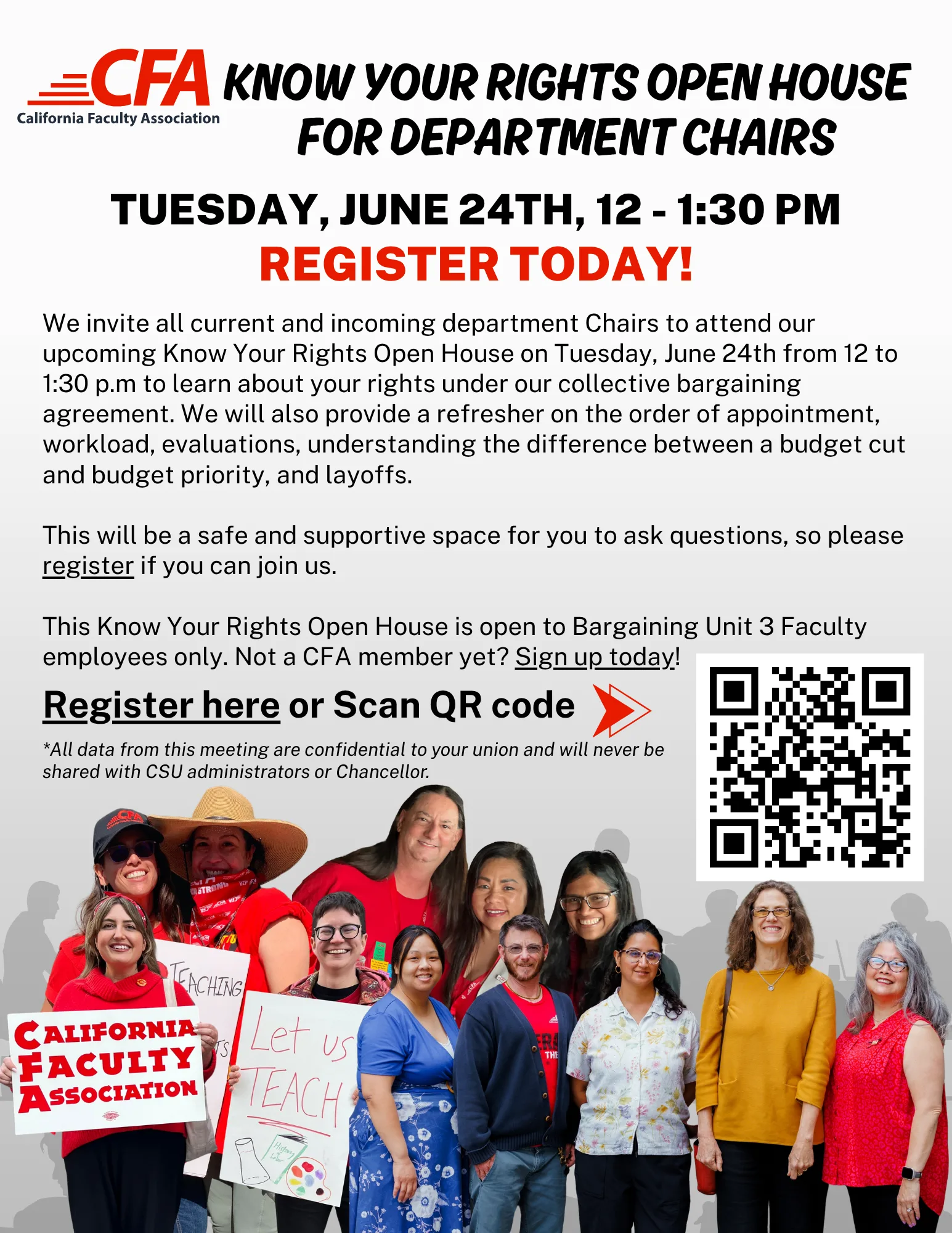
CFA KNOW YOUR RIGHTS OPEN HOUSE WITH DEPARTMENT CHAIRS ON TUES. JUNE 24TH, 2025 FROM 12-1:30 PM! BE THERE AND REGISTER HERE WITH THIS LINK.
Chapter MemoriesUnited to Defend Public Education Organizing Conference at SF State | February 2025
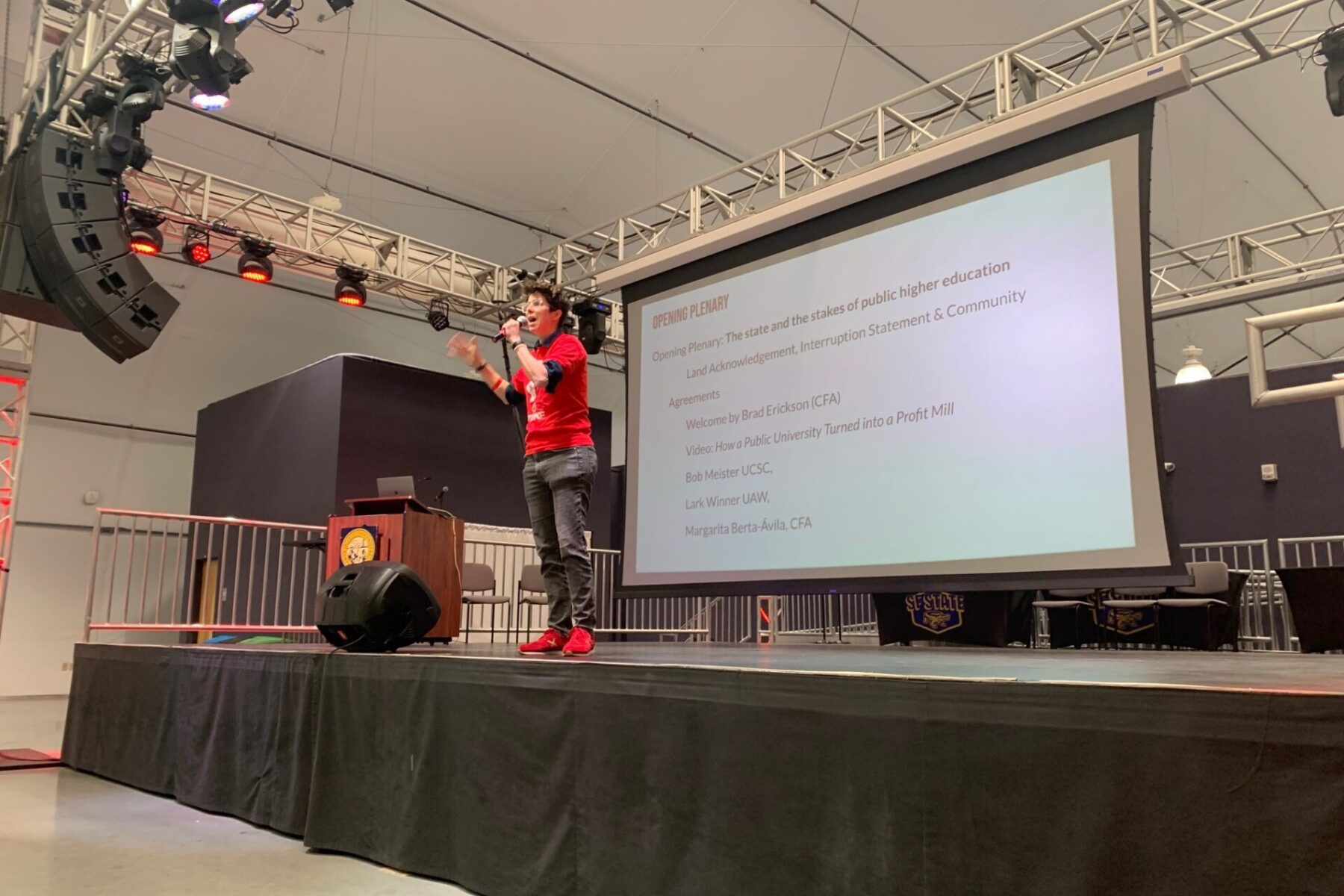
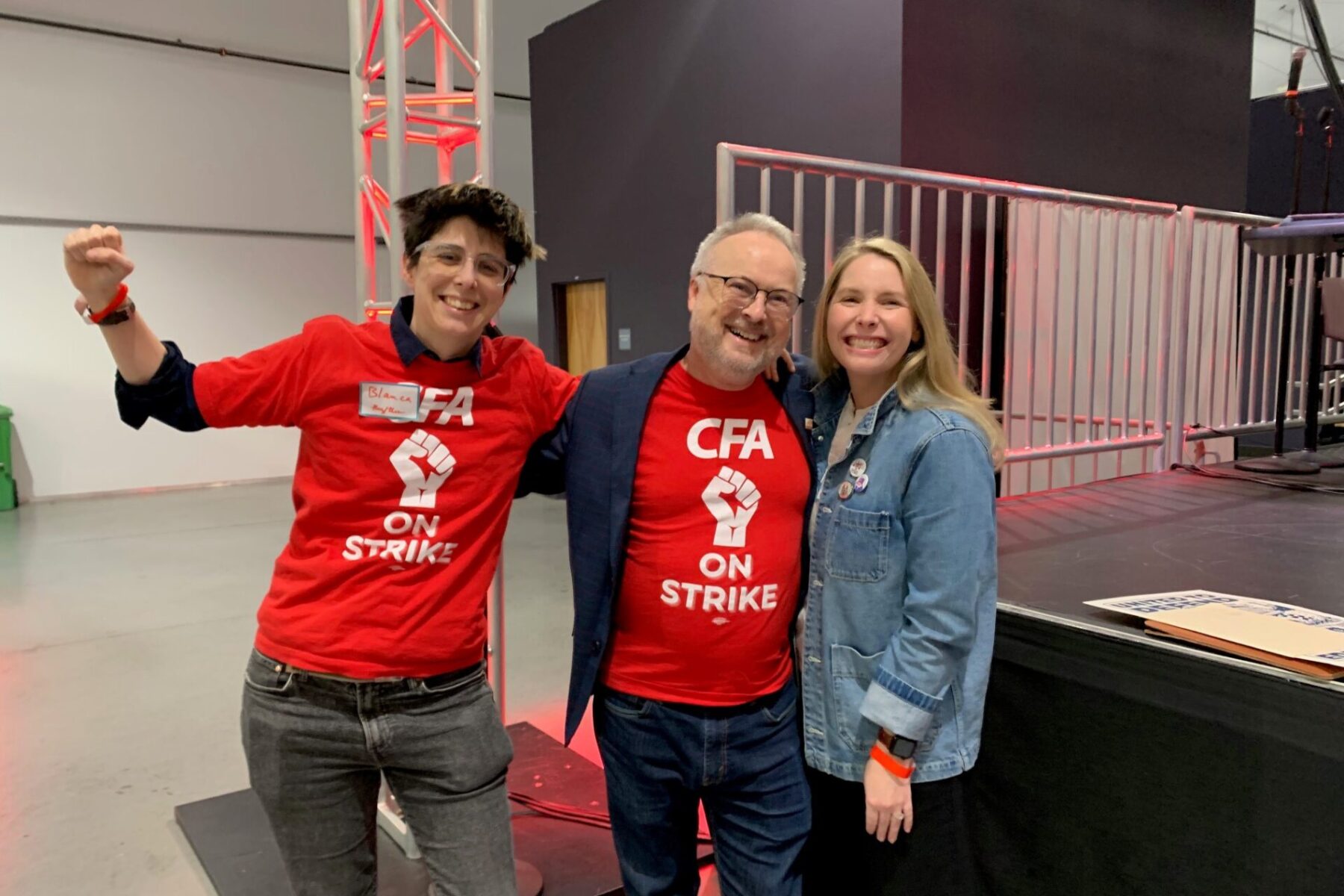
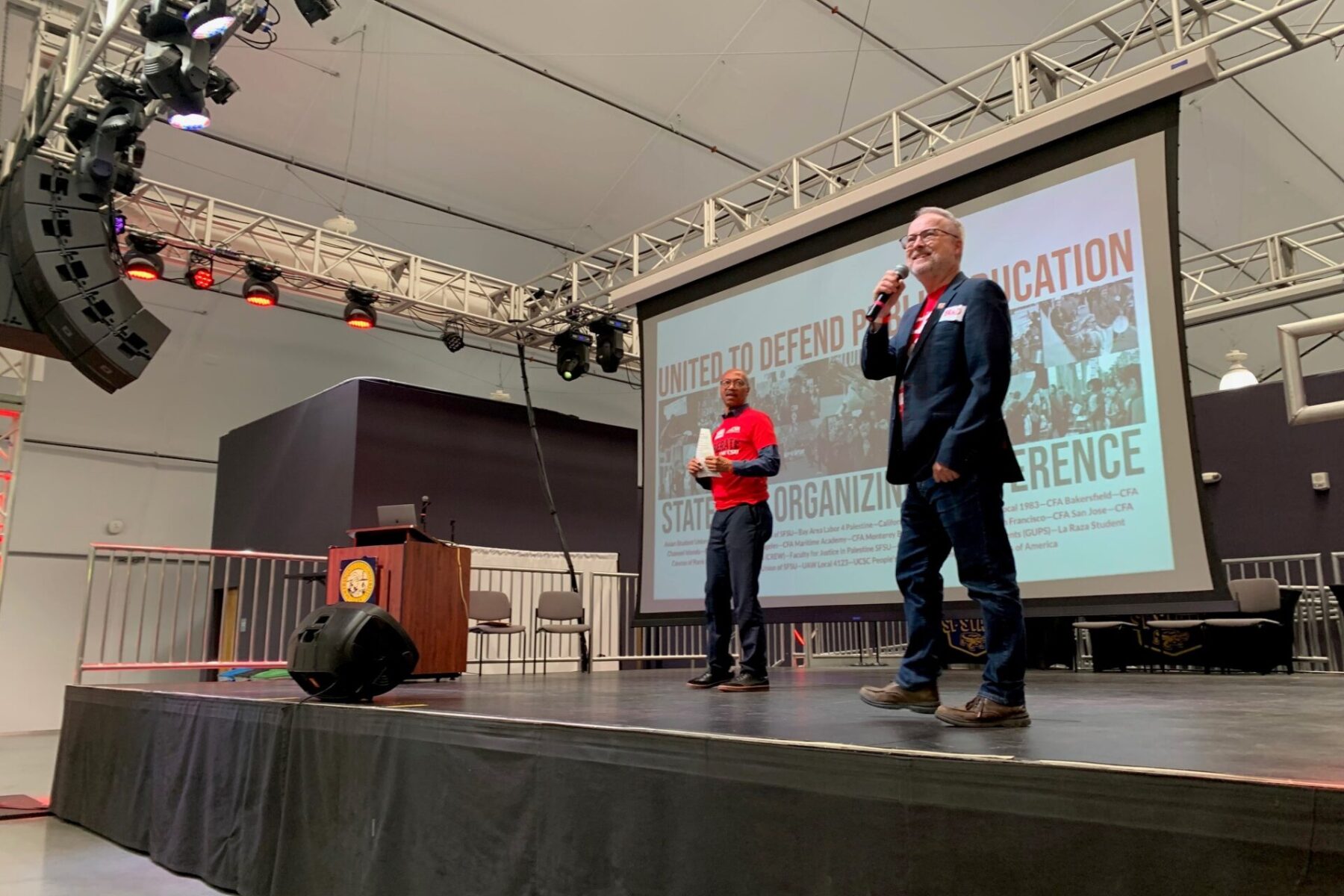
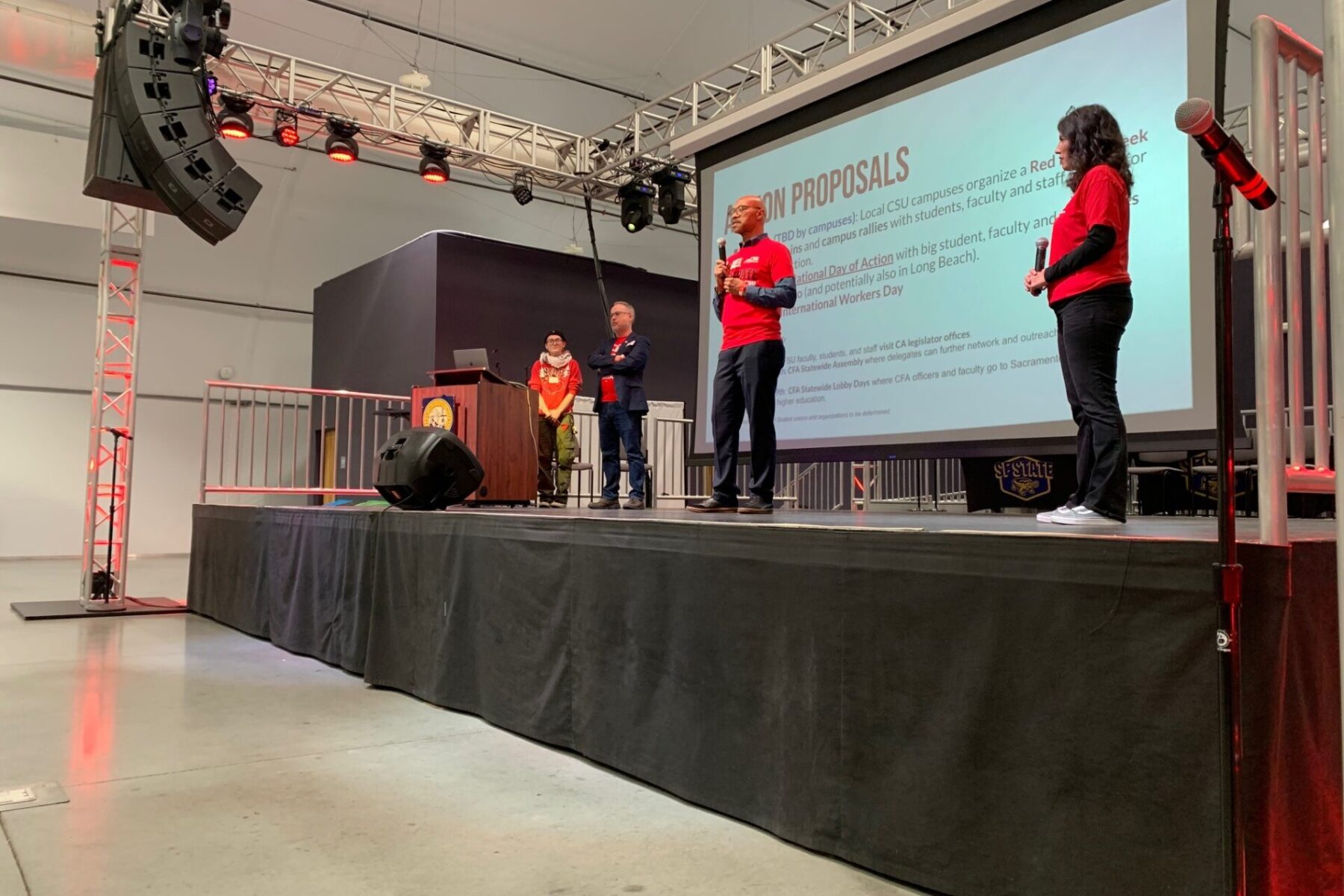
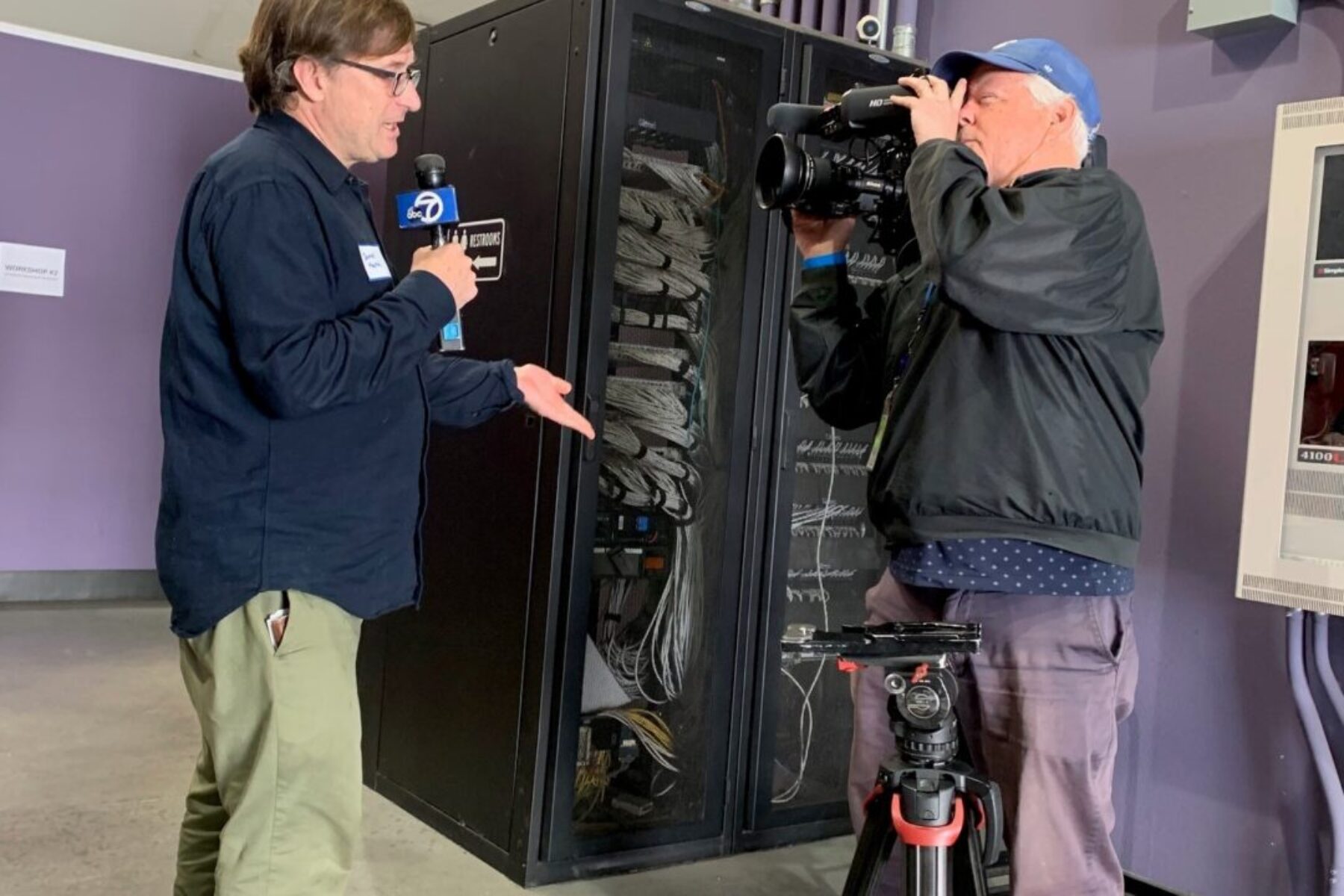
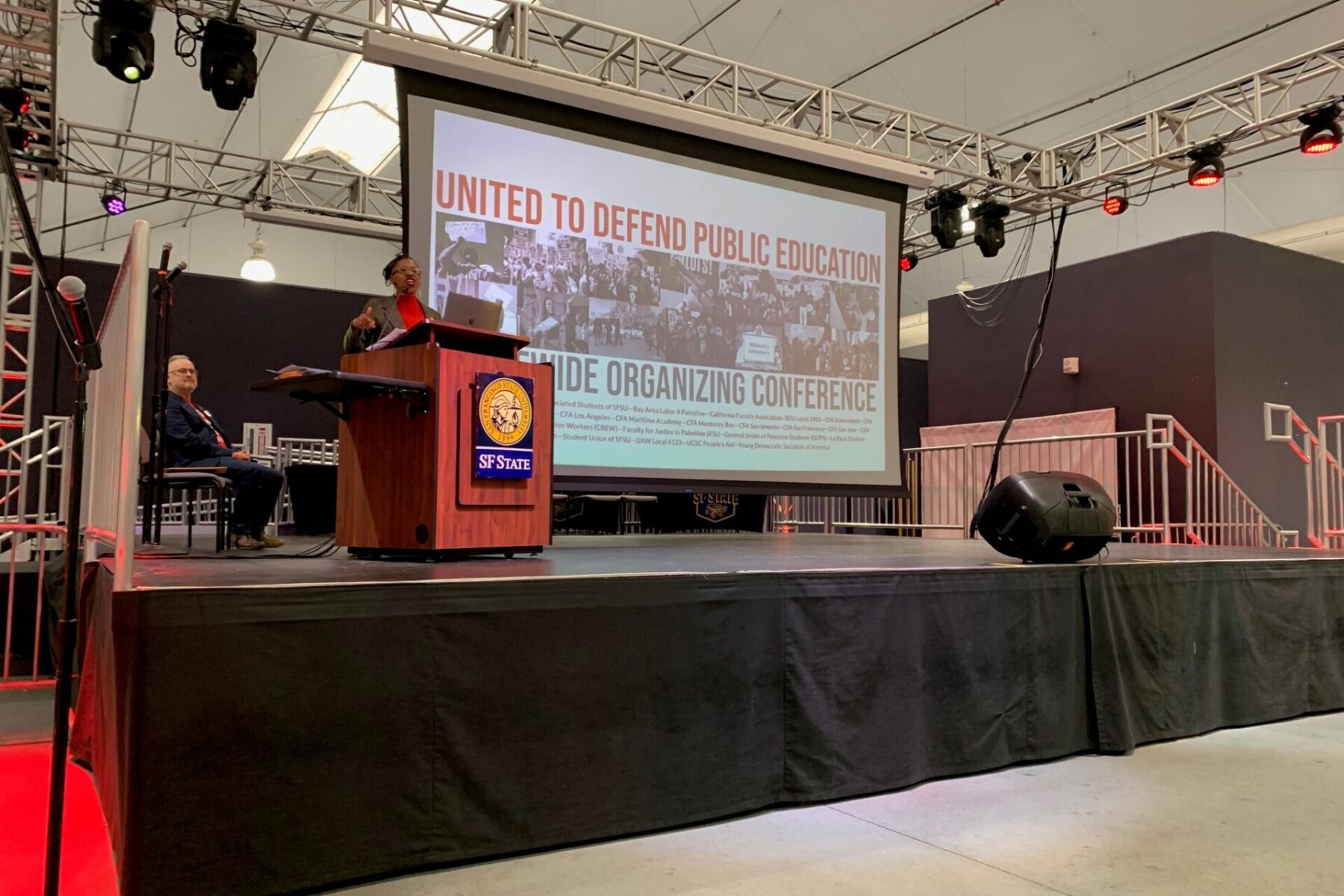
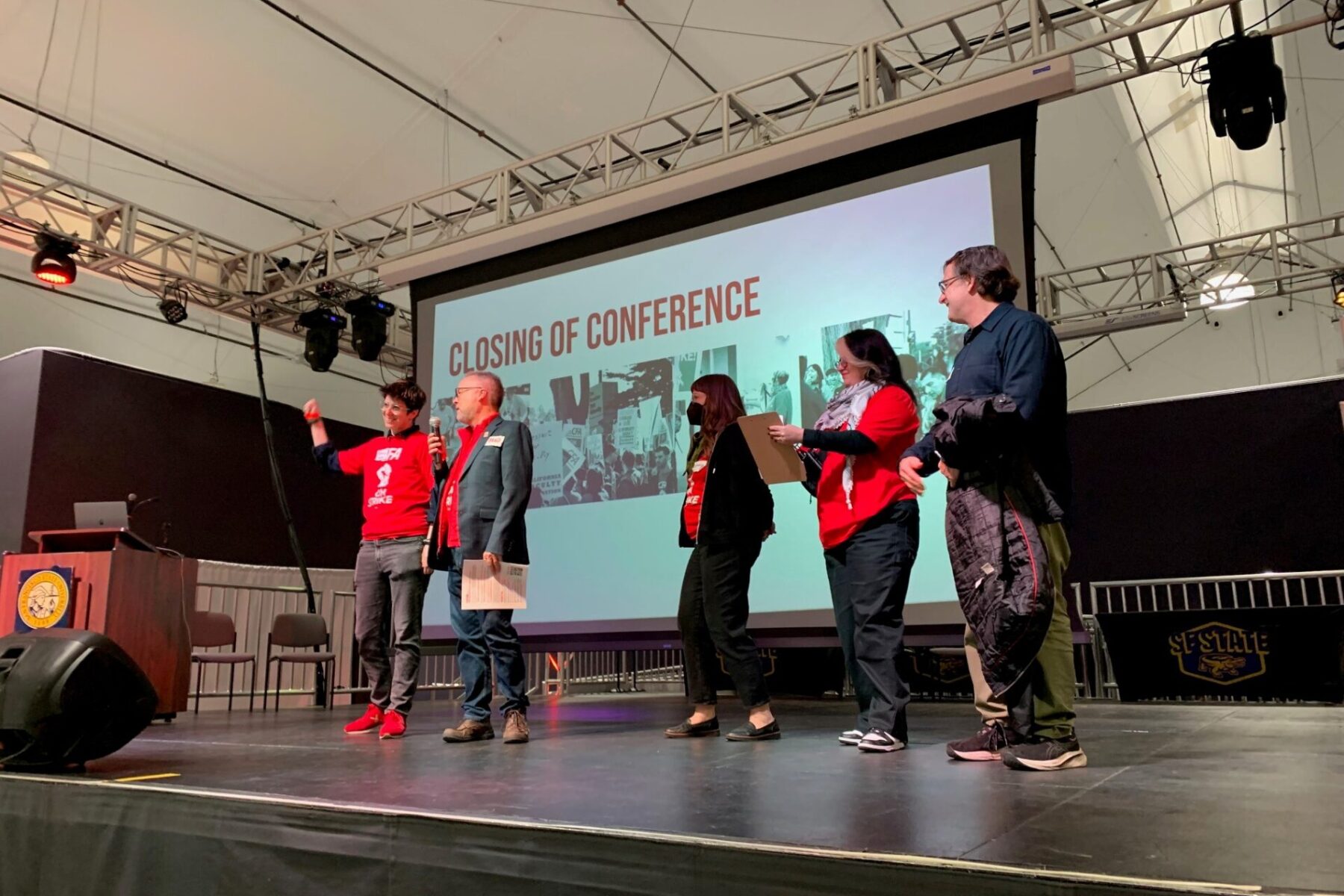
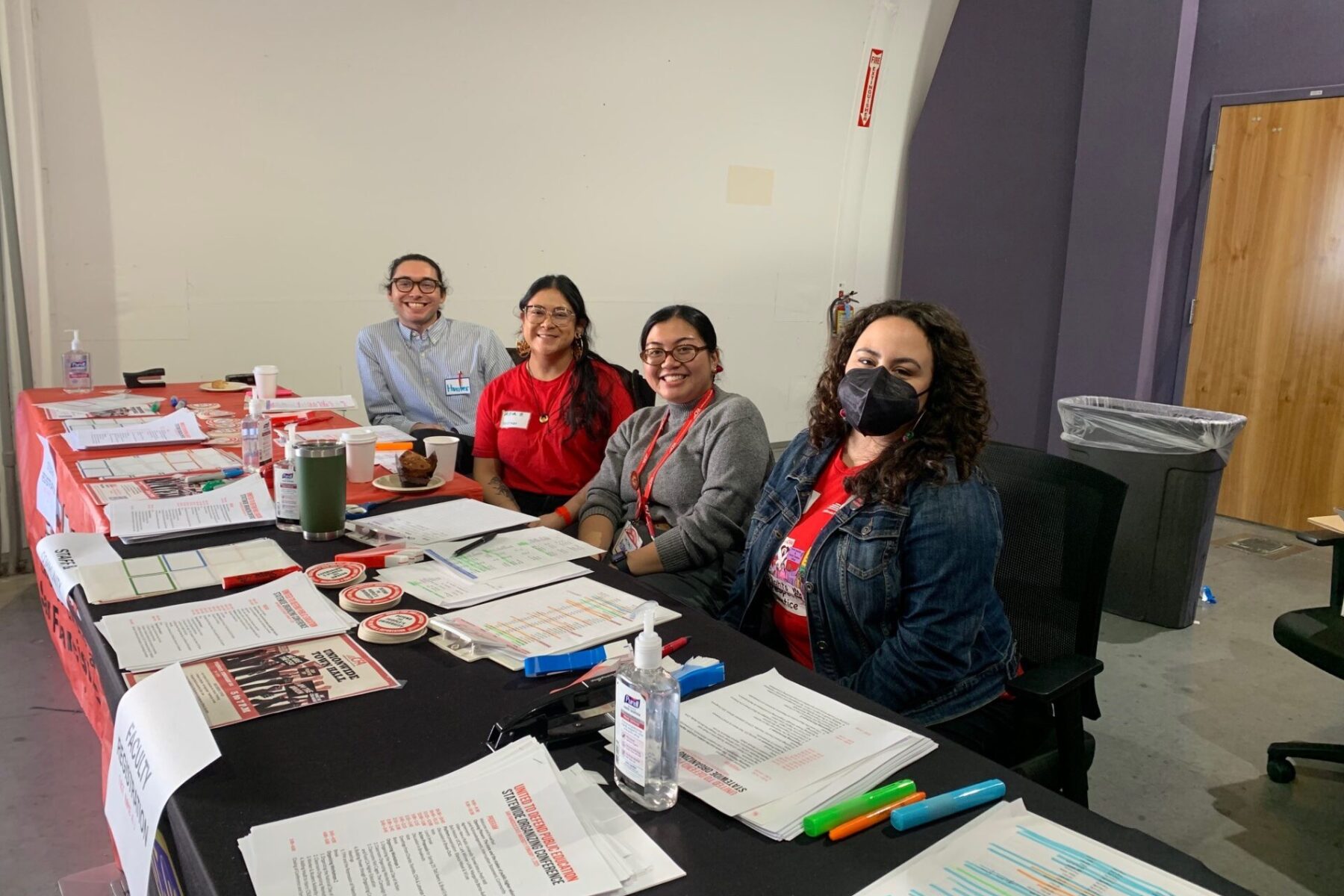
National Day of Action at SFSU | April 2025
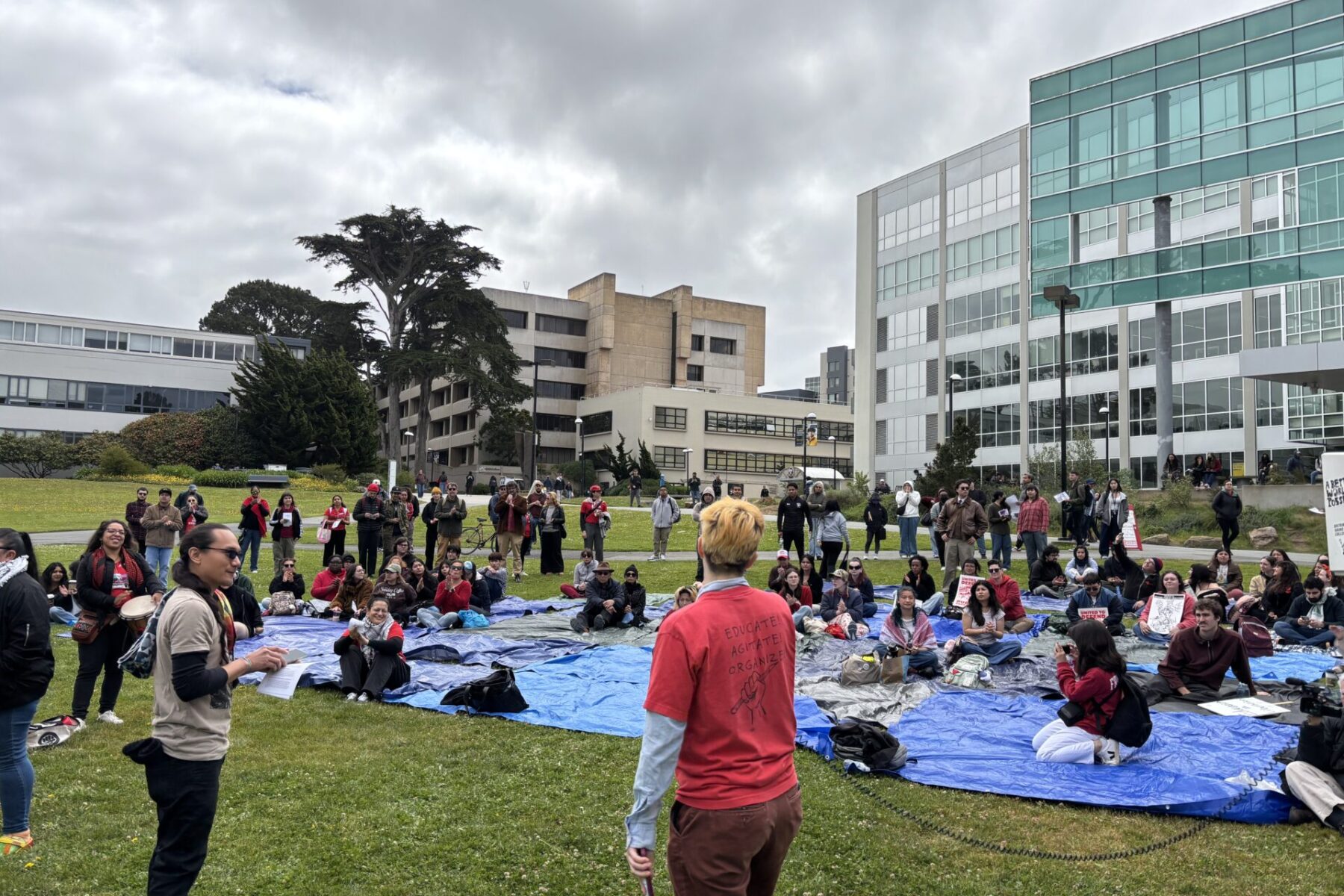
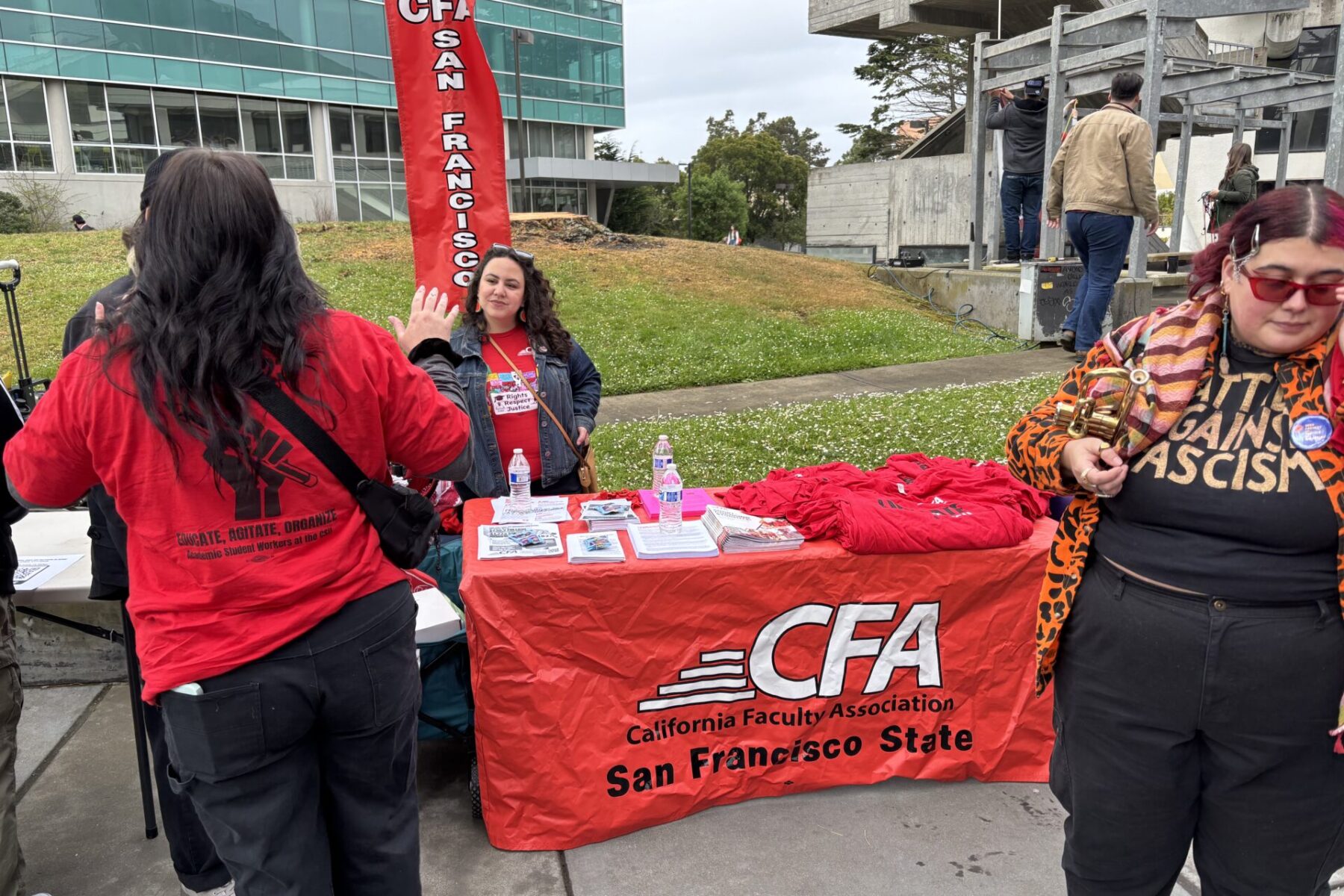
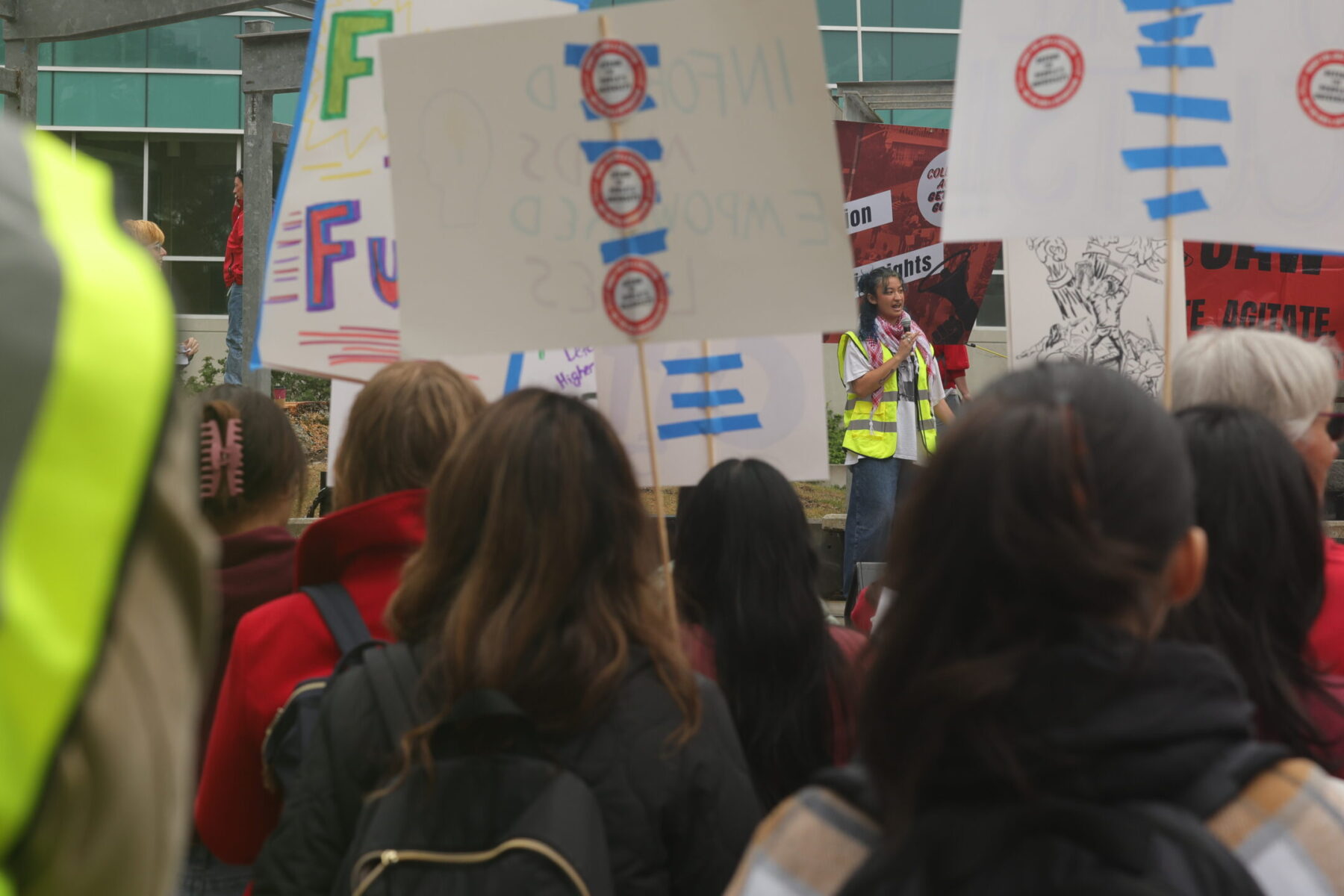
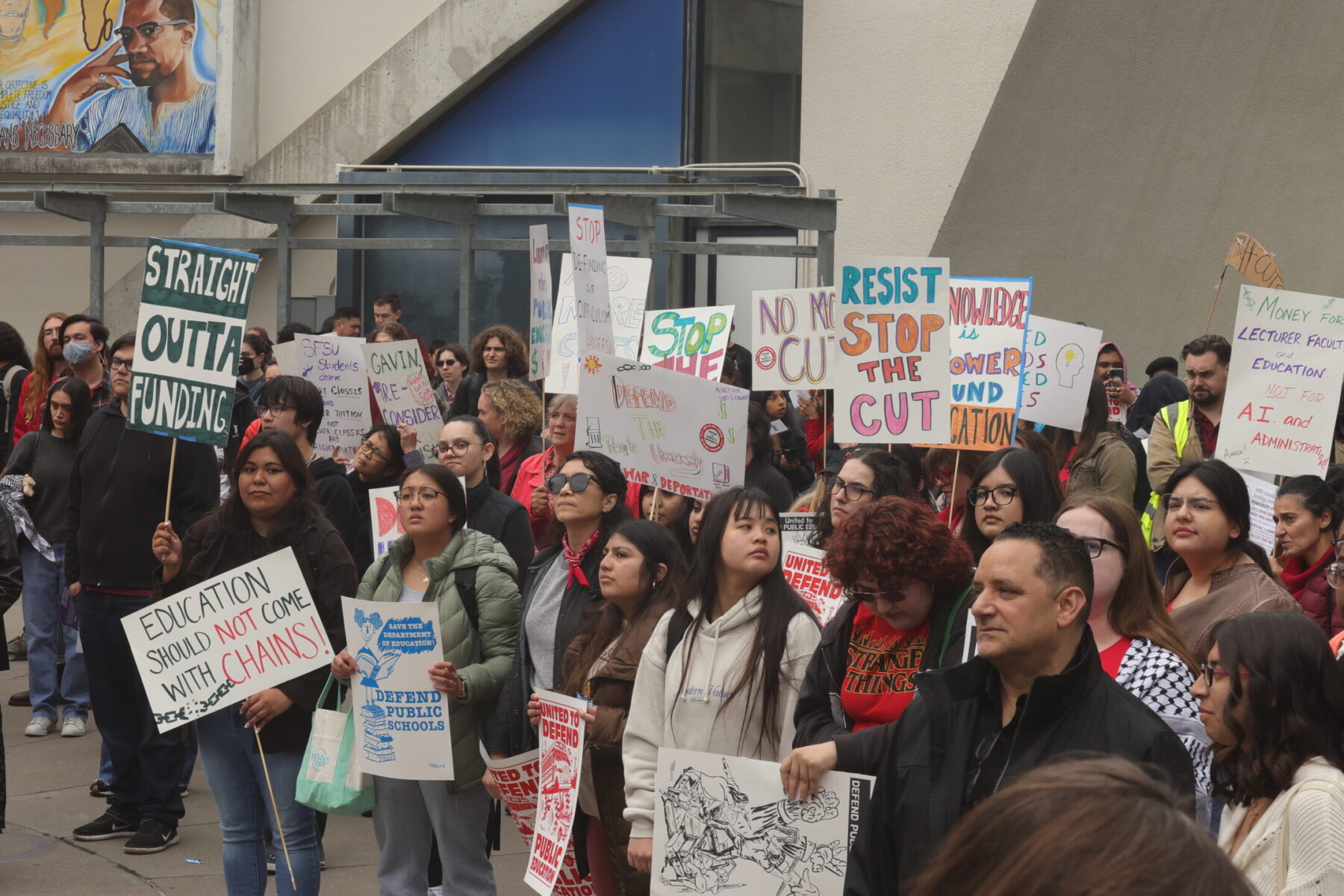
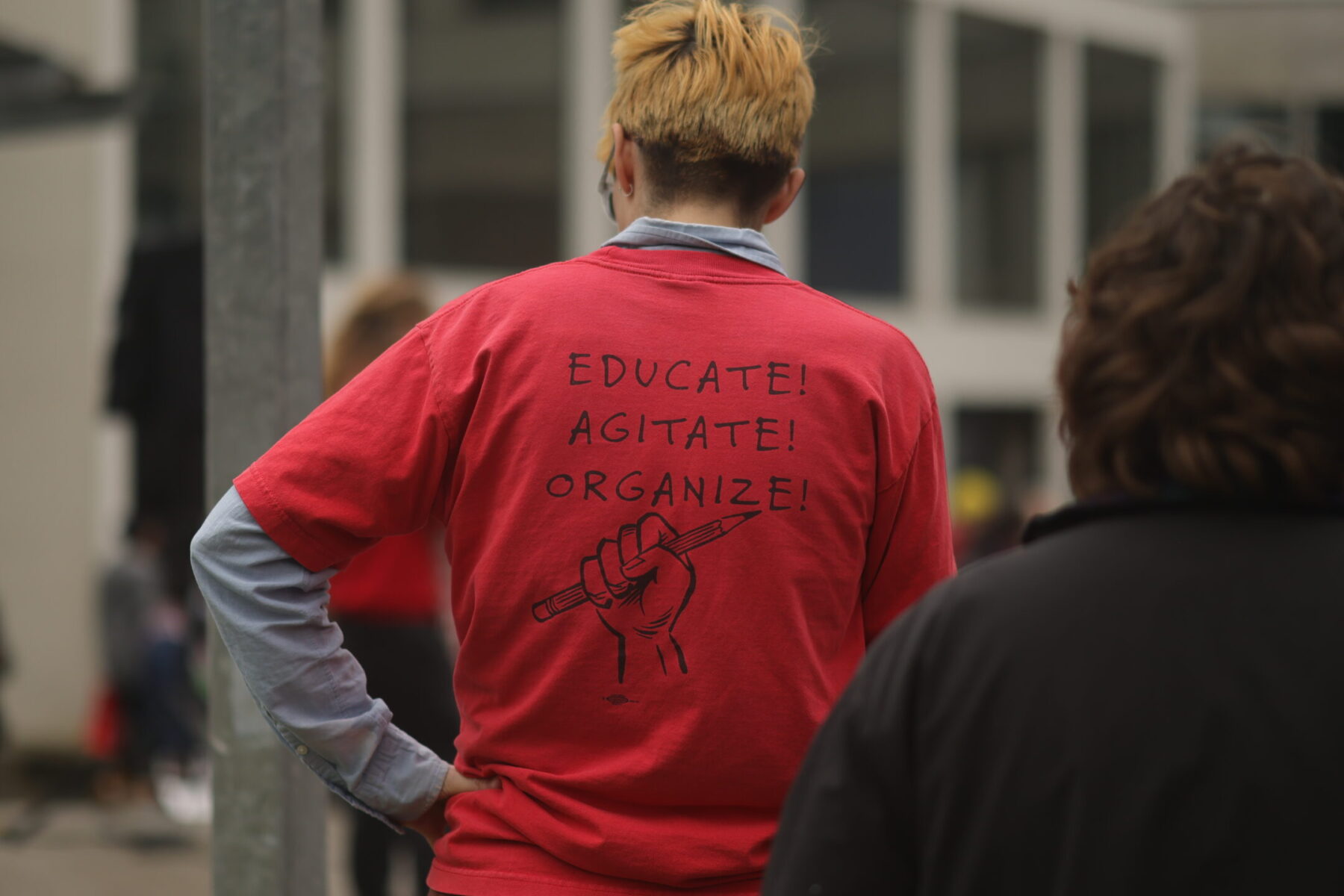
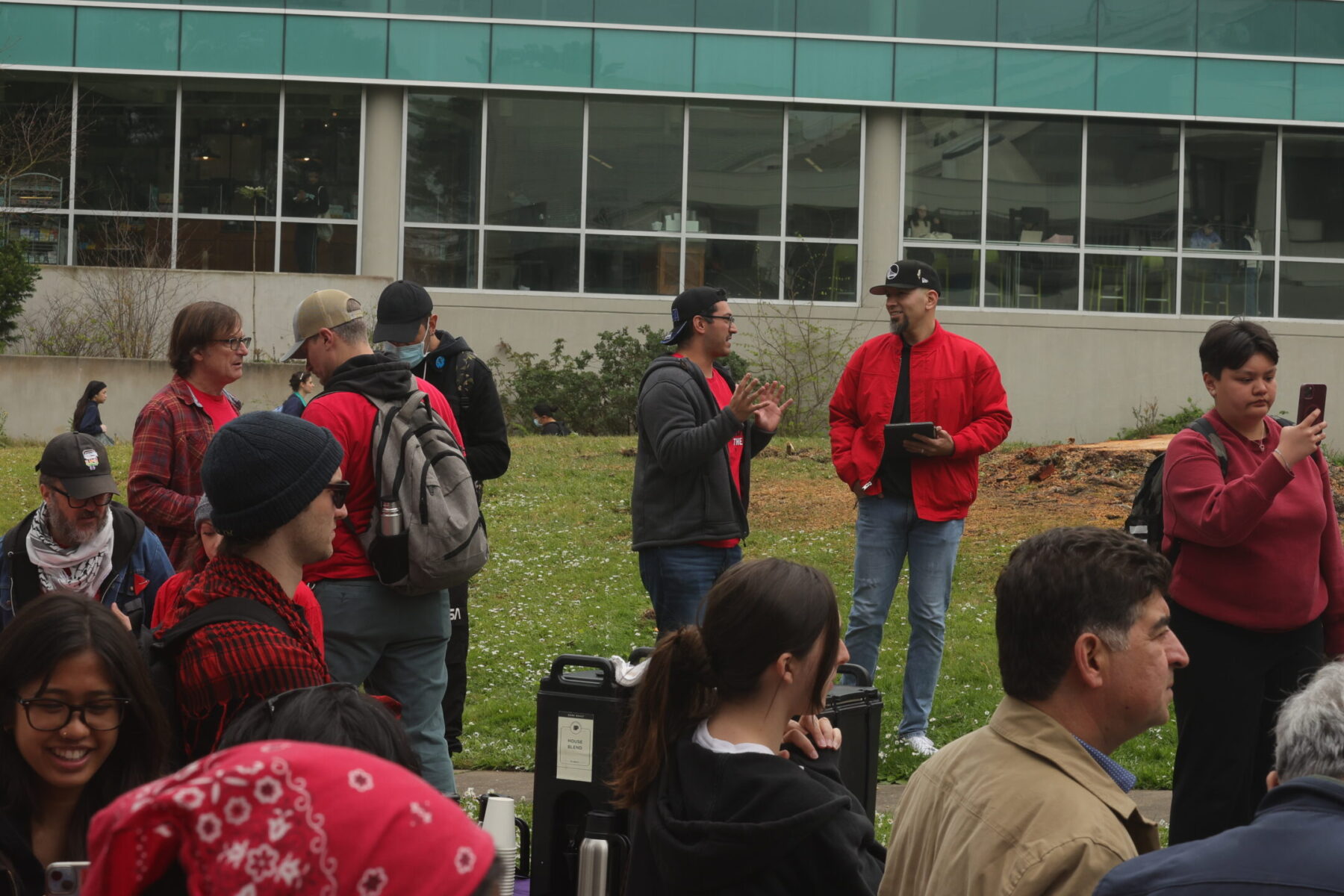
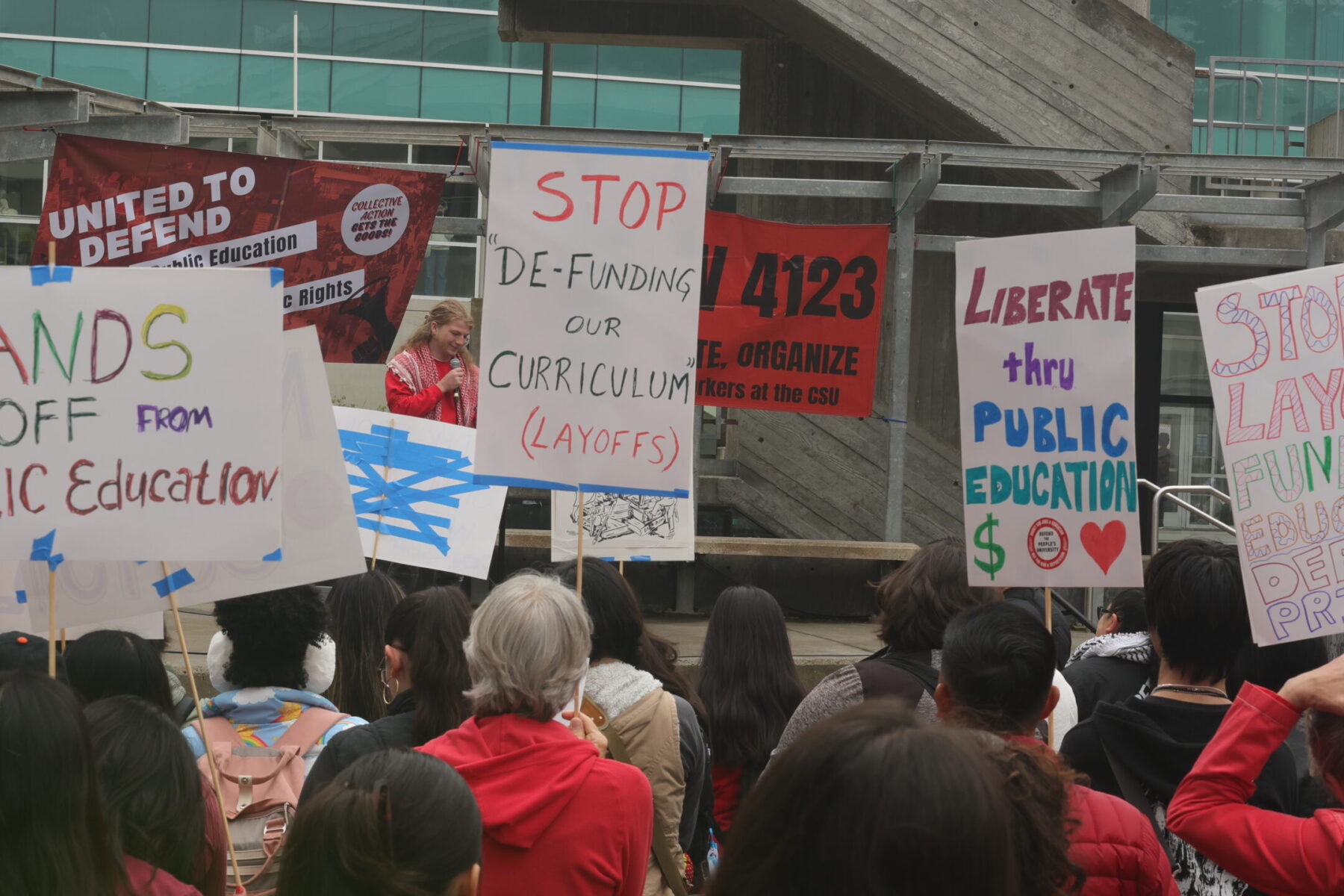
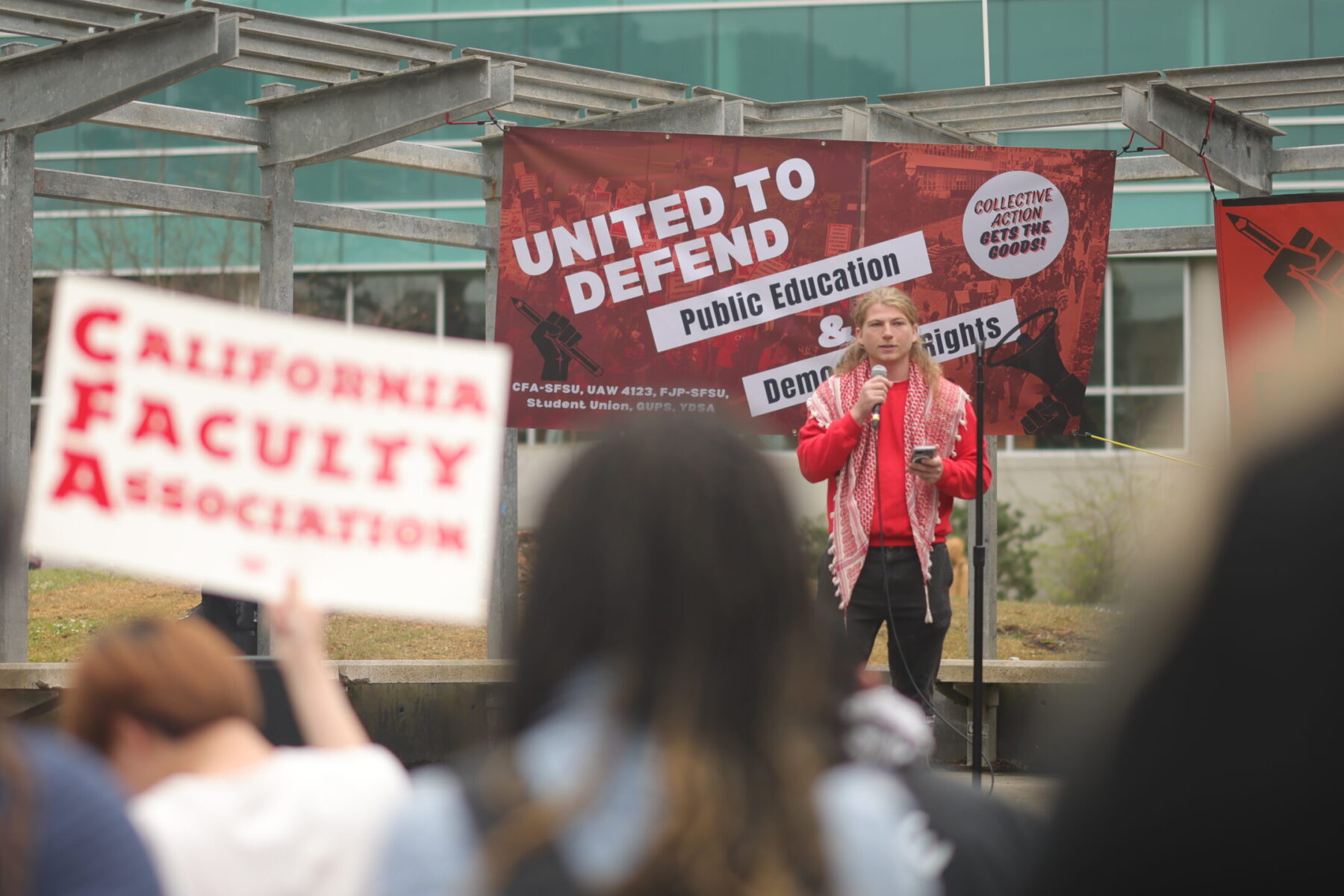
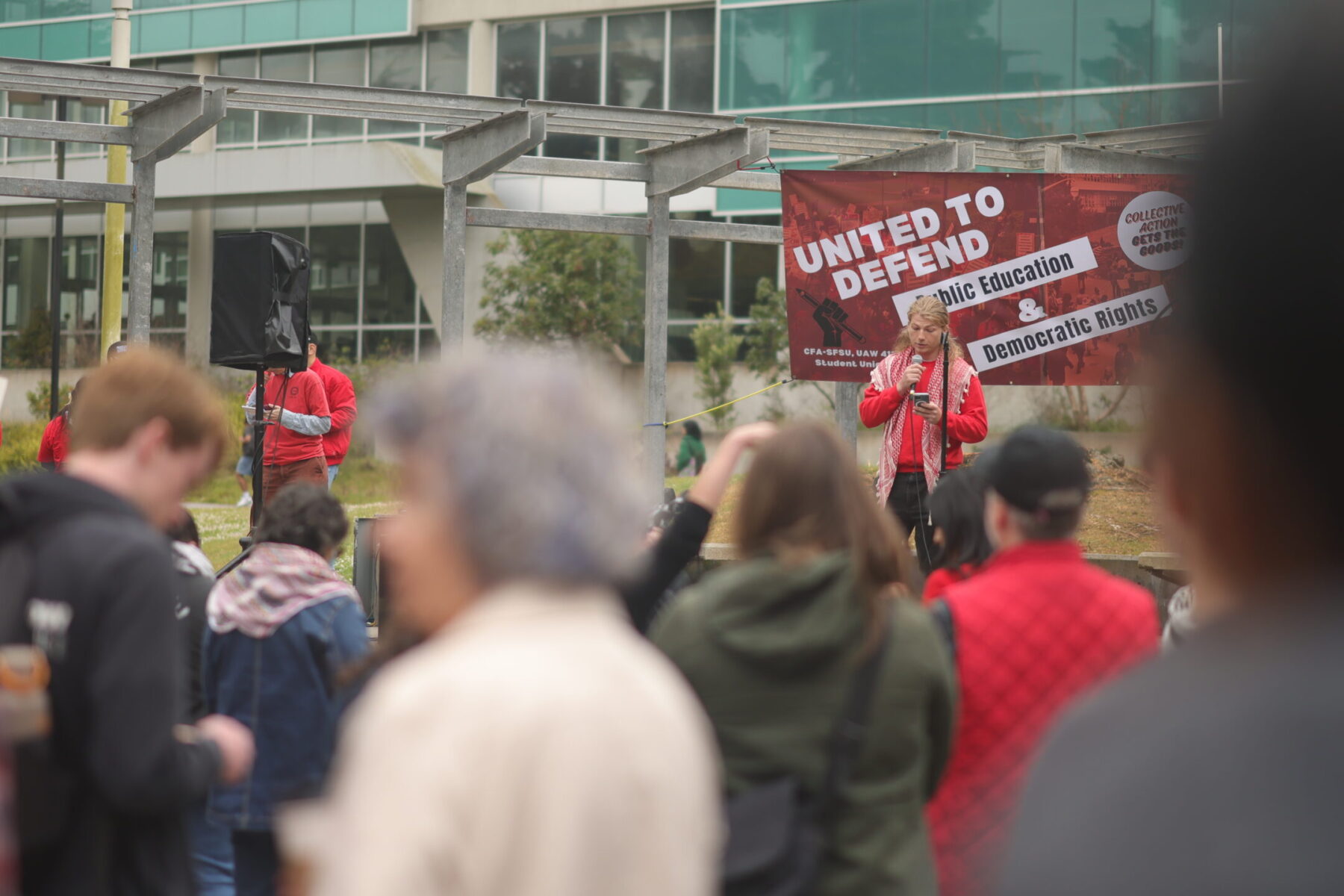
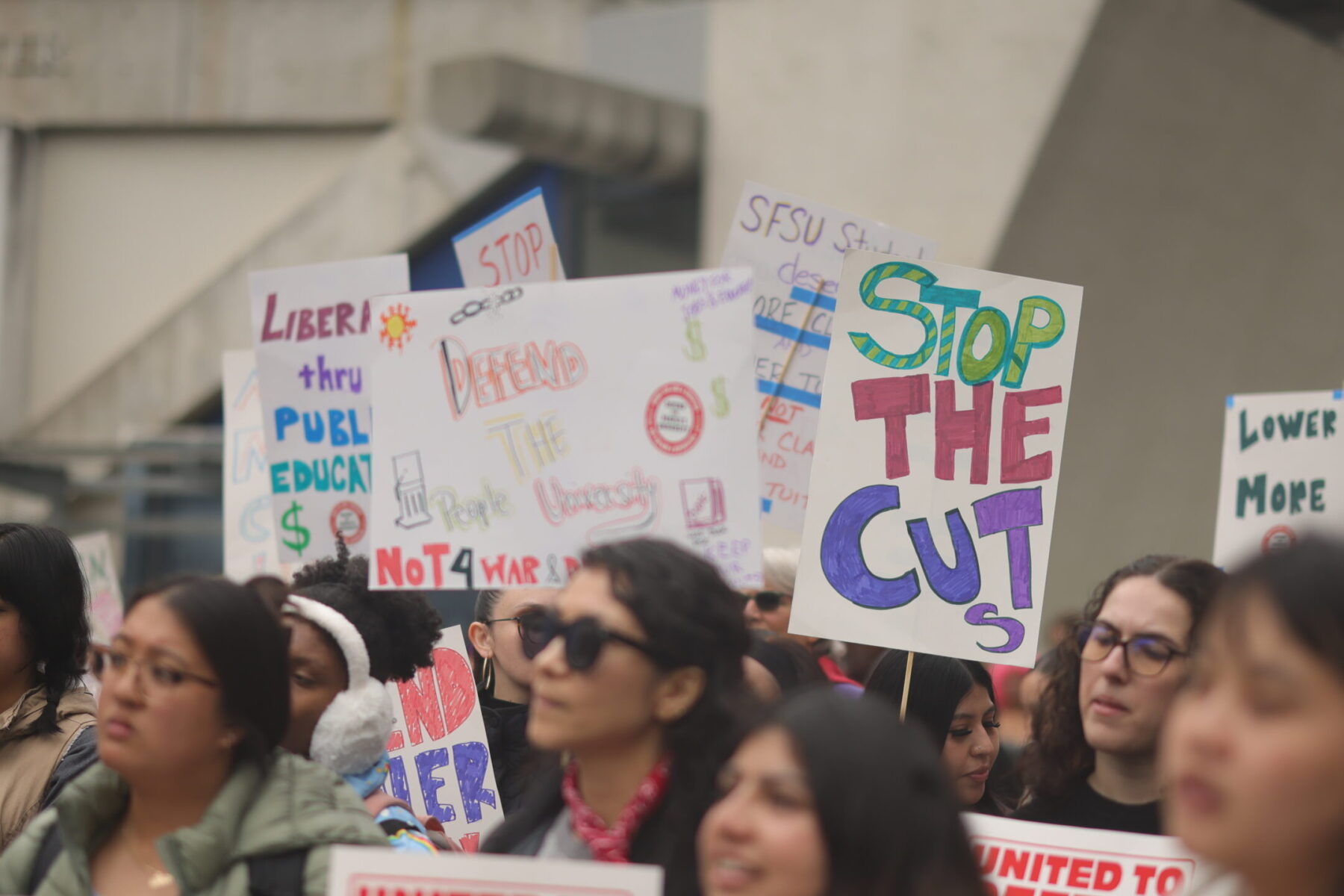
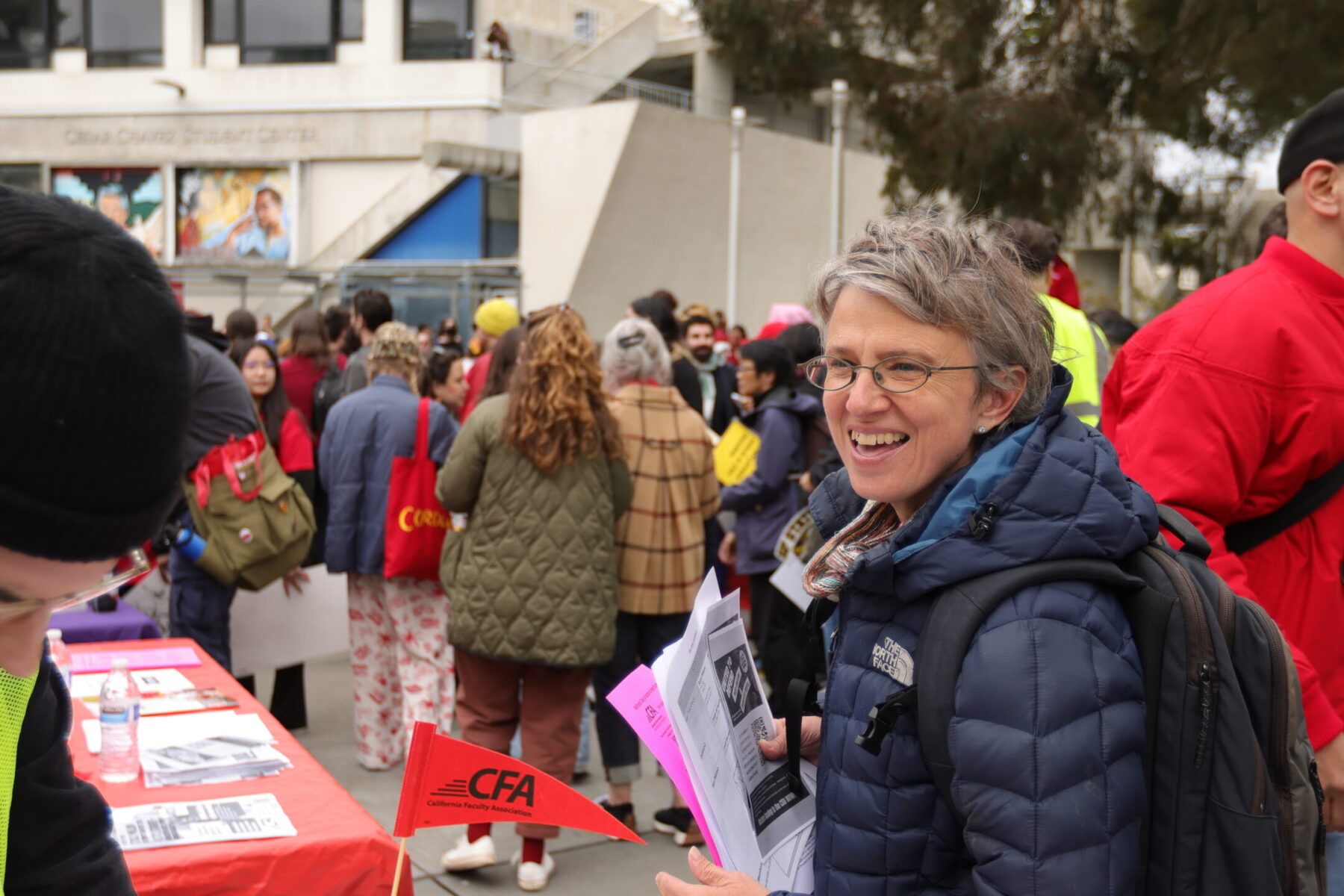
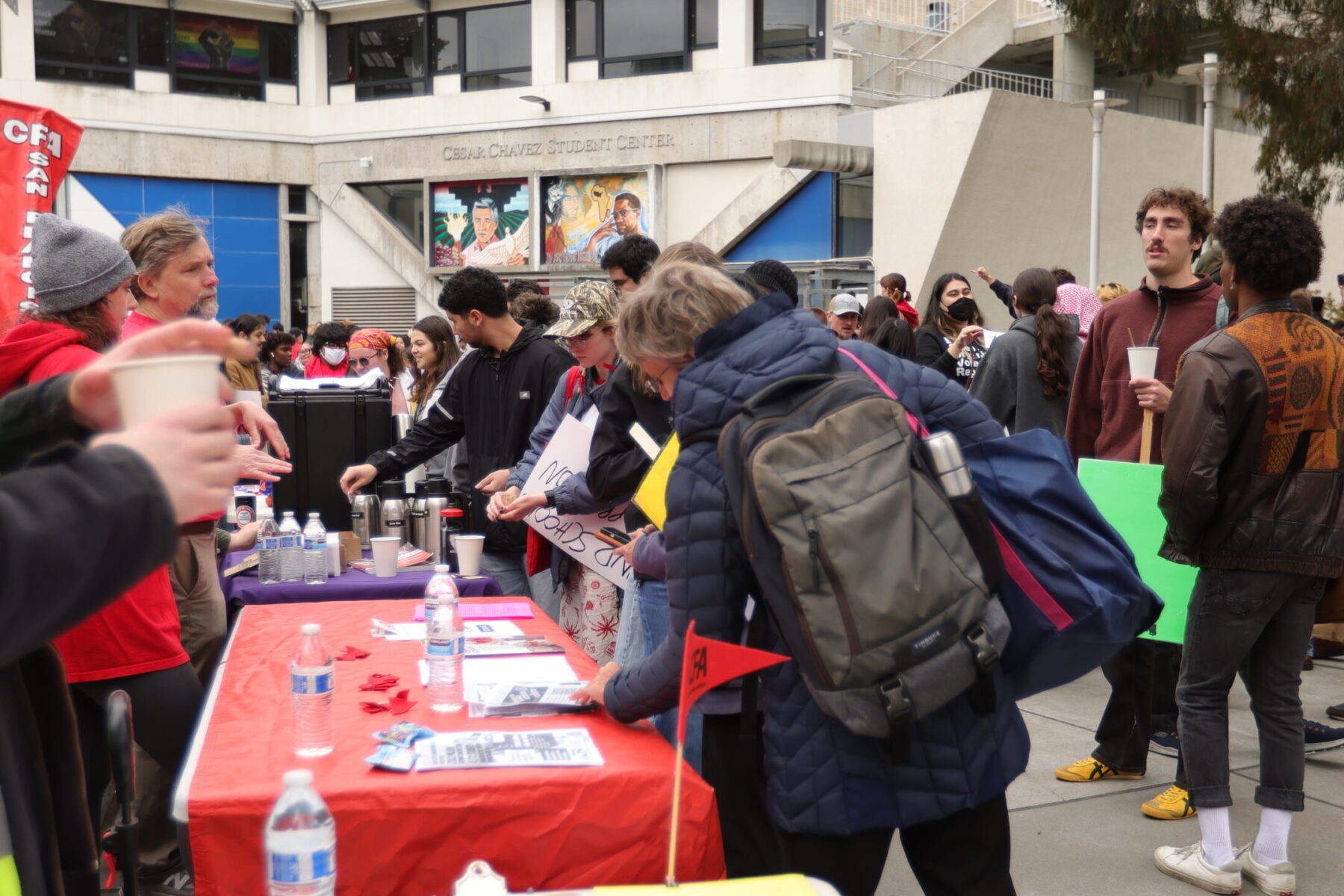
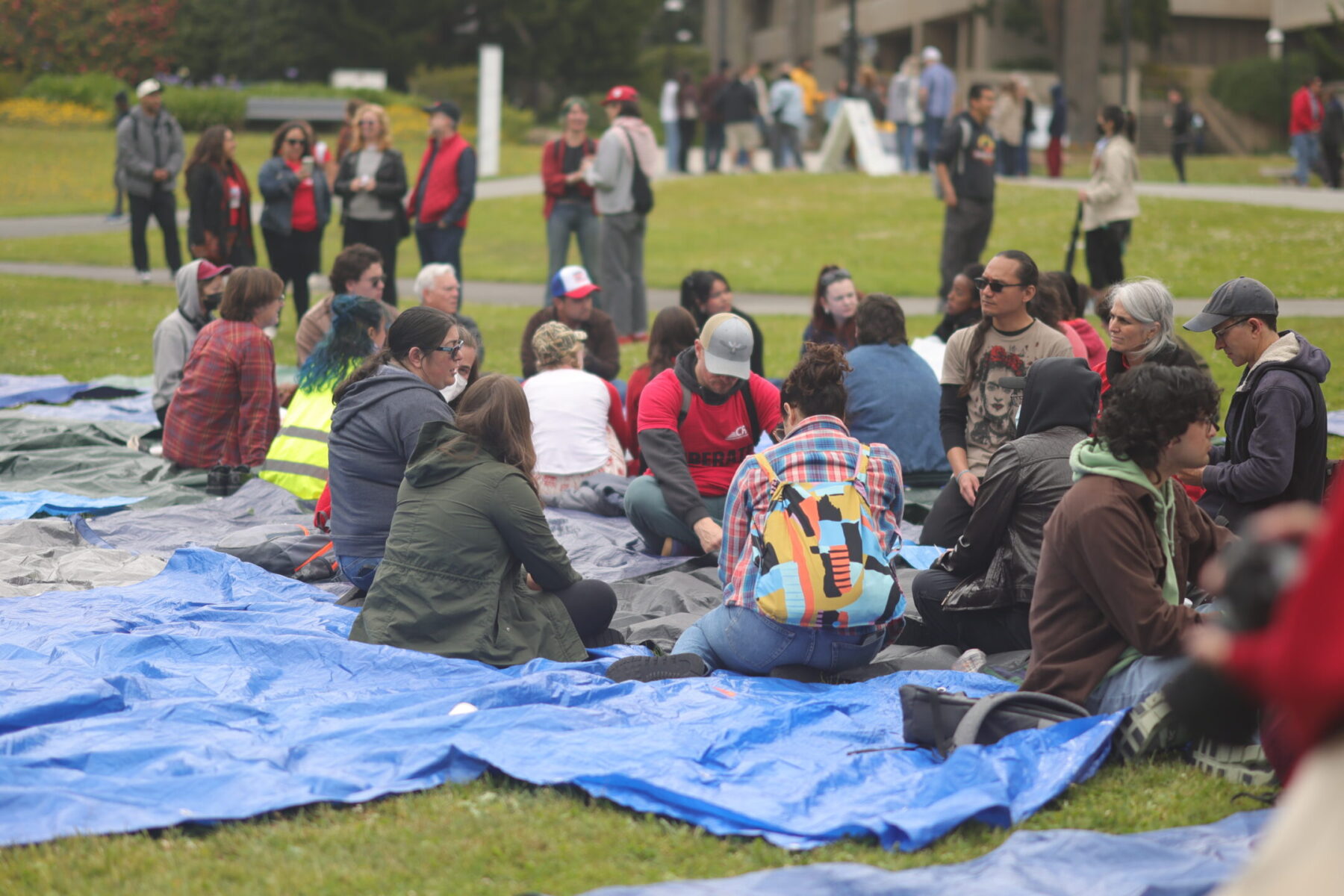
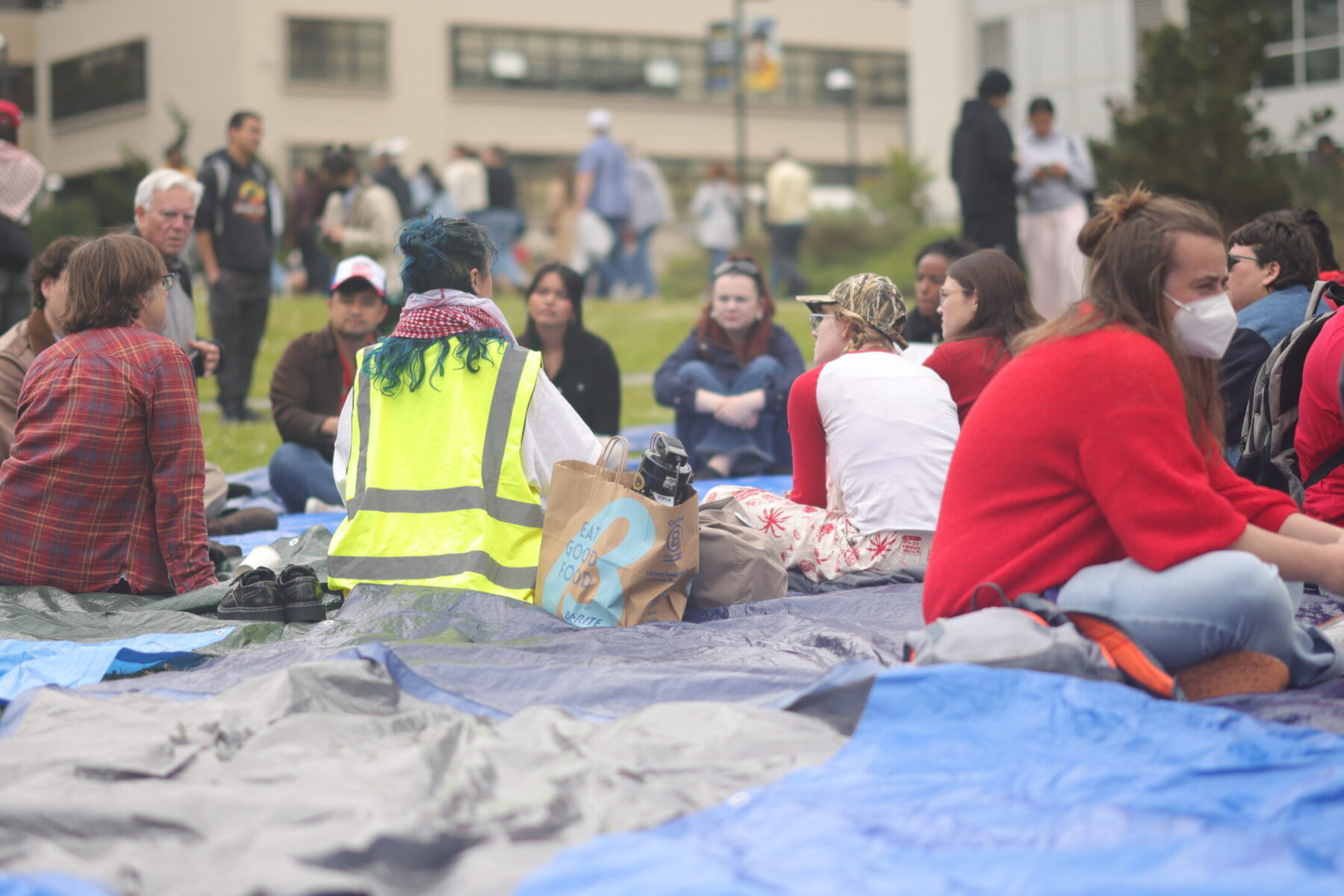
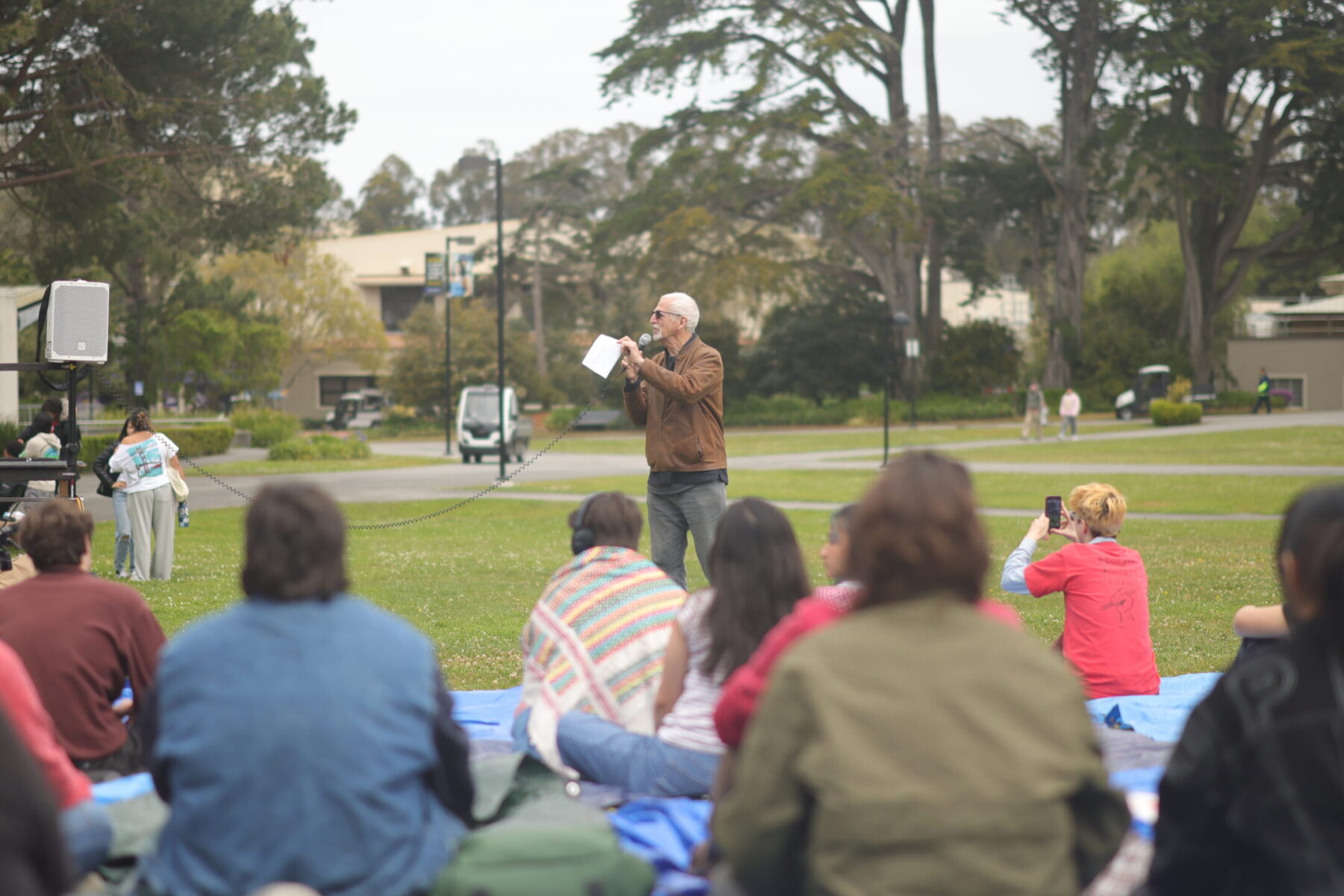
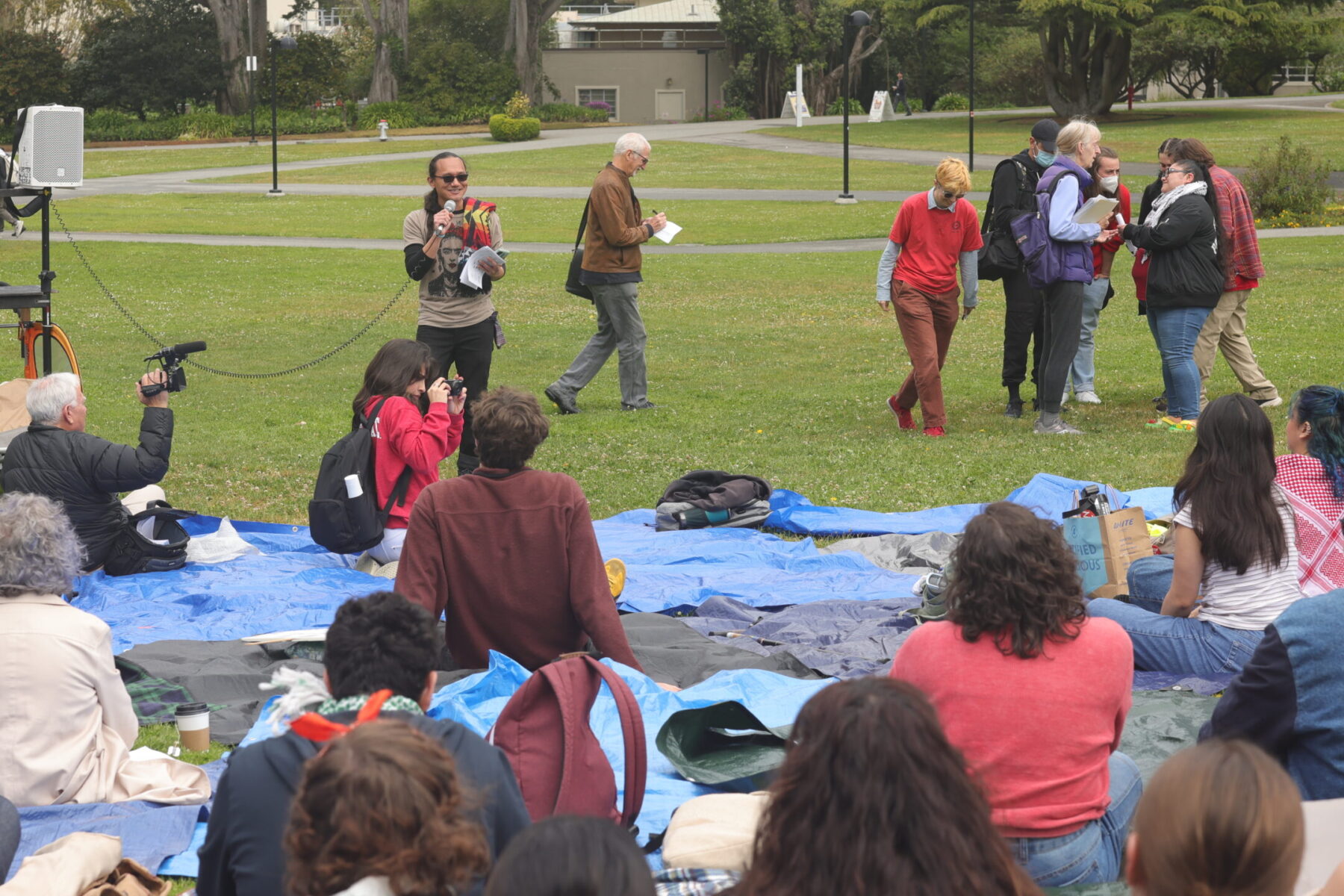
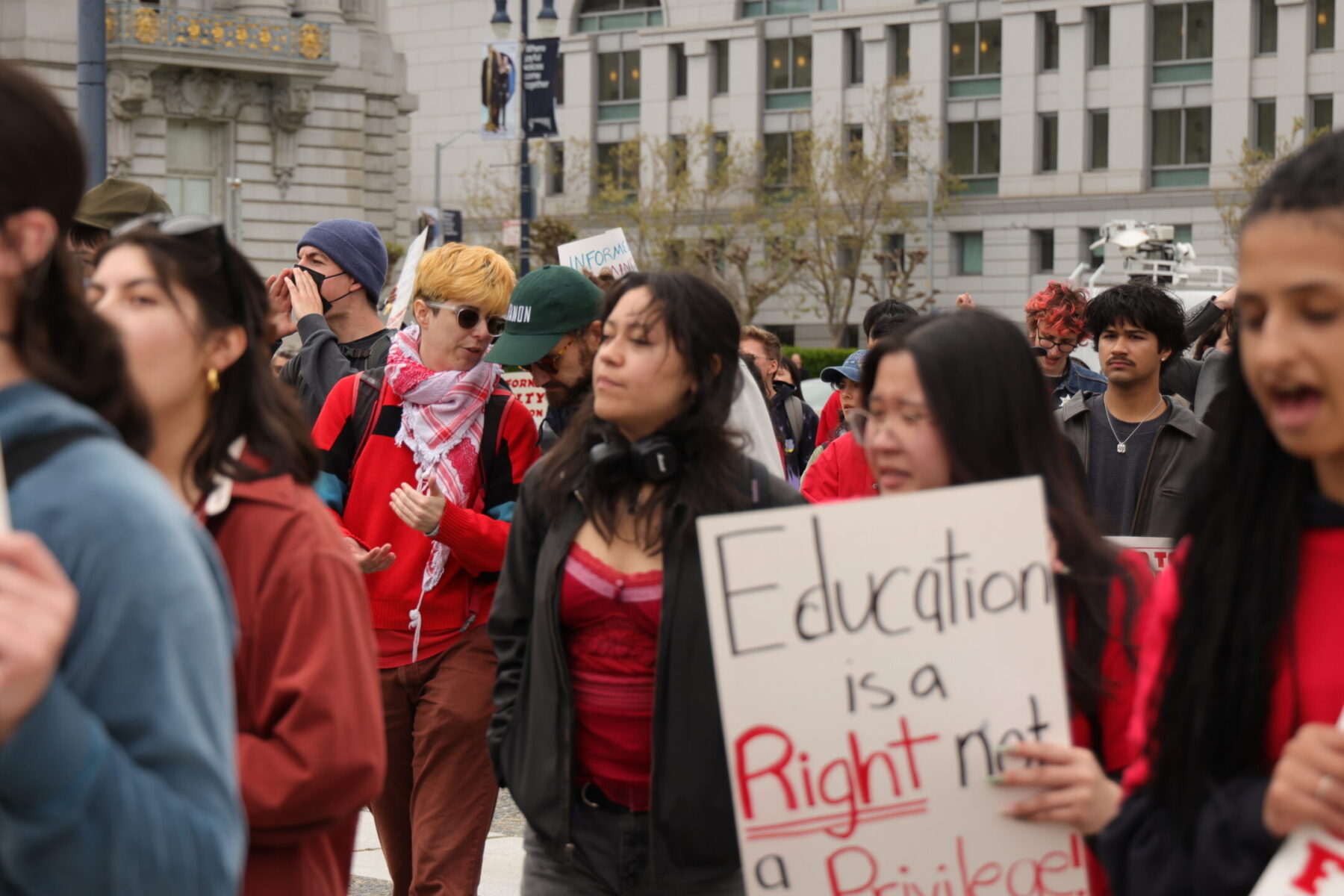
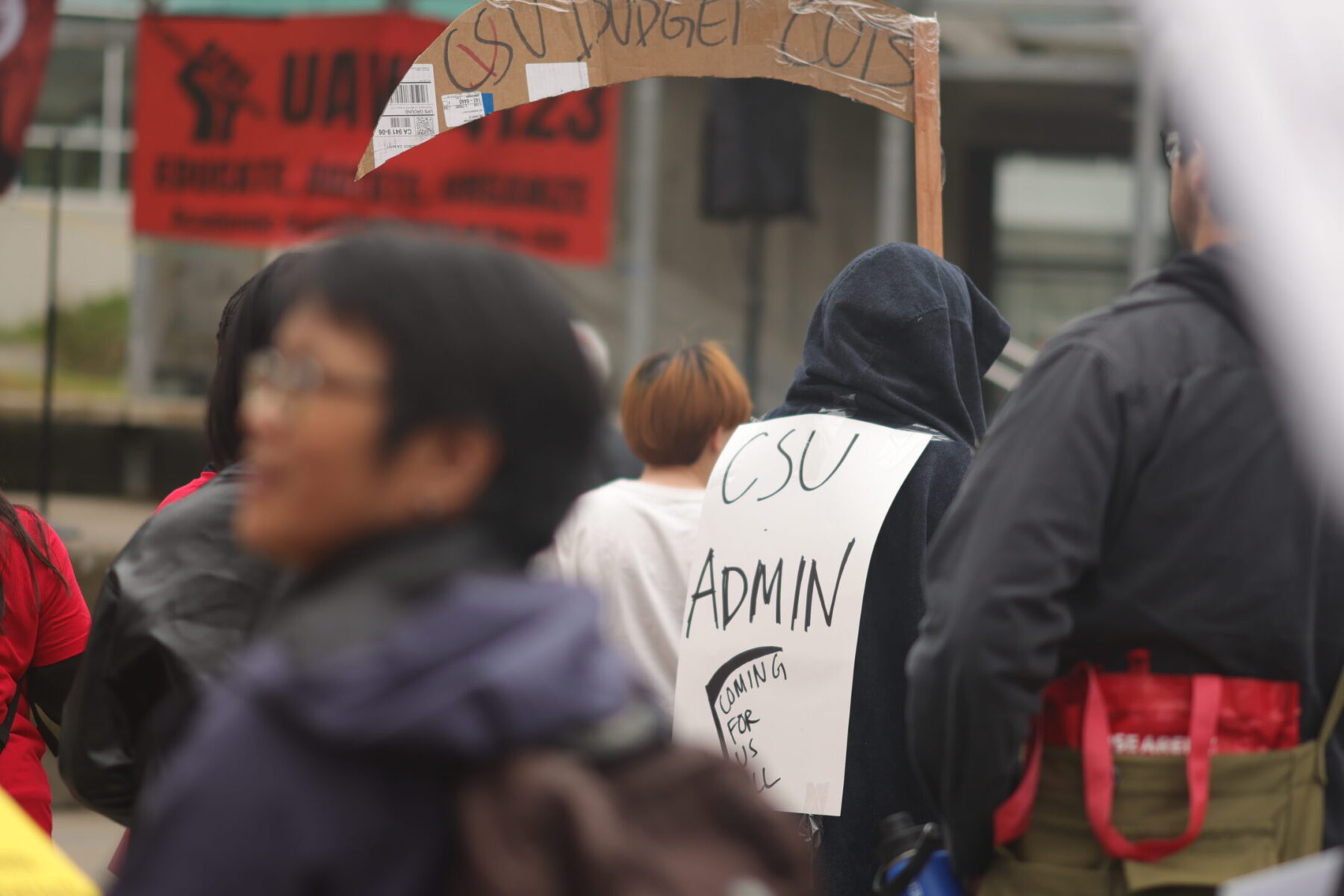
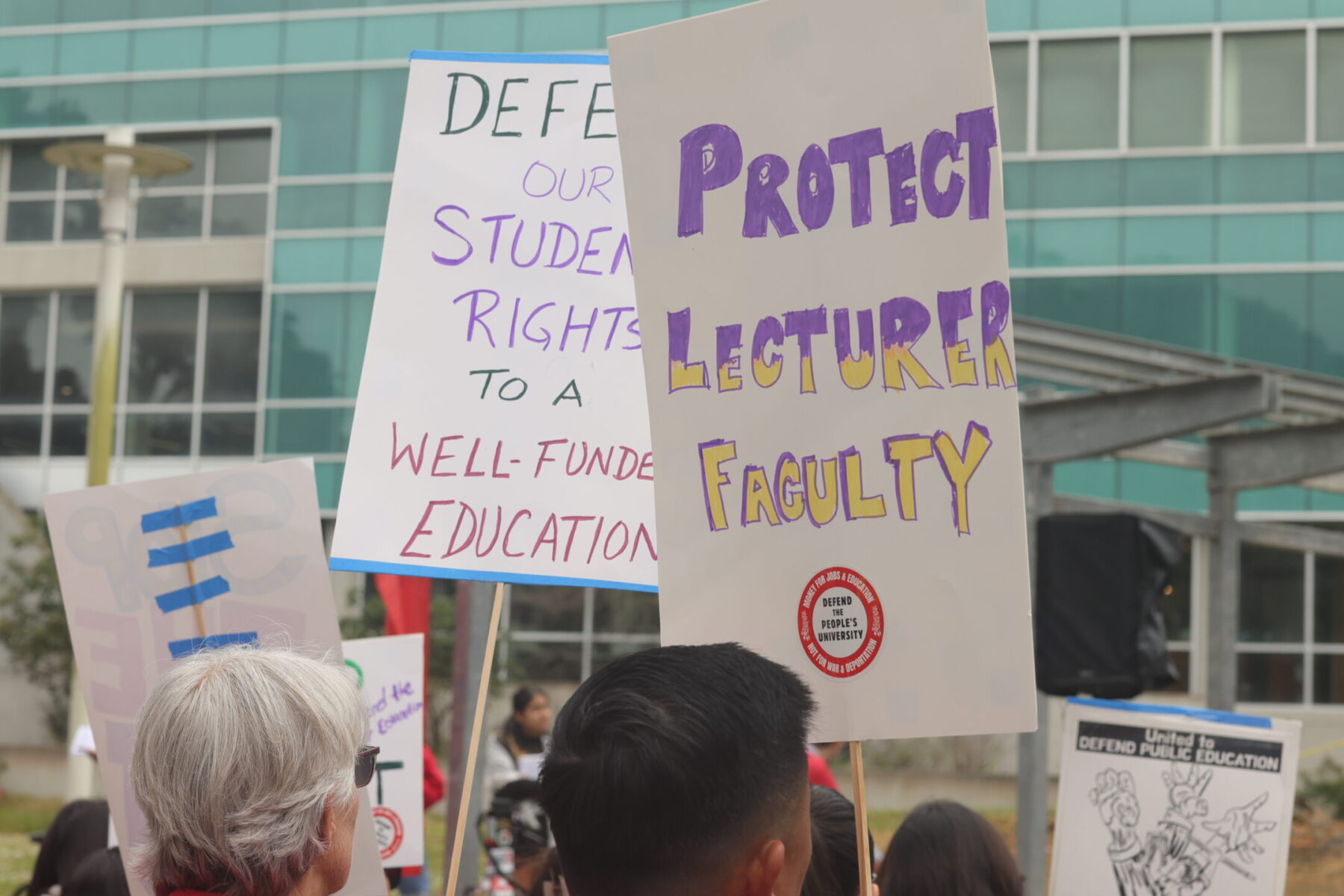
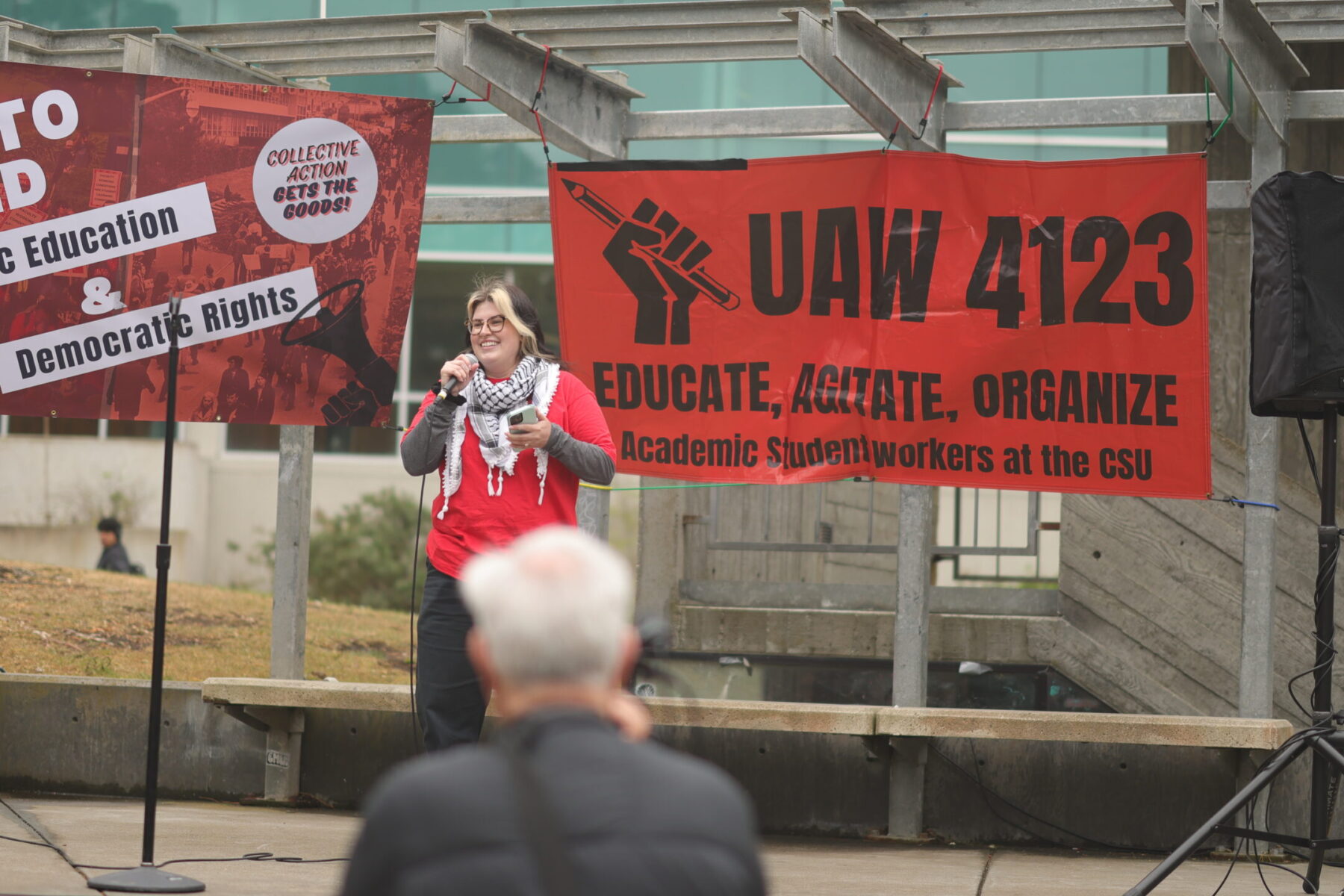
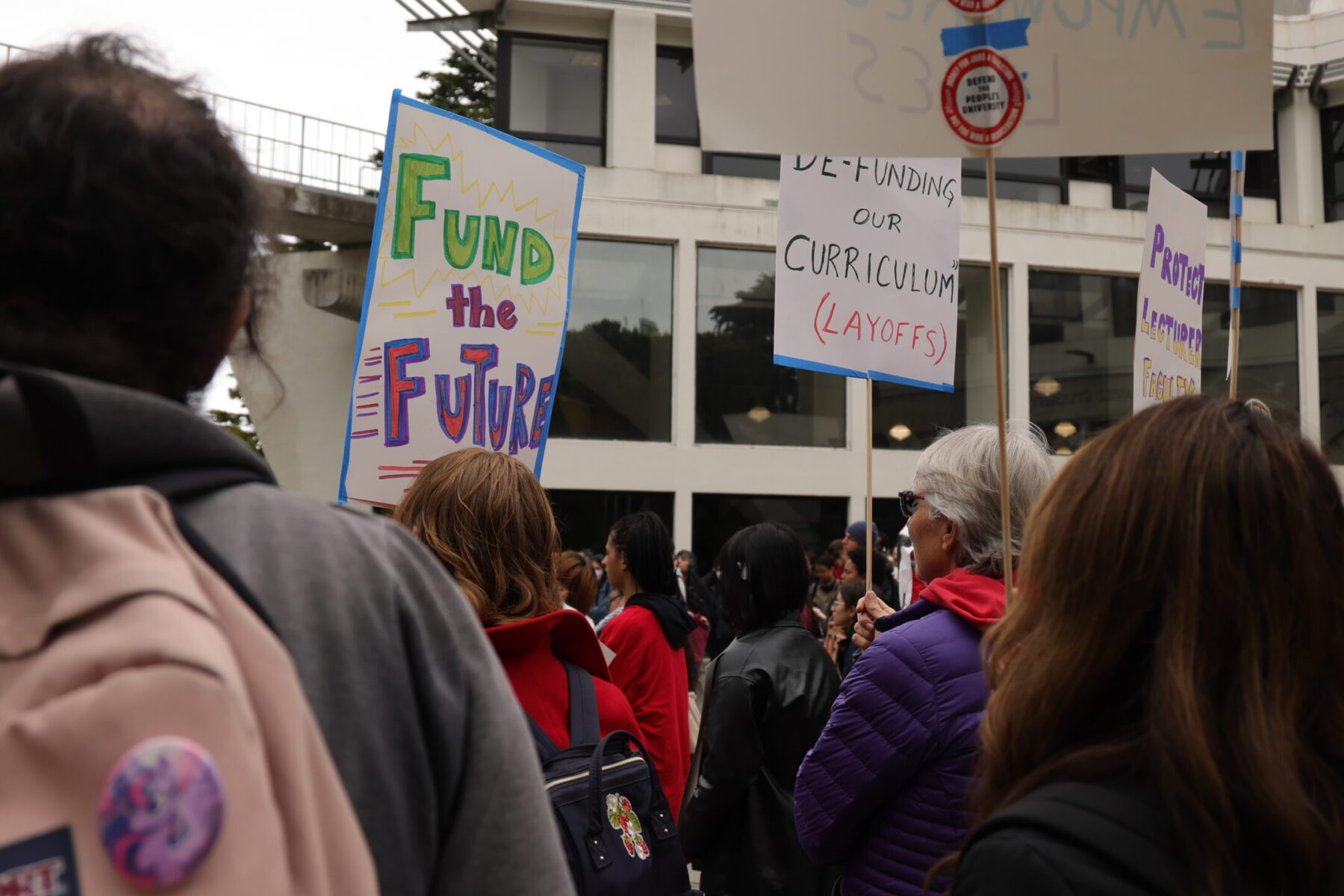
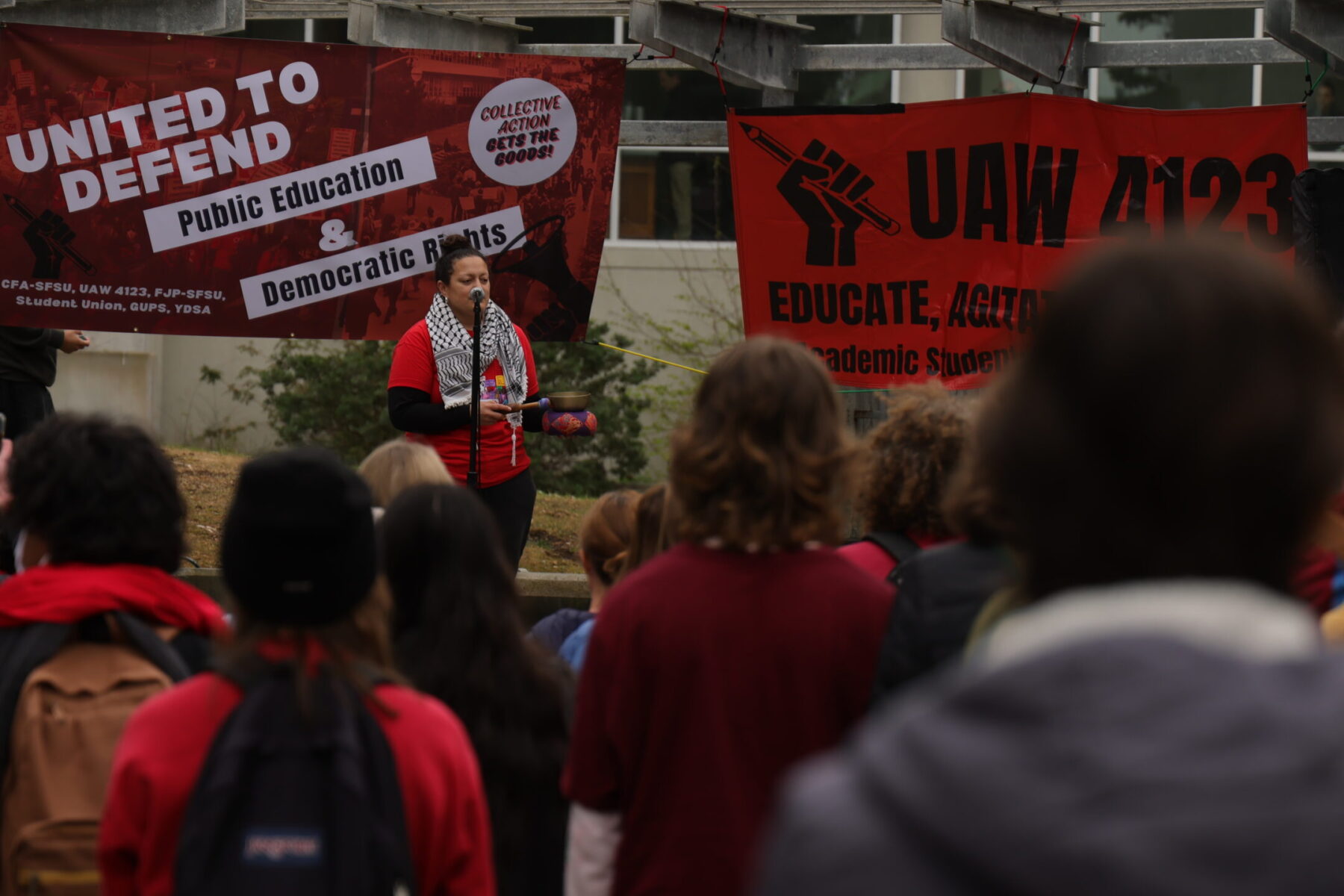
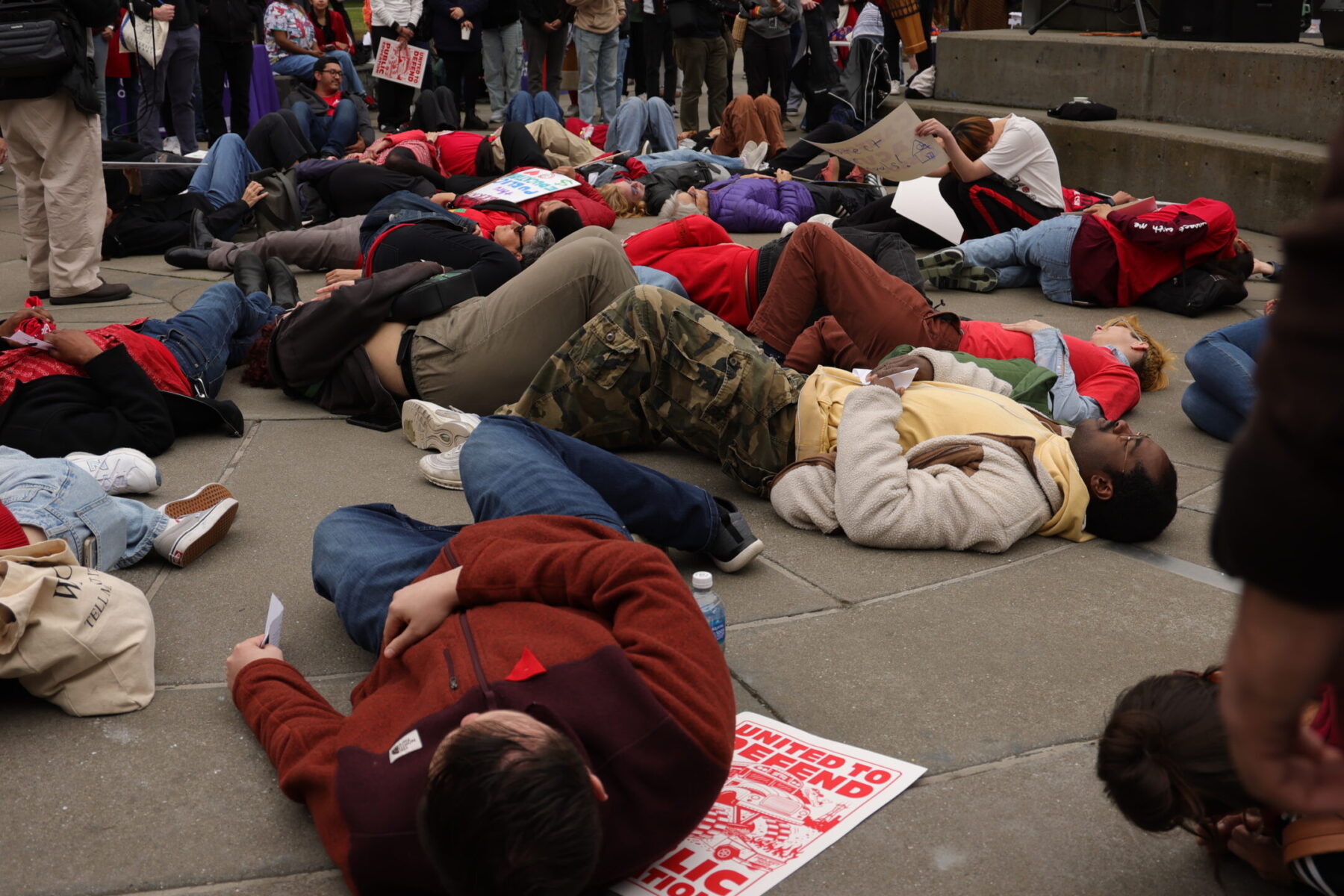
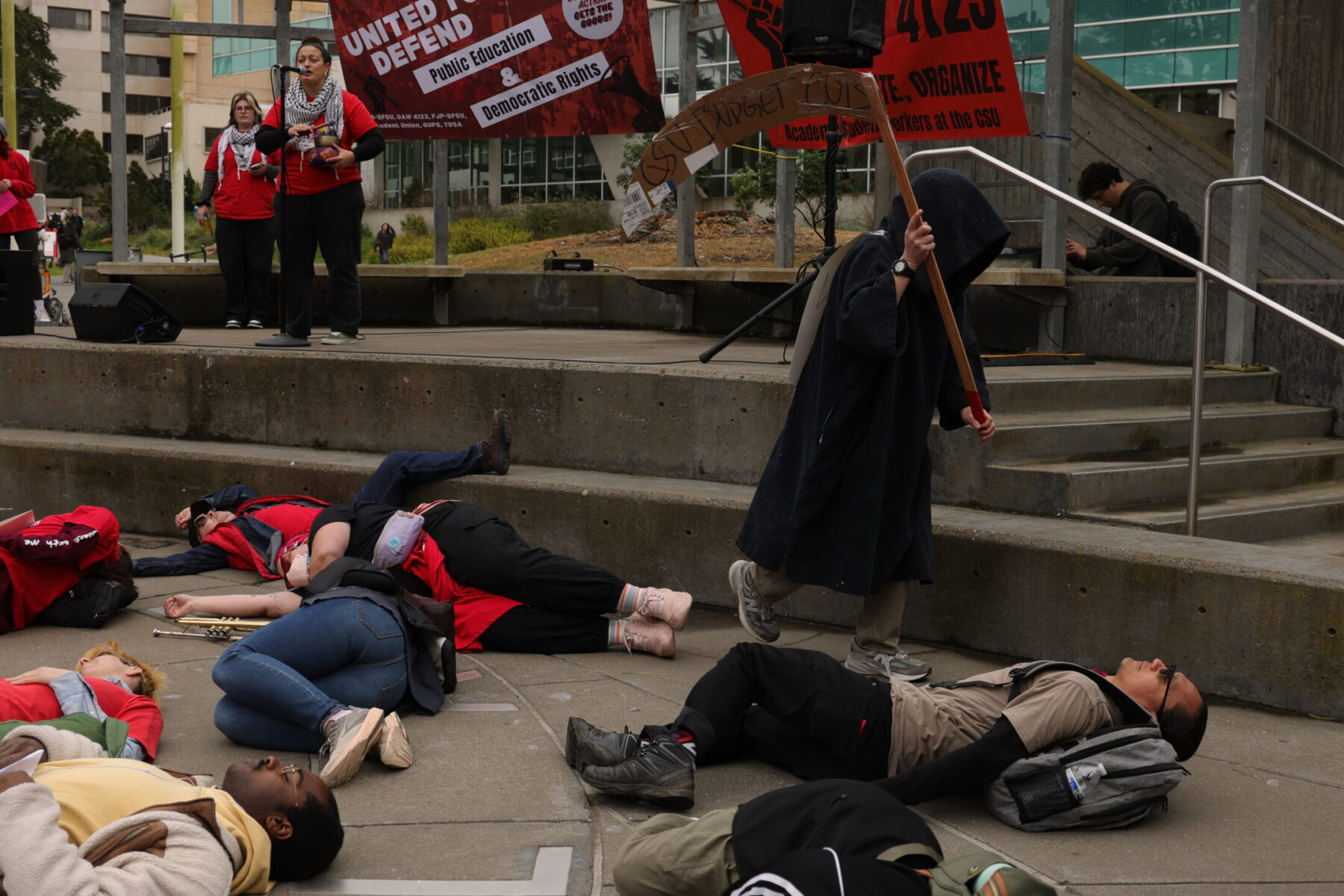
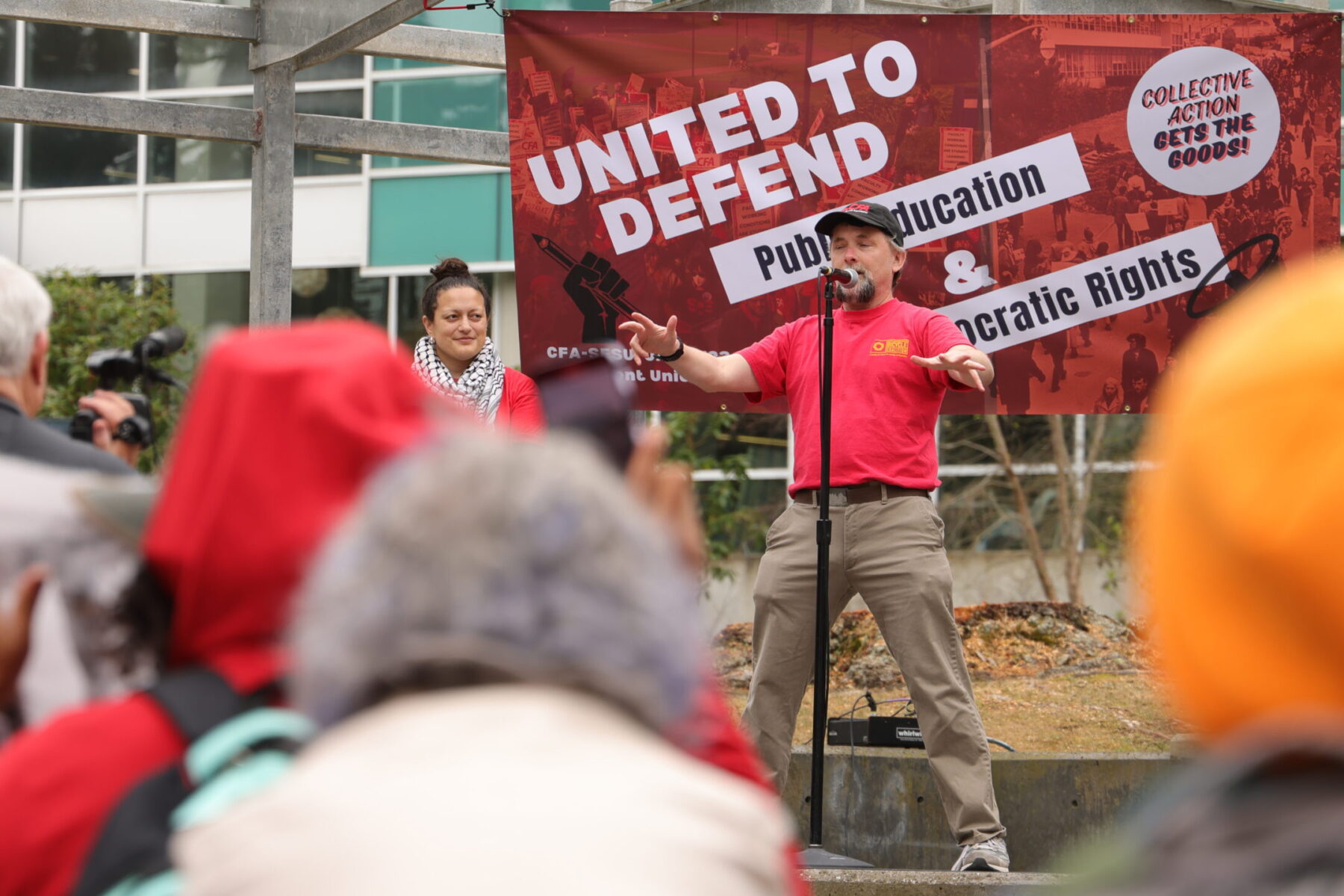
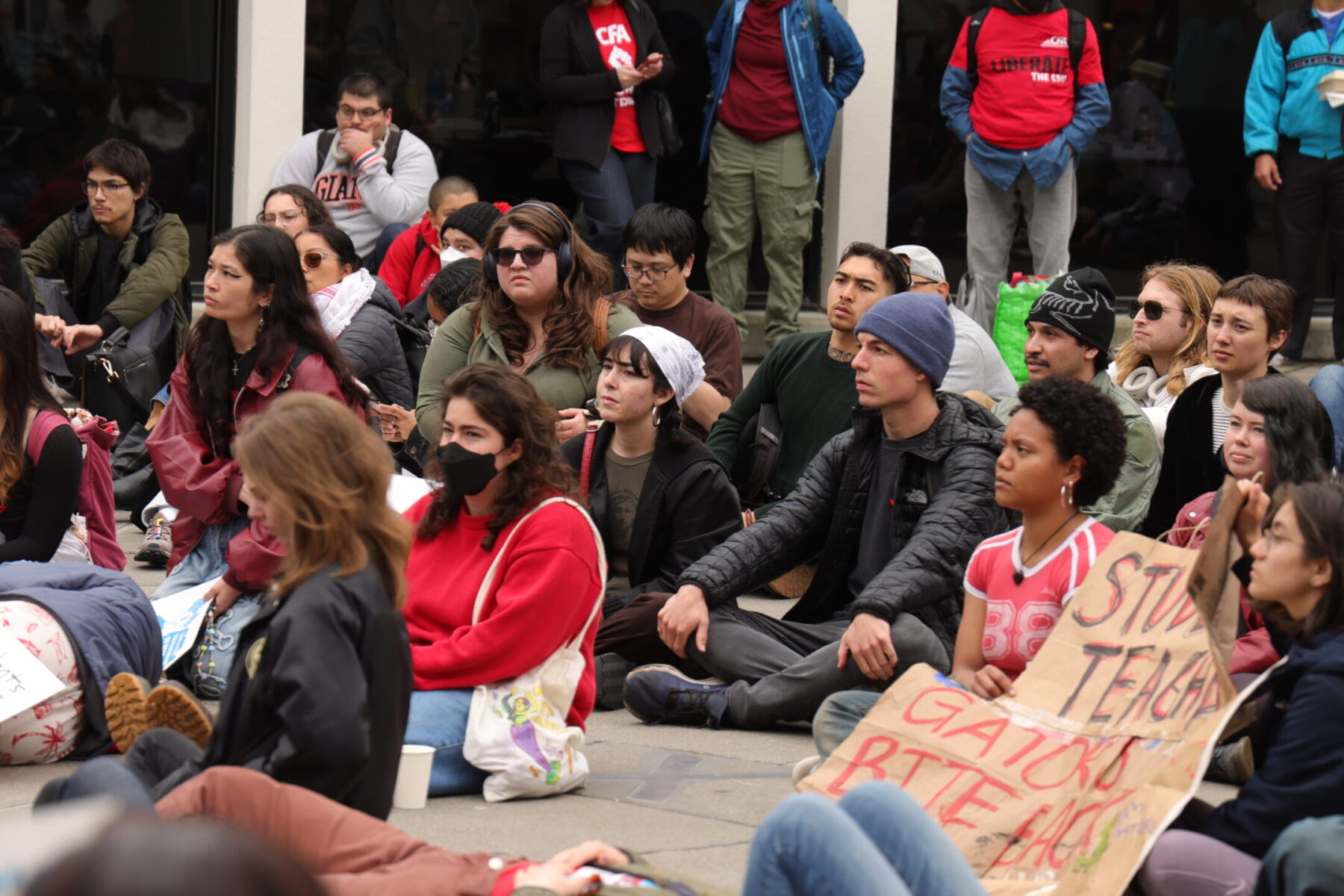
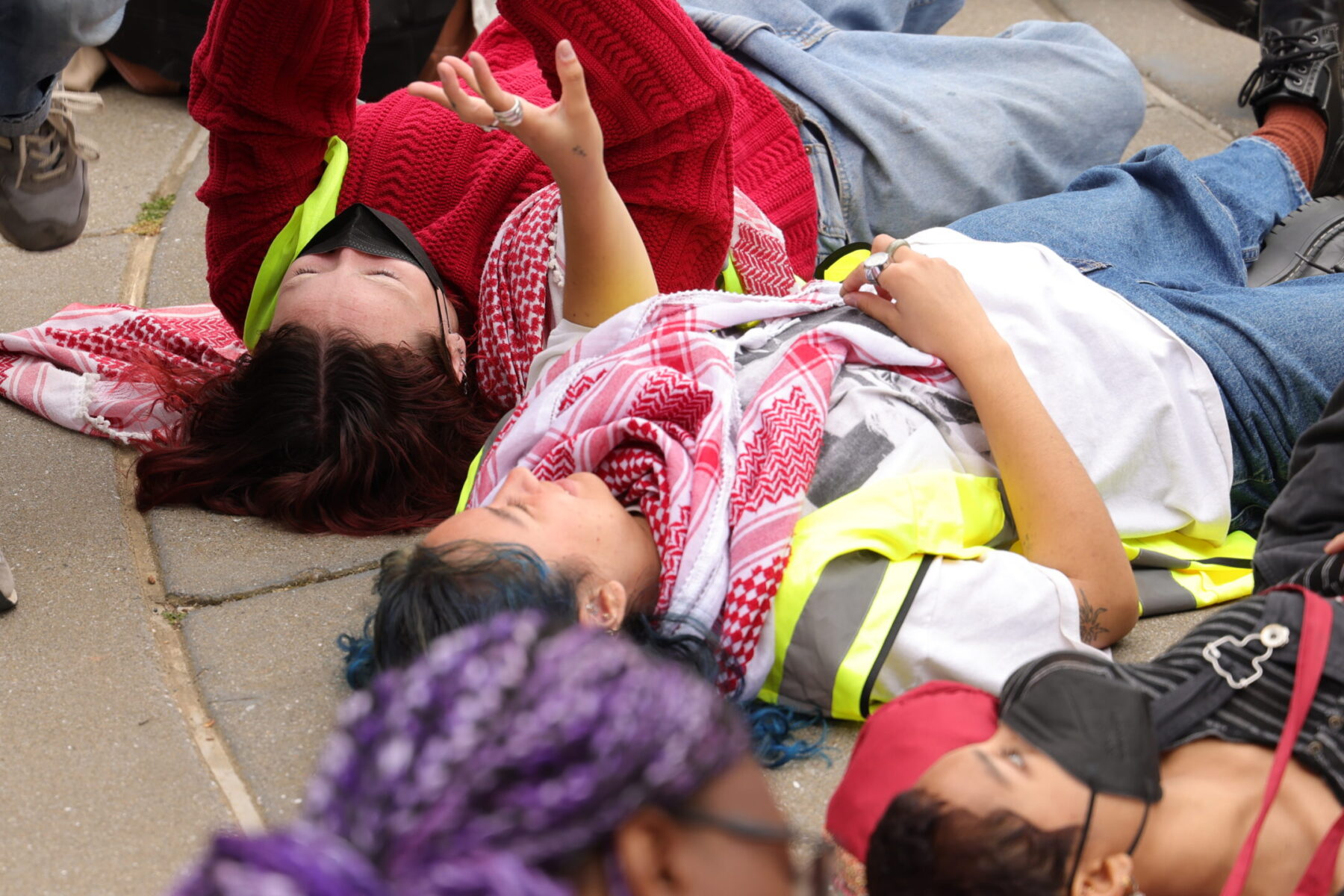
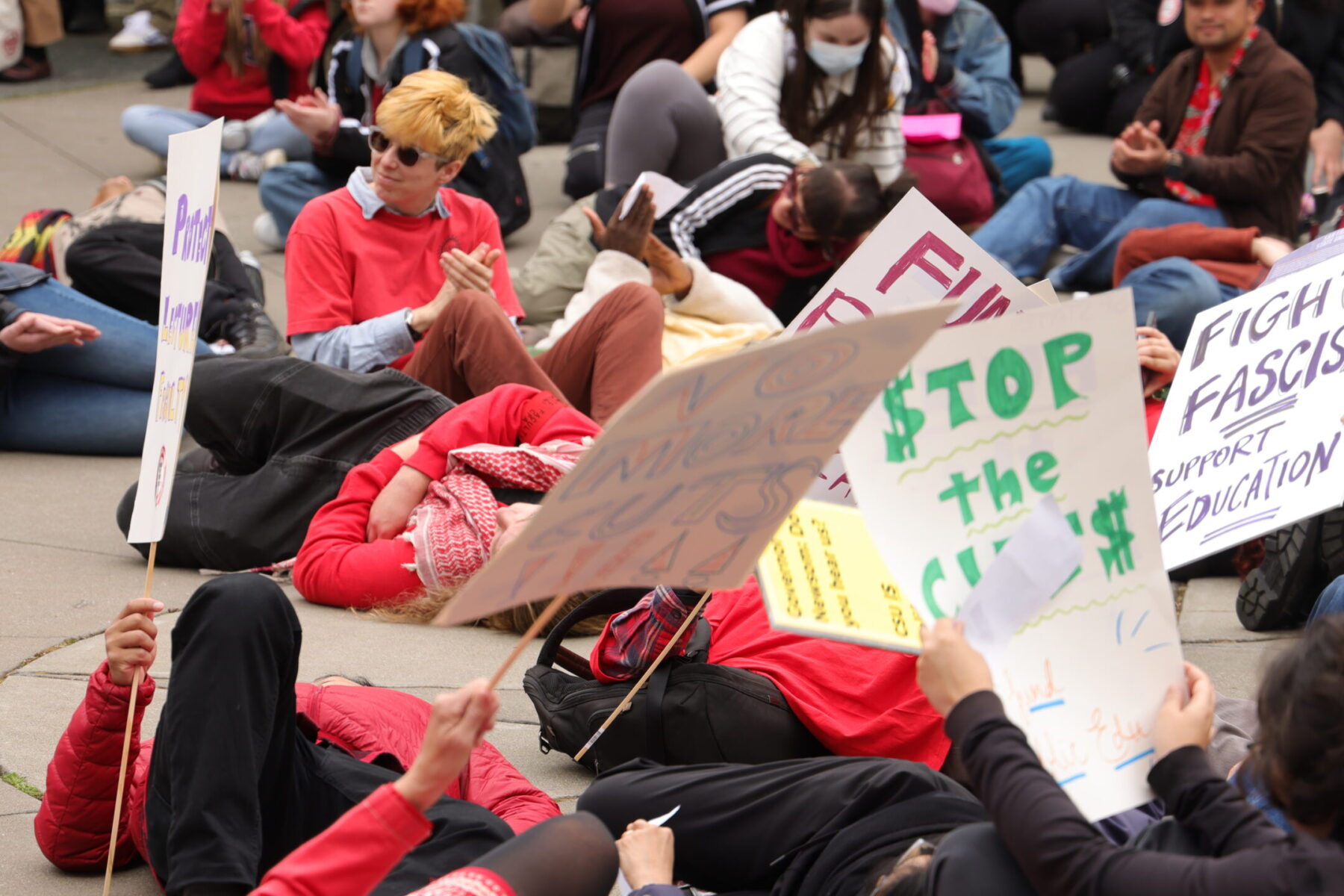

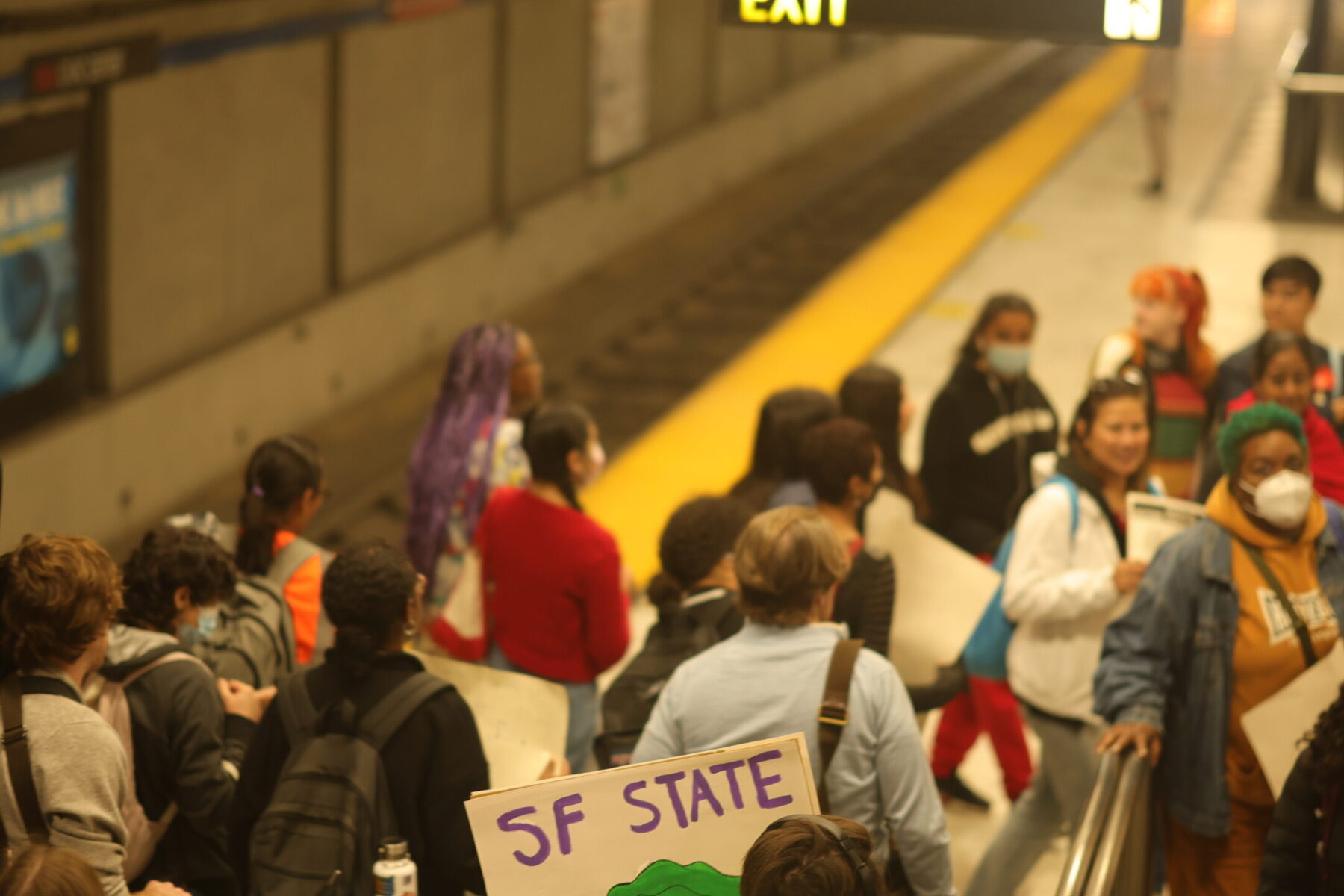
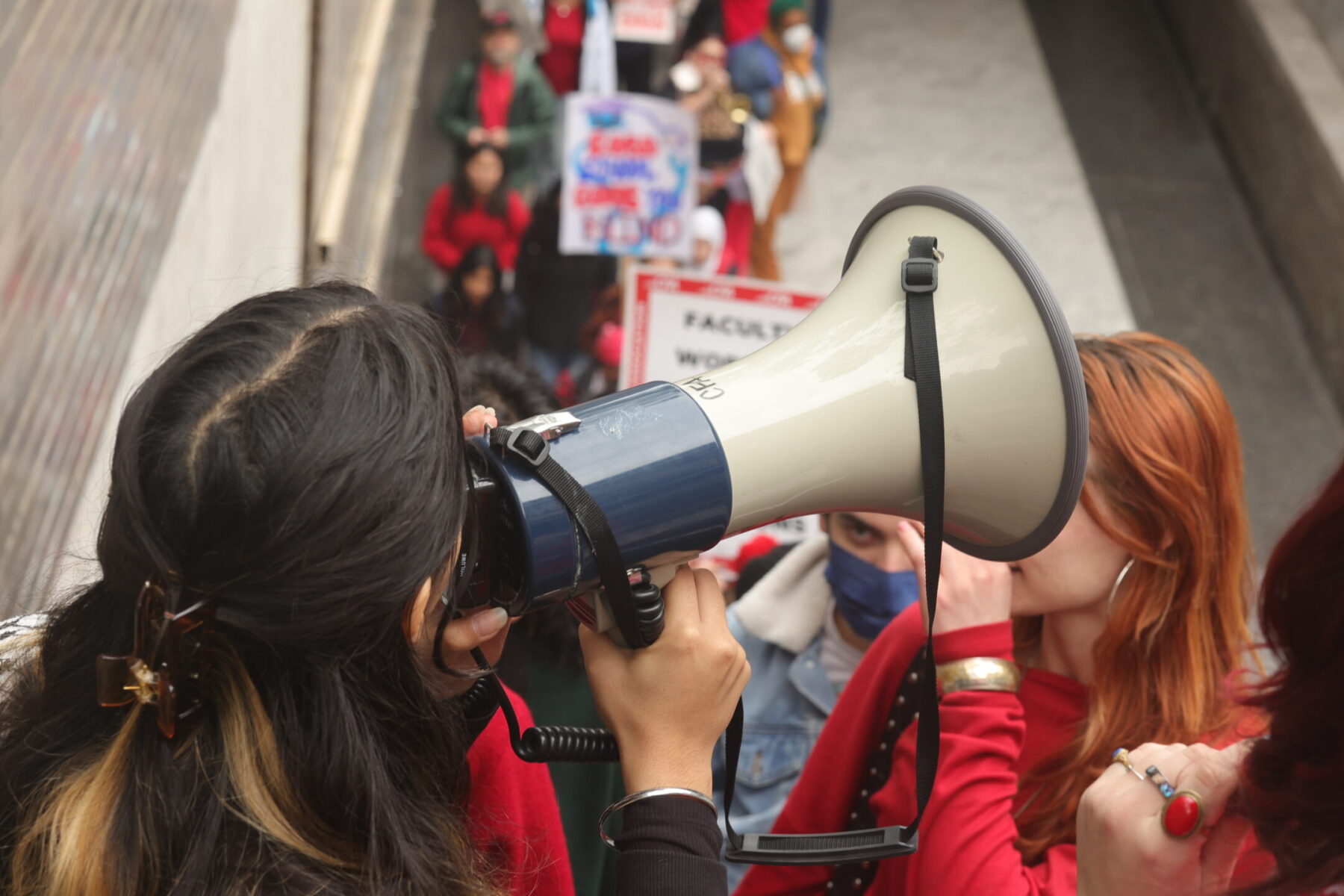
National Day of Action at SF Civic Center Plaza | April 2025
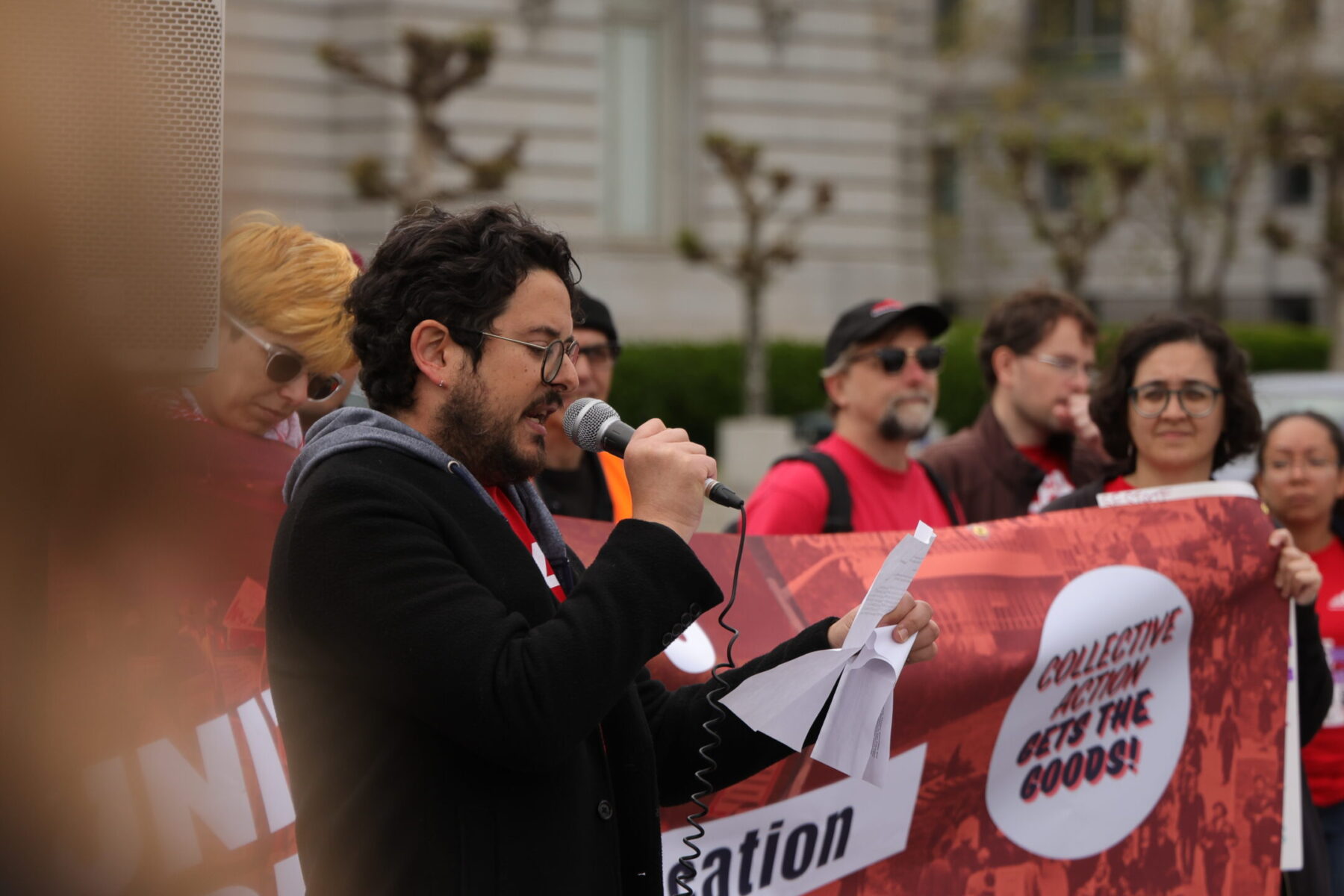
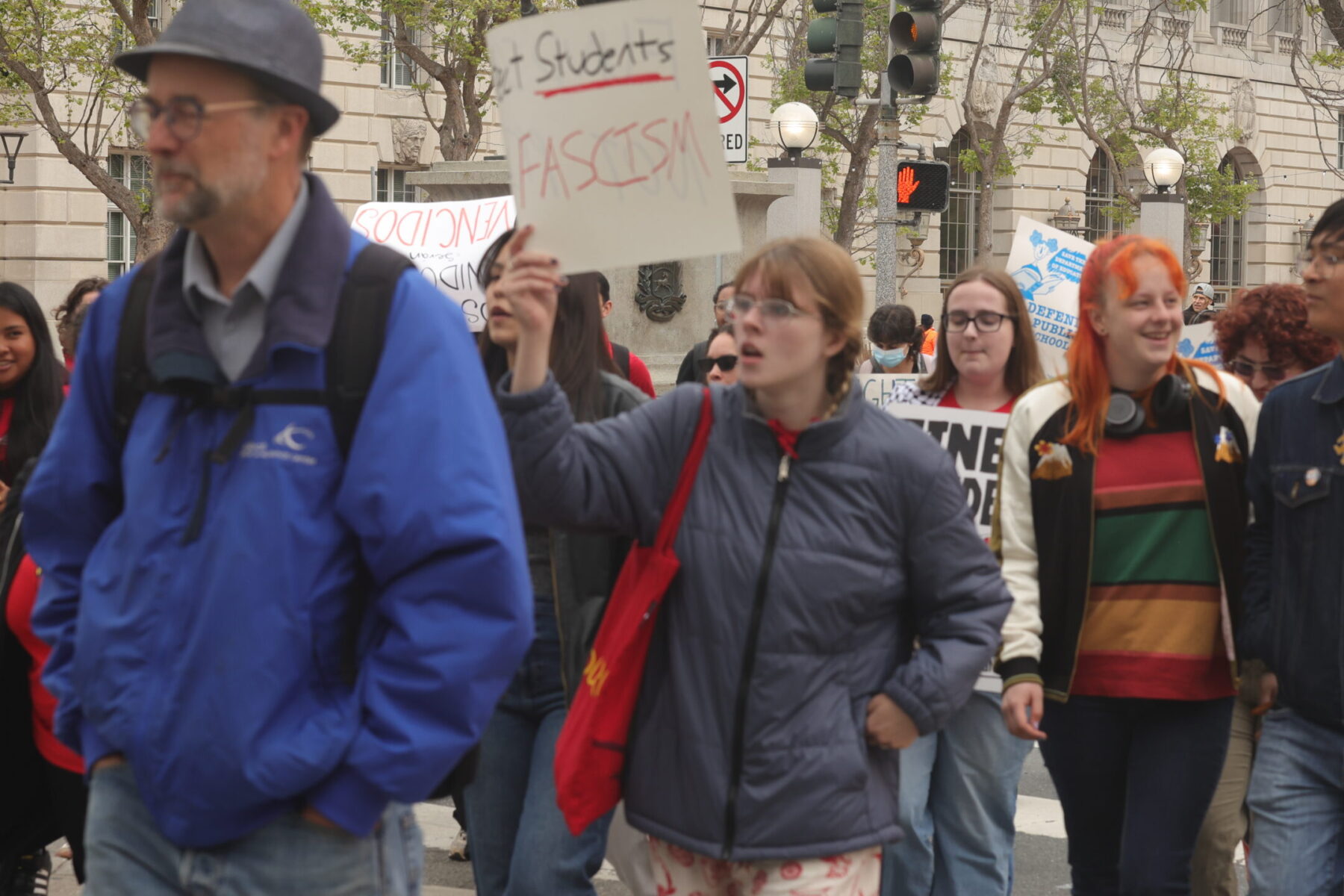
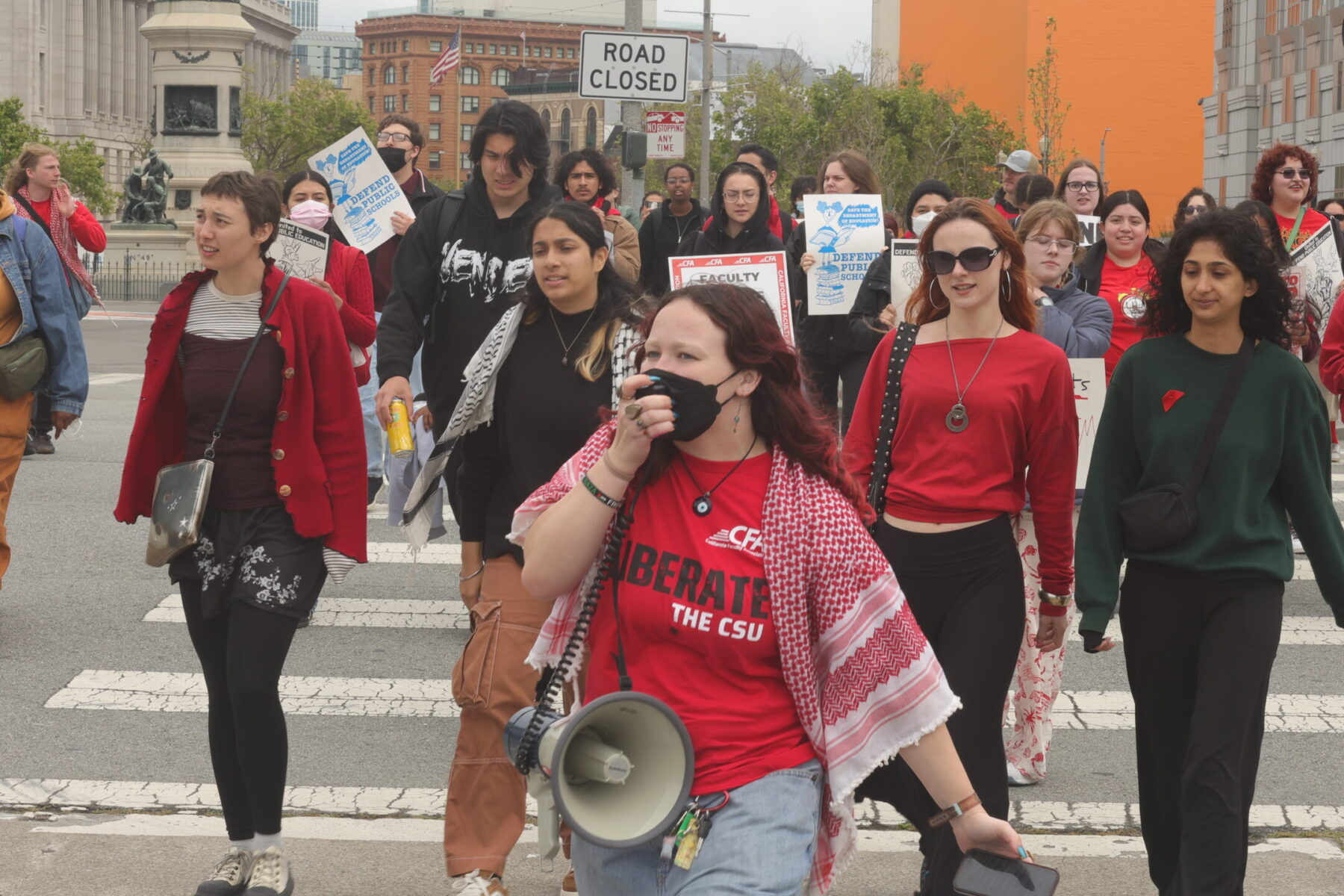
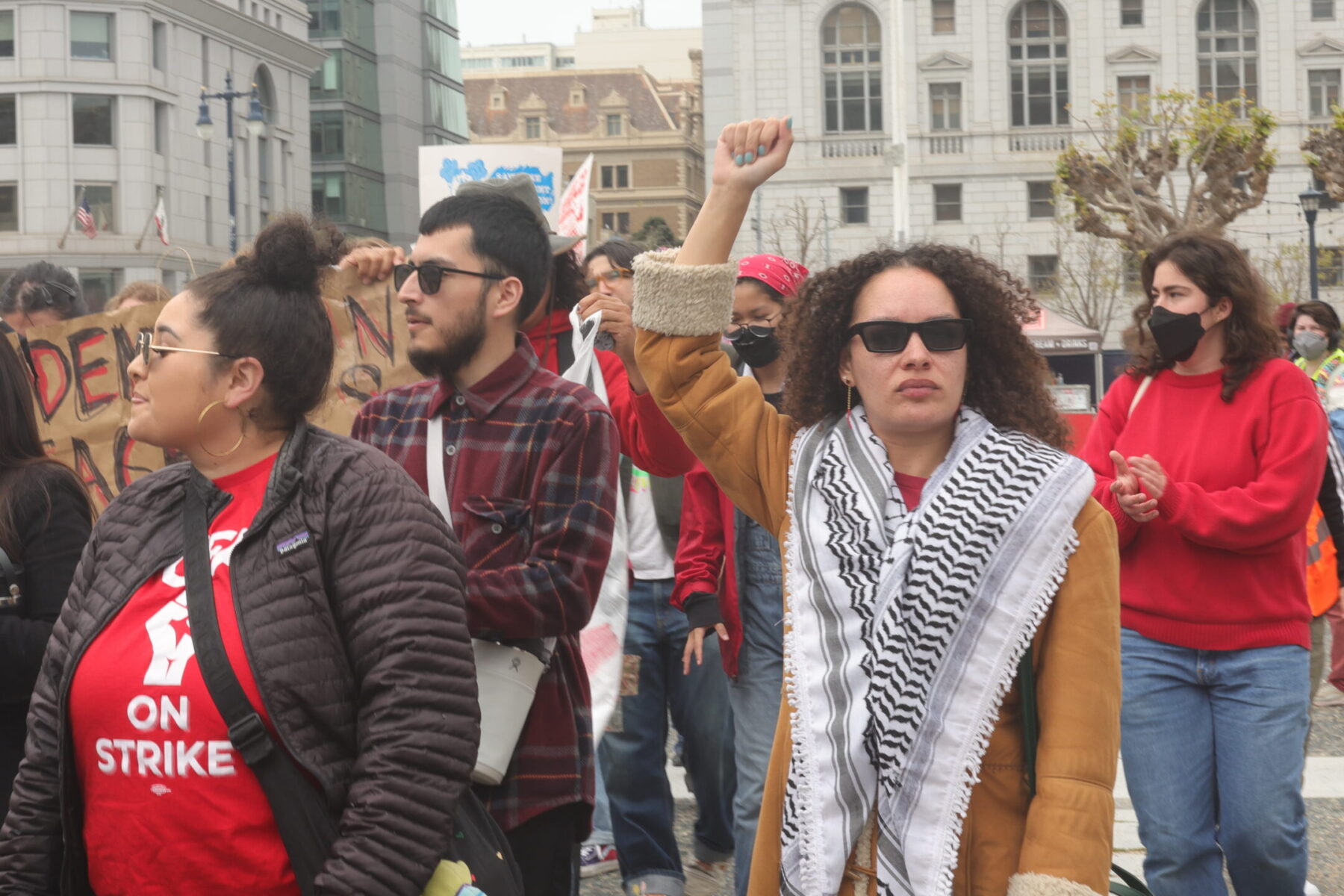
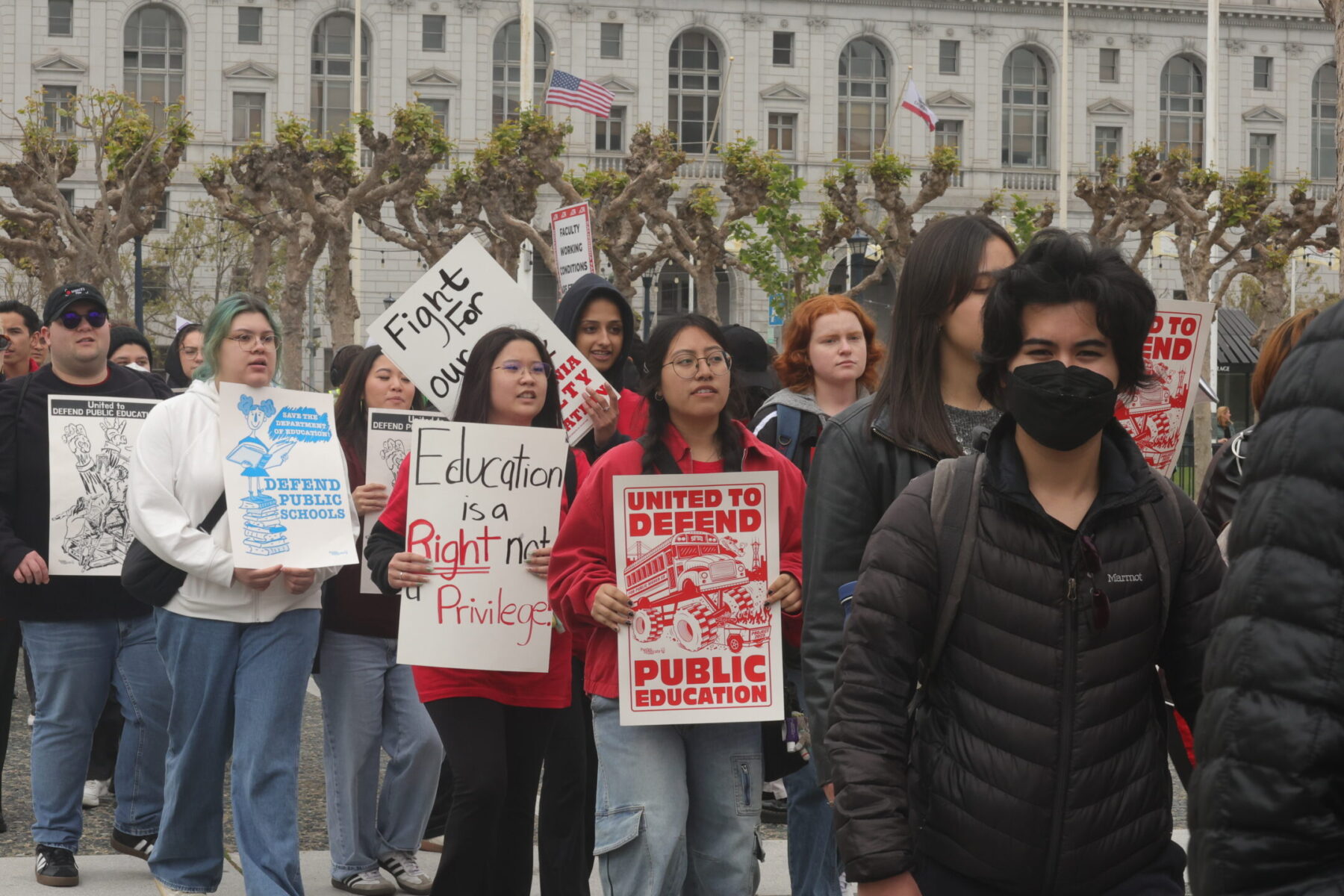
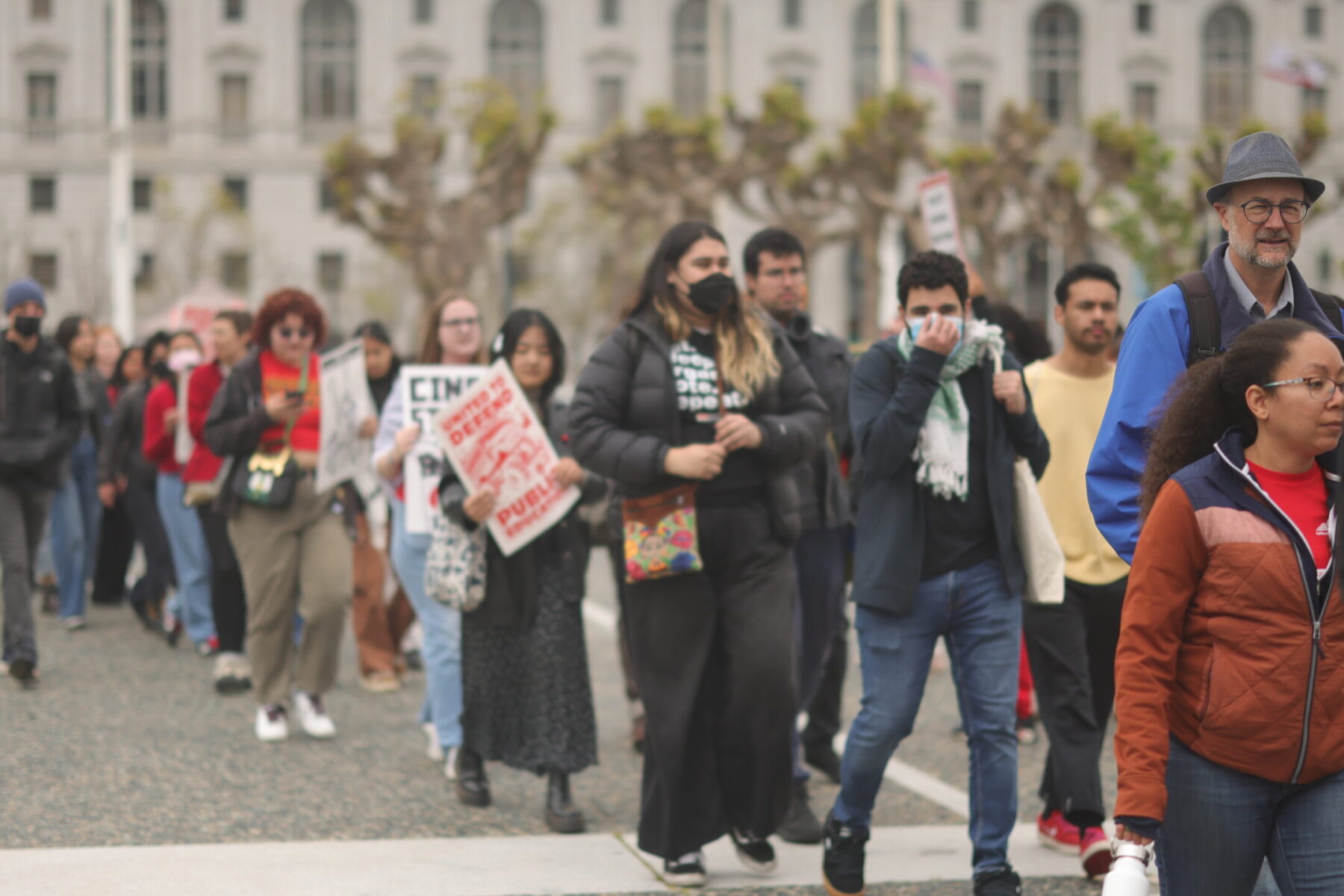
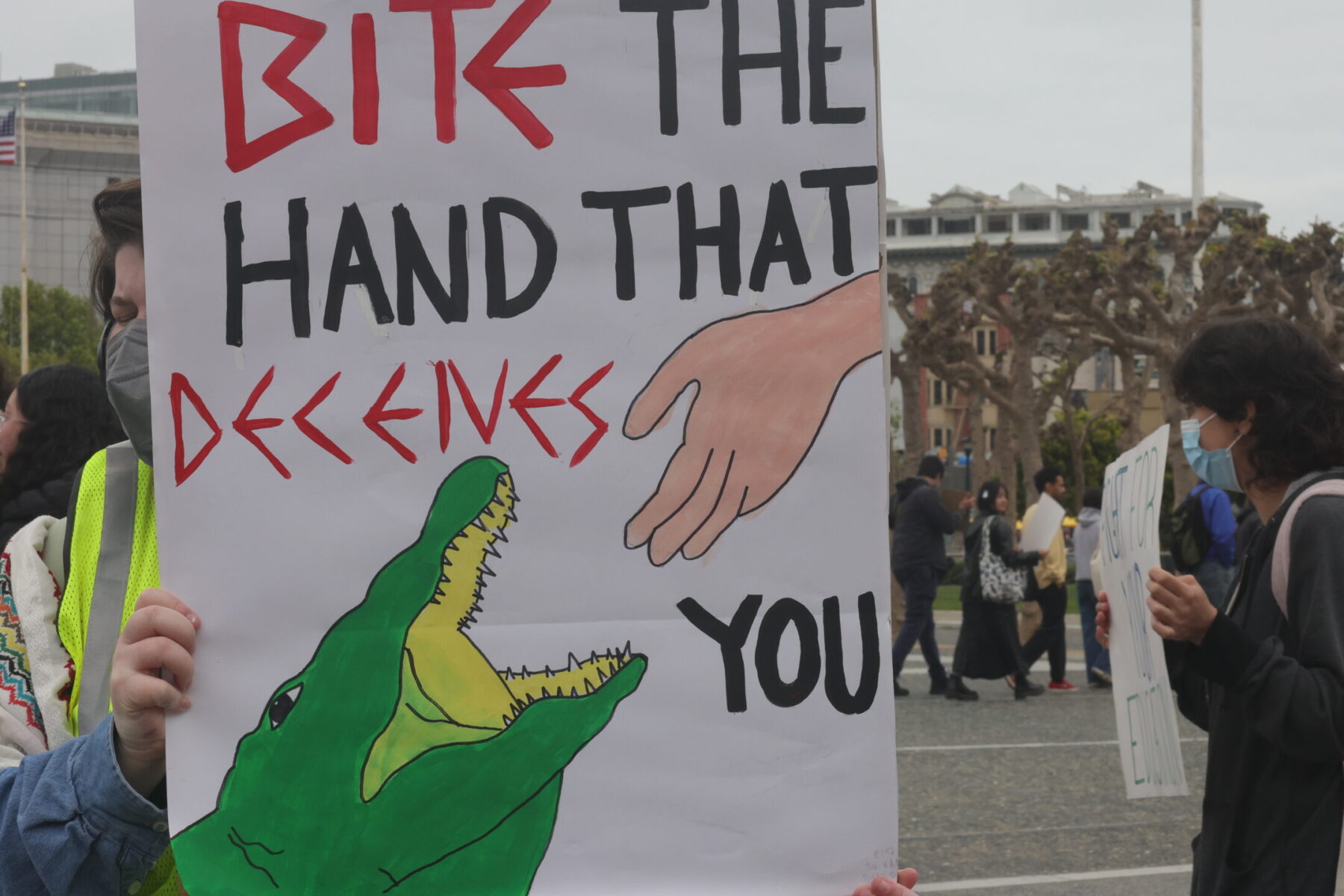


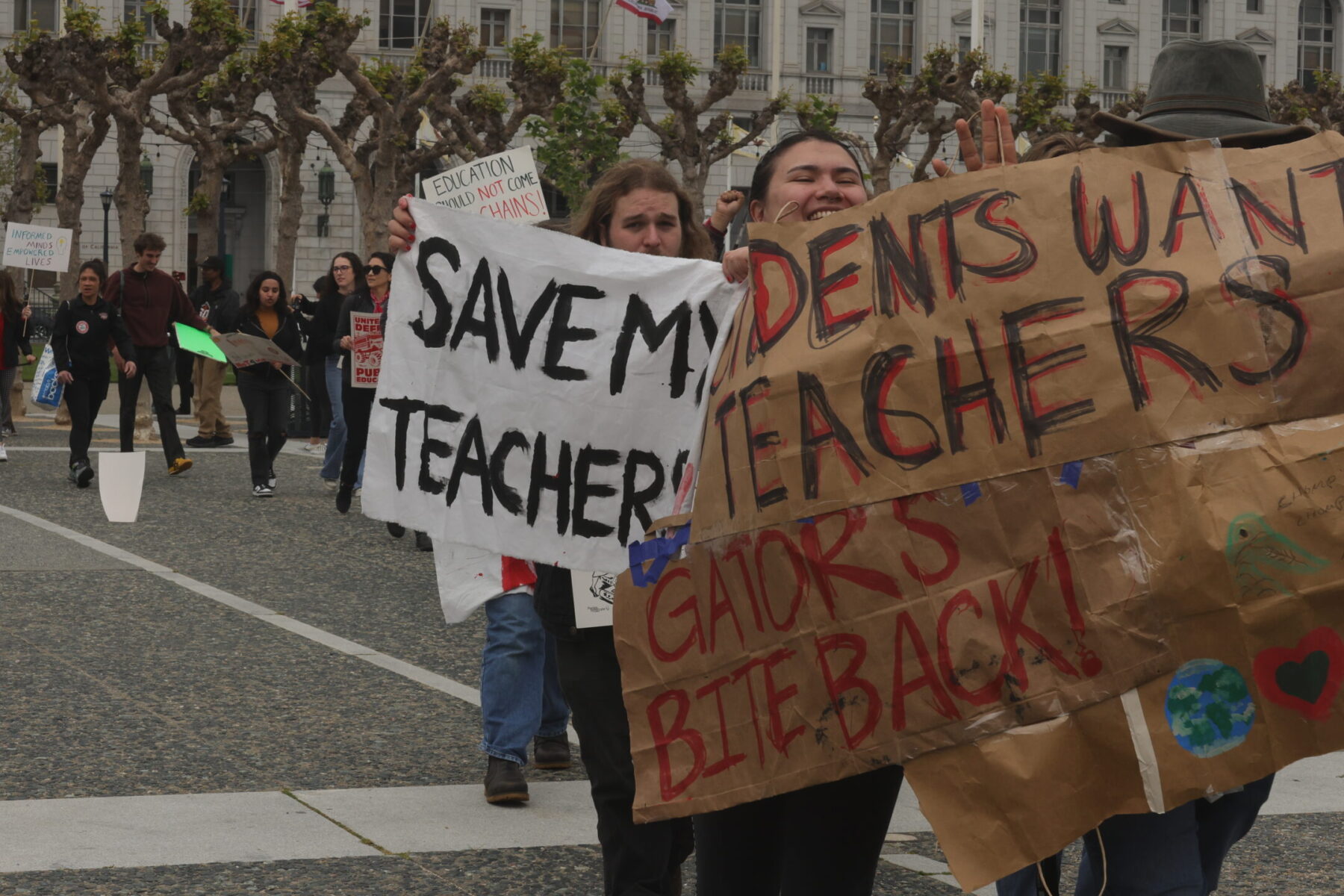
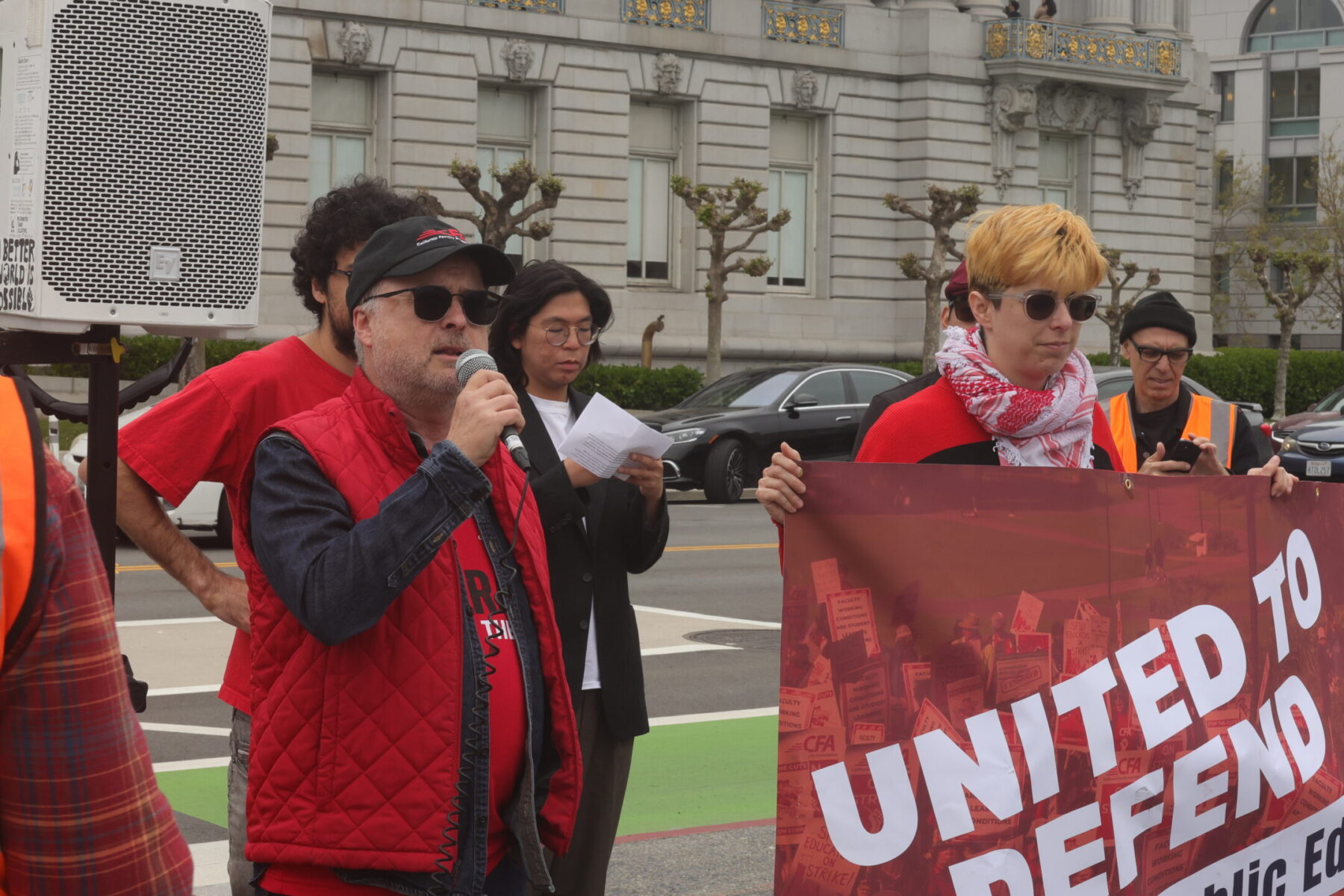
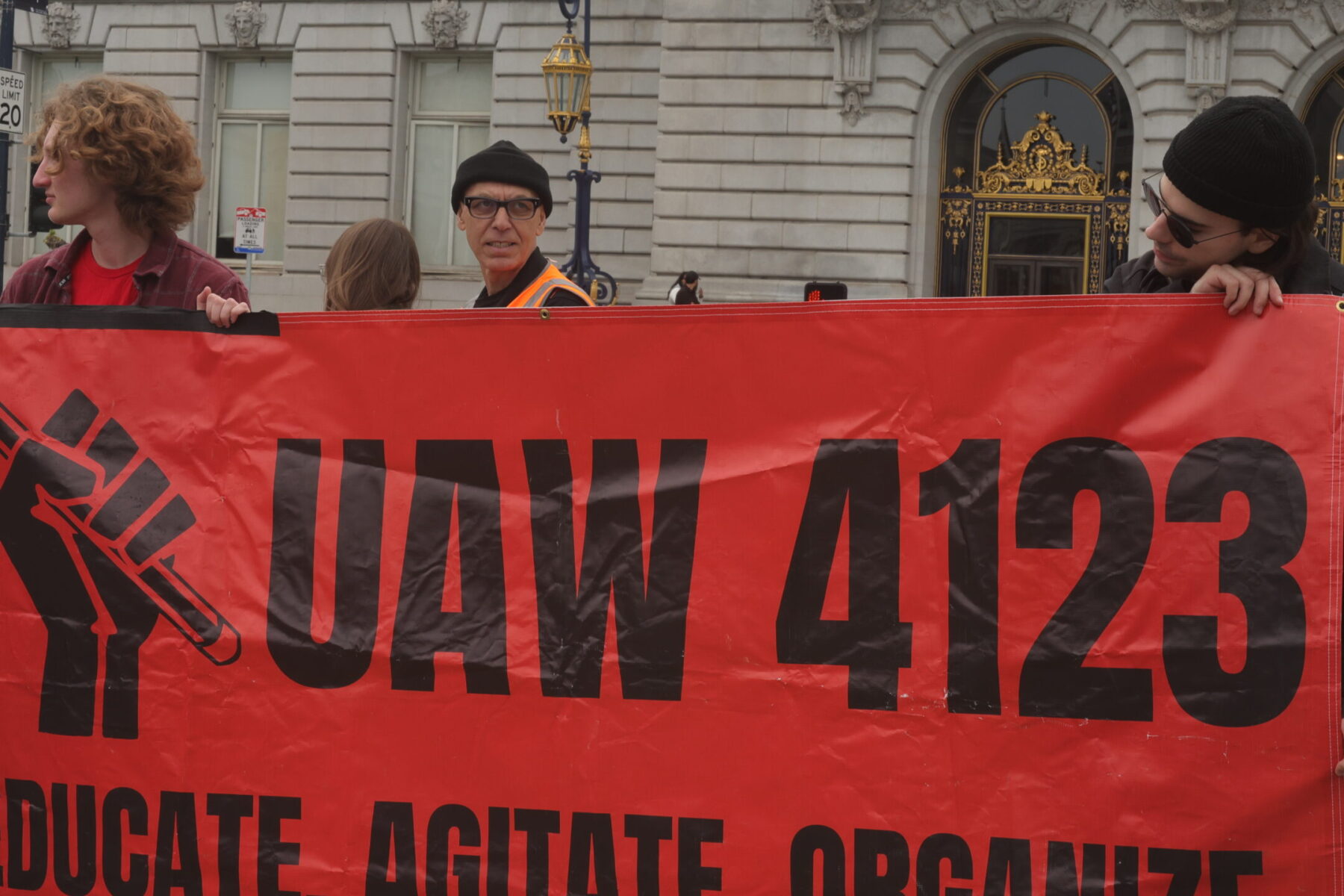
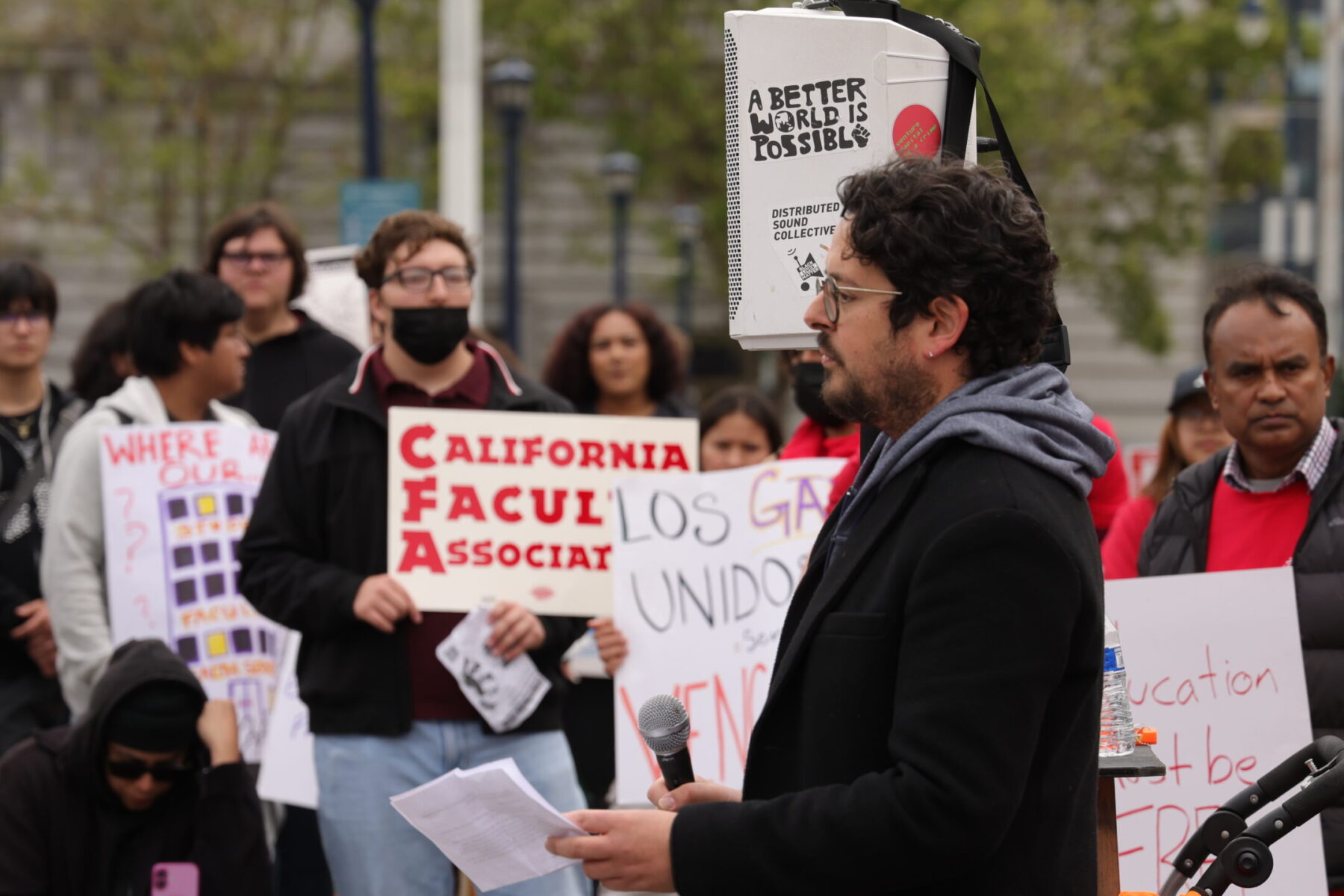
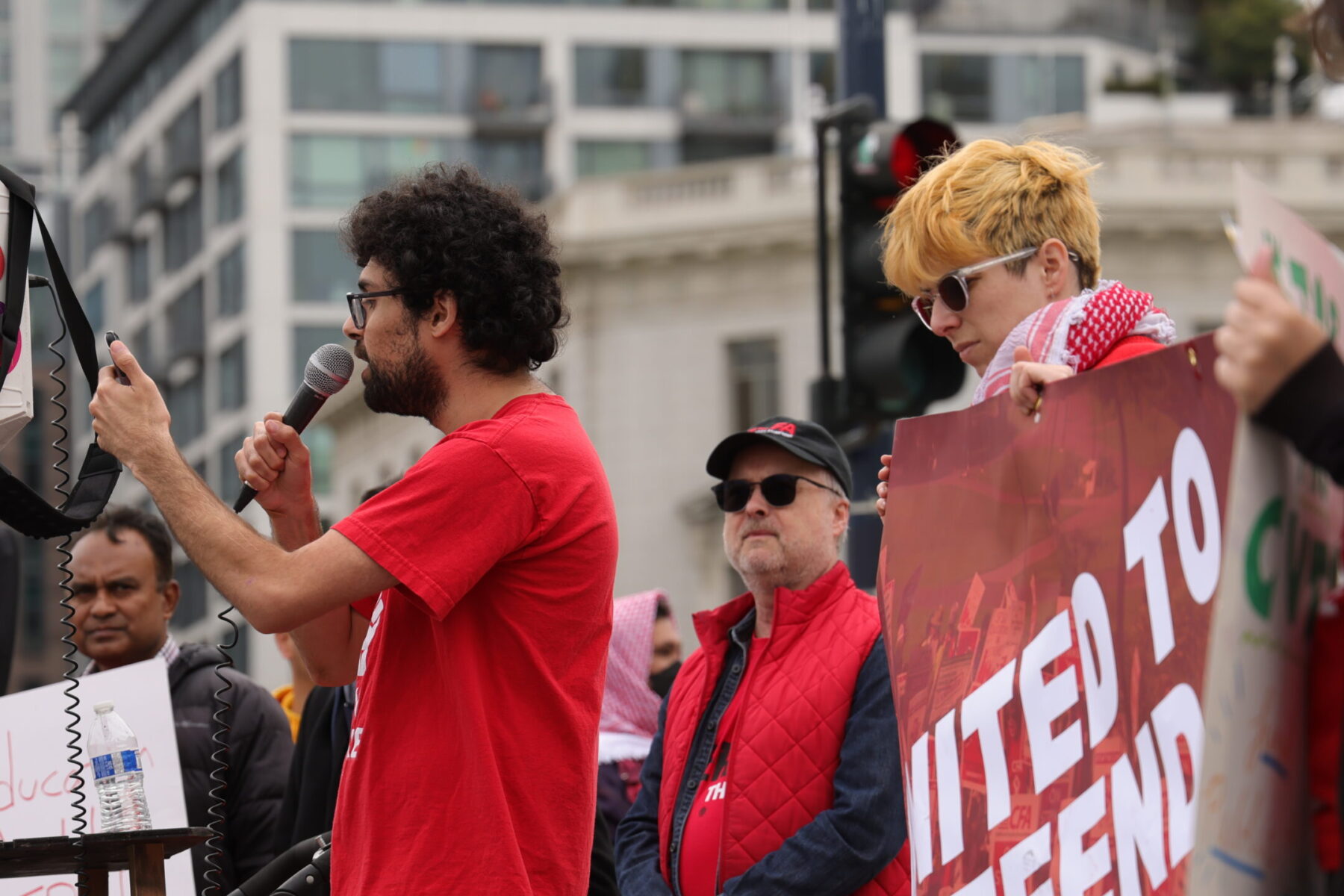
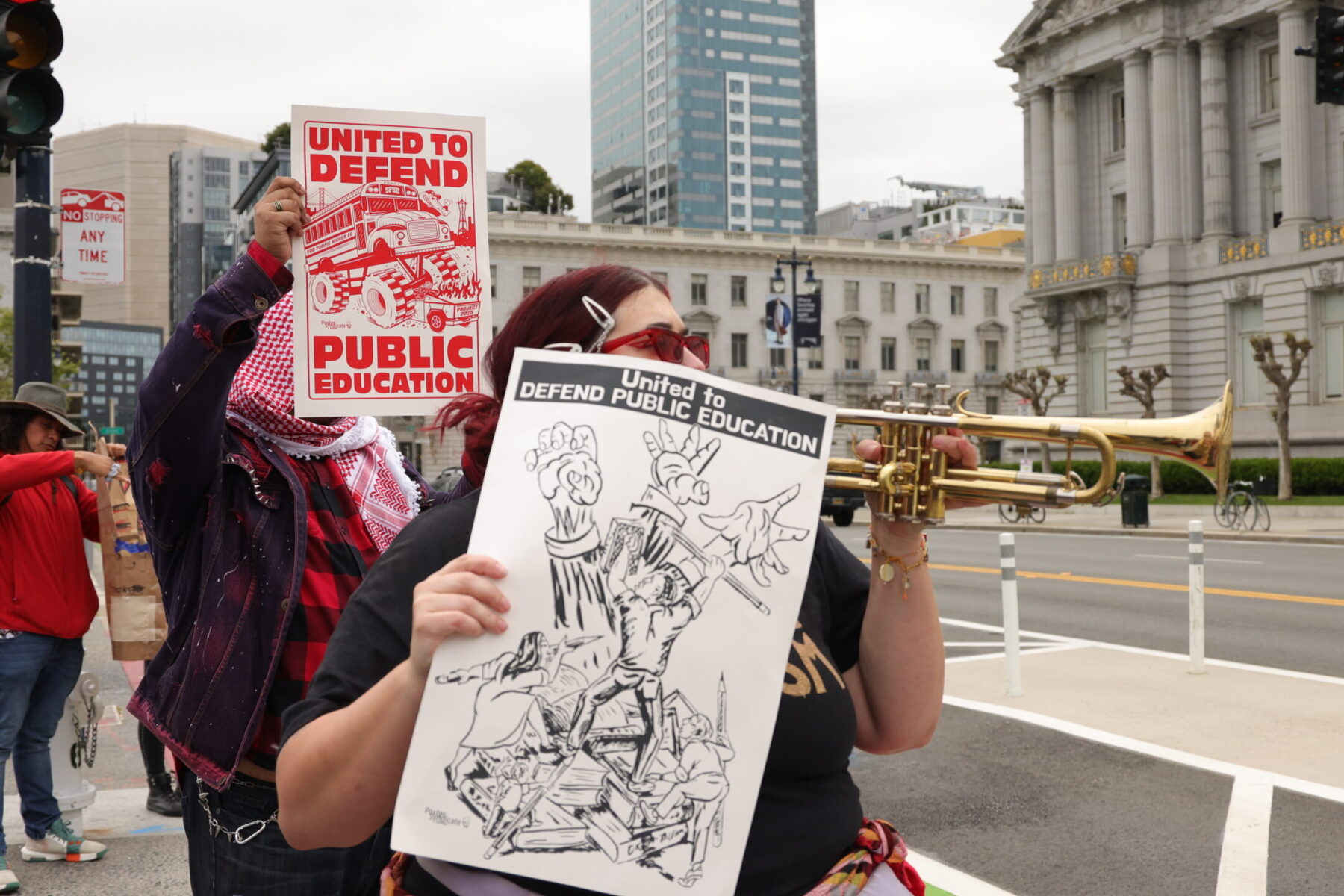
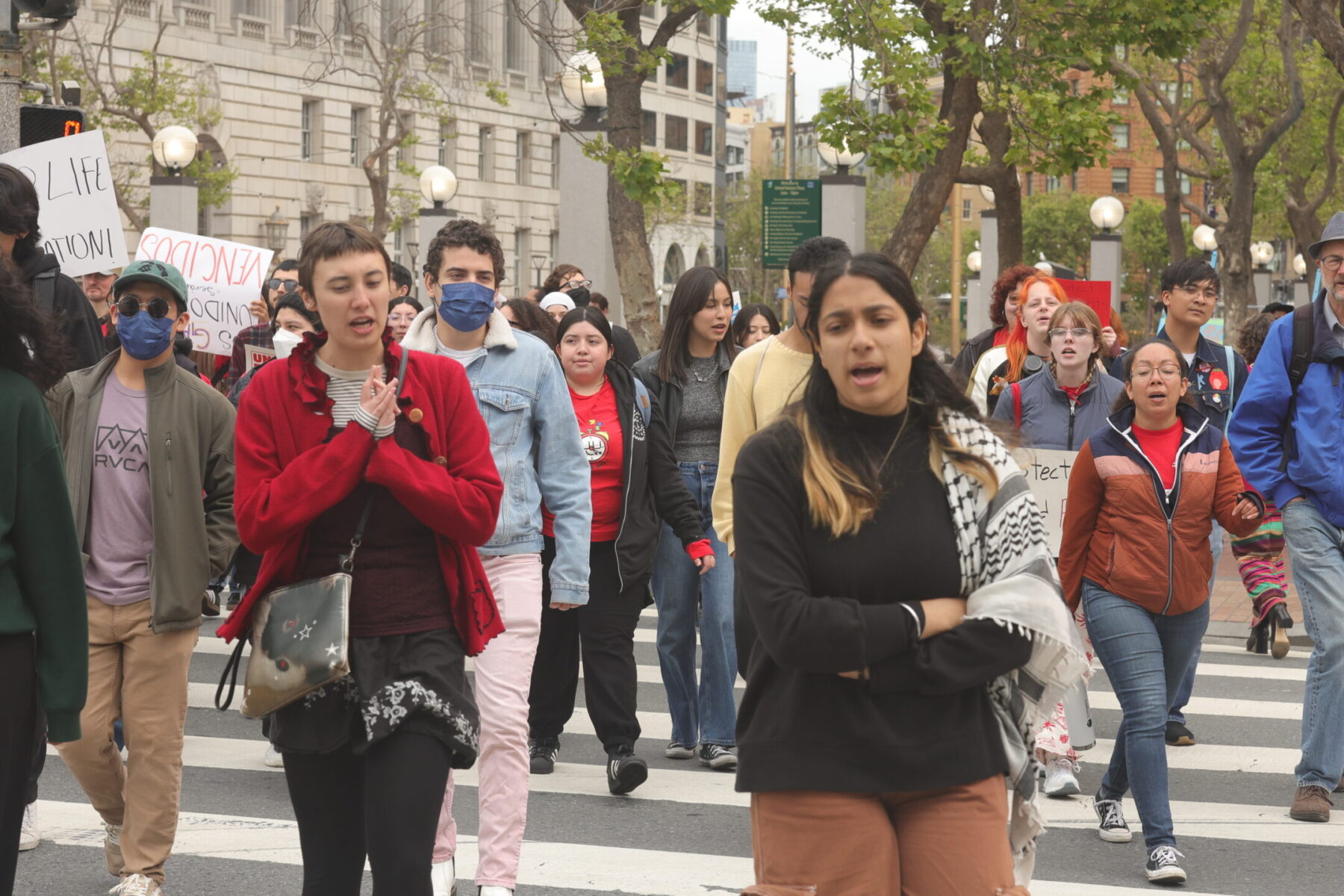
United to Defend Public Higher Education
Learn more about defending public higher education: HERE. Read, share, participate, and circulate this platform for United to Defend Public Higher Education with your colleagues, community, students, and department faculty.
LET’S KEEP THE MOMENTUM!
Energized and want to do more outreach? CONTACT YOUR STATE LEGISLATURE HERE.
Read all about the current ratified PLATFORM that was discussed, voted on, and organized from faculty, staff, students and community who attended the Feb. 22nd Organizing Conference.
Strike Ready PreparednessCFA-SFSU Strike Resources and Red Week Teach-Ins
Learn more information of the CFA Statewide Strike through the Red Week Teach-Ins, News Coverage, Press Releases, Open Letters in Support and more resources.
CFA Open Bargaining Committee Members at SFSU
Tendai Chitewere
bargaining team member
Brad Erickson
bargaining team member
More Information on Open Bargaining
Stay up to date with Bargaining Updates and join in on CFA Bargaining Article Committees by signing up and participating in on Article committee meetings.
Stay InformedStay Informed
Sign up for Headlines, weekly email updates on CFA news, bargaining updates, faculty rights, and contract news.
Collective Bargaining Agreement Resources
View the current CBA, Collective Bargaining Agreement here. You may also view the current CBA through the CFA website.
Posted August 14, 2023
As reported last week, contract bargaining between our union and CSU management has reached “impasse,” the first step toward a possible strike.
Because of potential impact to students, we encourage inclusion of the following paragraph in all syllabi:
The California Faculty Association (the labor union of Tenure/Tenure line Faculty, Lecturer Faculty, Coaches, Counselors, and Librarians across the 23 CSU campuses) is in a difficult contract dispute with California State University management. It is possible that we will call a strike or other work stoppage this semester. I promise to promptly inform you of any schedule disruption. Our working conditions are your learning conditions; we seek to protect both. For further information go to www.calfac.org.
Please talk to your students about this on the first day of class. We don’t yet know when we might strike or how long it might last. Last year we all took a large pay cut relative to inflation; management expects us to absorb this loss. In short, management has rejected our proposals for:
- A 12% General Salary Increase to recover from high inflation
- An increase in the minimum salary of our lowest paid faculty
- Expanded parental leave
- Workload improvements for Counselors and Lecturer Faculty
- Faculty health and safety enhancements
I’m sure you have many questions. You can find some answers here. I will share more about the process and what’s at stake this coming Friday.
In solidarity,
Brad Erickson
Chapter President
Useful Resources
Please view CFA SF’s October 2022 Range Elevation Workshop: HERE.
See the collected reported as done by Dr. Veronica Sovero and Elizabeth Kirschner.
Join California Faculty Association
Join thousands of instructional faculty, librarians, counselors, and coaches to protect academic freedom, faculty rights, safe workplaces, higher education, student learning, and fight for racial and social justice.
